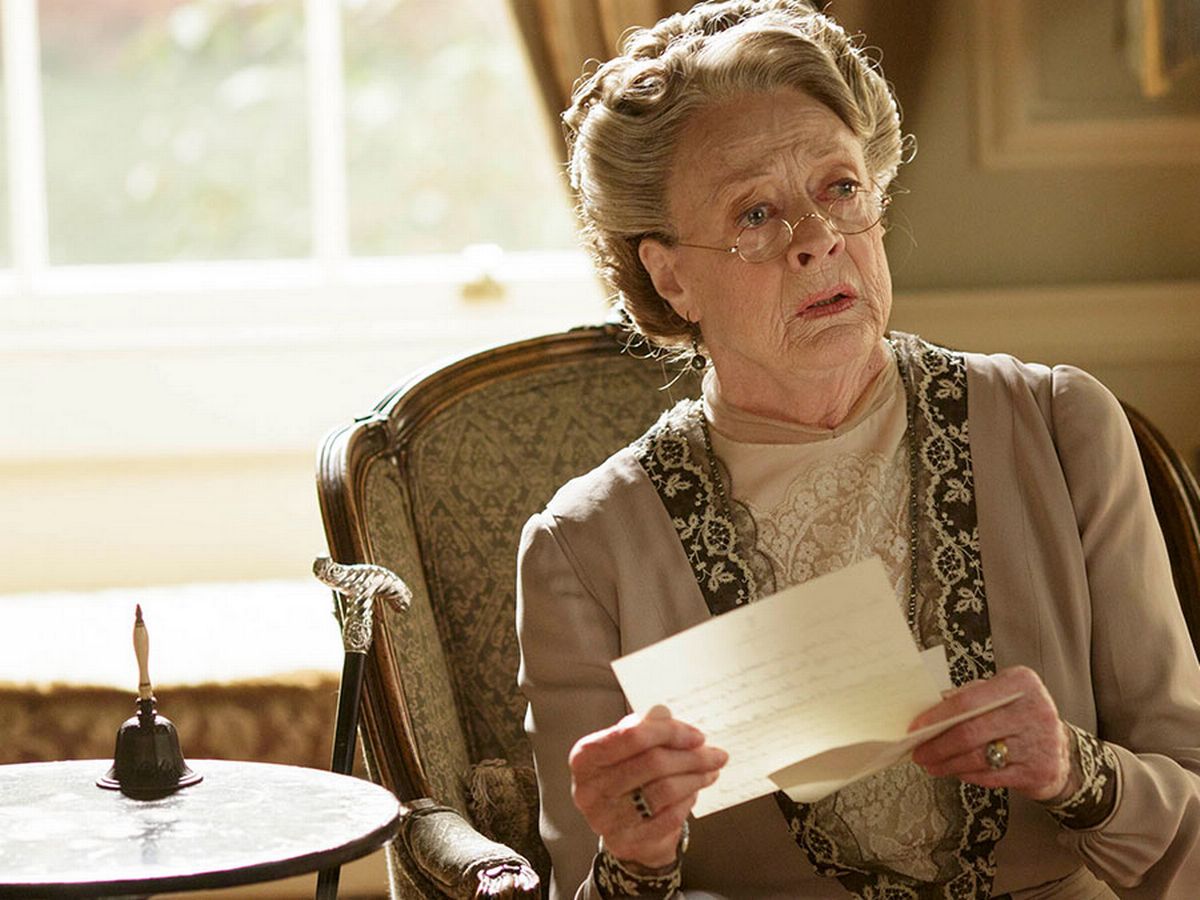
Never watch the sequel, they say. Never was this more true than with Gladiator II, sequel to the well-received original Gladiator, some 24 years ago.
What's wrong with this film? Practically everything actually: the plot, the characters, the acting, the dialogue. Where should we begin?
Perhaps the biggest problem is the plot: too bare, too ponderous and too slow to carry this epic two-and-a-half hour film to its conclusion. (It feels longer.)
A rebel chieftain is taken prisoner by the Romans in a North African campaign. The prisoner is called Hanno, and he is the central character. (He is however white, despite the North African location.)
He gets carted off to gladiator school (cue reminiscences of the same scene in Spartacus, only without Peter Ustinov). Our man turns out to be pretty handy with the sword, and pretty soon he becomes the star fighter for Macrinus, played by Denzel Washington. (In Rome your ethnicity mattered a lot less than it does today.)
It isn't long before Hanno is the star of the Colosseum, leading his men in ever more violent butchery, displayed in disconcerting detail by film-maker Ridley Scott.
All this cutting, thrusting, stabbing and killing is merely scene-setting. The central plot-turn is that Hanno isn't really just any old prisoner of war from some campaign in North Africa. Oh no. He's really the son of Maximus Decimus Meridius, played of course by Russell Crowe in the original 'Gladiator'.
It takes a while for all this to become clear, but you somehow suspected it: the Roman of noble birth is forced to fight for his life in the arena, just like his father before him.
And of course you know he won't be killed; he'll somehow make it out of there alive. He'll pay tribute to his late father by wearing his armour, and visiting the shrine to Maximus, for Rome will be his.
Except it won't be, or not exactly. But Hanno – sorry Lucius – will get even. He will deal with the idiots who did him wrong, including his gladiator instructor, and eventually Macrinus.
We'll have angry scenes with his mother Lucilla, who sent him away, before she too meets an untimely death; and in all this hacking, chopping and general butchery, you yearn for a better plot.
No film is devoid of all positives and there are some almost enjoyable aspects: there are the pantomime clowns, joint emperors of Rome Geta and Caracalla, who are suitably louche and defrayed; there is a half-decent performance from Connie Nielsen as Lucilla, before her luck finally runs out.
But there are still too many things wrong with this film. The central part of Hanno (Lucius) is played by Paul Mescal. But Paul Mescal is no Russell Crowe, who dominated the first 'Gladiator' in a way that he simply doesn't.
This casting mistake was a profound error, because you find yourself constantly remembering how much better Russell Crowe actually was.
Also Paul Mescal has been called the Irish Brando, but his Gaelic burr feels wrong in the heat of Rome. It feels as though Mescal was filling in for someone else who wasn't available, and Mescal carried on instead.
And so you eventually emerge from this marathon of stabbing, chopping and hacking. You will have watched extras in the Colosseum who seemed a little bit bored with it all; and CGI baboons who didn't quite look realistic enough, and an unsatisfying ending.
Yet again you get the impression that Ridley Scott's best work is behind him. This film isn't as awful as his previous offering 'Napoleon', but it is still a long way behind his best work, including the original 'Gladiator'.
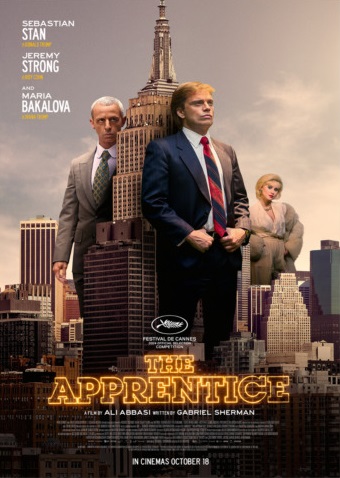
This film is a workmanlike depiction of the life of Donald Trump, but it could have been so much more. It feels too short, too superficial and too abbreviated, and somehow doesn't quite get to the essence of this astonishing man.
It presents Trump as a young, impressionable entrant into the world of business, who comes under the tutelage of Roy Cohn, a Rottweiler New York attorney. Roy Cohn had a number of rules that he passes on to the young Trump, including 'Attack, attack, attack,' and 'Never admit defeat'. With a mentor like this, it's no wonder Donald Trump turned out the way he did.
This film ascribes astonishing behaviour to Roy Cohn, including blackmailing senior New York City councillors to get a landmark deal over the line (the re-development of the old Commodore Hotel), and a host of other illegal and semi-legal practices.
The film ends with Trump coming of age as it were, refusing to take Cohn's calls, now master of the prestigious Trump Tower, and lord and stand-out property developer in Manhattan. Gradually Cohn's health starts to deteriorate (he was actually dying of AIDs) and Trump magnanimously allows him to spend his last few days at Mar-a-Lago, the jazz-age 1920s Florida mansion of Donald Trump. The apprentice had indeed learned his lessons well, and the apprentice had out-lived his master.
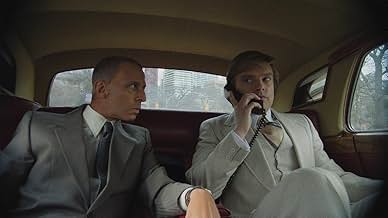
There is plenty to enjoy in this film: the gaudy apartments that Trump built for himself; the gold, the bad taste; and his first wife Ivana, a clothing model from Eastern Europe.
Ivana quickly bored the difficult-to-please Trump. Her English was never easy to listen to, and she even had ideas of her own about interior decoration and styling – another dangerous development in the world of Trump.
But no matter. This film has enough in it to be worth watching. It's just a pity this film doesn't go all the way.
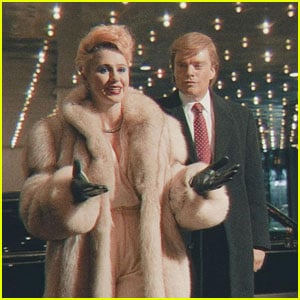
Somewhere, somehow there is a much more interesting film out there, that could have been made about Donald Trump.
There is his father for example: a brutal dictator of the school of hard knocks, who never built anything in Manhattan. Donald Trump's father made his fortune building public housing projects – that's high-rise tenements to you and me – in the outer New York boroughs. He was a cynic of the young Donald's plans, in a dynamic which would have been fascinating to portray more deeply than the passing reference it gets in this film.
Then there is the glitz, the glamour and the megalomania. Any convincing portrait of what Donald Trump was and is would have needed a lot more of this: the self-centred narcissism, the self-love, but also the energy to build monuments to himself like Trump Tower – all this could have been presented more convincingly.
In retrospect, it would have taken a lot longer than the 123 minutes of 'The Apprentice' to tell Trump's story. There is simply so much to it. Perhaps most important of all is that no one else ever really mattered to Donald J Trump, other than Donald J Trump himself; and everything else needed to be seen through that prism.
There was no senior employee he would not fire, no business associate he would not jettison, no ally he would never leave out to dry. Donald Trump's life is one long series of people that he has trodden on, stepped over, or wiped his feet on.
Donald Trump's life is also a testament to his native country. Only in America could someone have adorned himself with such wealth, amassed such influence, ruined so many lives and treated so many people with contempt, and then ended up as president.
A truly great bio-pic would not have needed to dwell very long on his time in the White House. That would not have been necessary; for Donald Trump's true character had been forged long before; and in the telling of that story any film of his life should have been as outrageous, as tasteless, as astonishing, as full of self-love and limitless ego and bullying, as penny-pinching and as domineering as the man himself. In short it would have been astonishing, revolting and compelling – just like that man we have come to know.
There is a lot wrong with this film. There are a host of details which aren't quite right and some very awkward moments of dialogue, but despite everything this film does actually work. By the end of it you really do have a sense of who Lee Miller was, and of her life, but also of the immense upheaval and turmoil which she witnessed and recorded.
Lee Miller was a hard-drinking and hard-living former model turned photographer who got a job working for Vogue in the Second World War. Although bombed out of their prestigious offices in central London, this glossy fashion magazine for haute couture continued to publish throughout the Second World War, and printed some of Lee Miller's most iconic photographs.
But Lee Miller wasn't stopping for anything. When the Normandy landings started in 1944, it wasn't long before she was on the tails of the advancing armies photographing everything, eventually including the freshly liberated concentration camps.
There she took some of her most famous photos, which have left their place in history – or infamy. But before she photographed those poor starving skeletons in their striped prison attire, there was a lot of other recording which went on too.
Many of those photographs did indeed end up in Vogue magazine – an astonishing place for images of war to appear. Yet throughout the war years Vogue continued to print Lee Miller's prolific output.
Kate Winslet has somehow made this production work. She portrays her subject utterly compellingly. The success of this film lies entirely in the depiction she gives of this maverick hard-drinking woman who could ride in an open-topped jeep just as well as any man, who could endure all the hardships of life at the front, who could overcome the constant scepticism of men. Lee Miller must have had an astonishing life-force to be able to do all this, and somehow Kate Winslet has portrayed this on-screen.
No matter then that this film is riddled with mistakes. Perhaps the biggest one is that the airmen (and women) in the scenes at an RAF base are not even wearing the right shade of air force blue: it looks more like they are all in the navy.
Neither was the dialogue with her son particularly well crafted. Cheeseball retorts followed gumball aphorisms in a cringe-making series of exchanges. Not only this, but Kate Winslet didn't look any older in 1977 than she had in 1944, despite the passage of another 33 years.
Then there were the slightly dubious scenes in France before the war started, when Lee Miller frolicked with her topless female friends, in an evocation of a lost land of sunshine, plenty and love.
But none of this seemed to matter. The sense of great events, of vast armies on the move, of the overthrow of continental tyranny; of giant change, of ruined cities and displaced populations; all this is somehow portrayed obliquely. All this somehow forms the backdrop to Lee Miller's life, which Kate Winslet has triumpantly portrayed.
This film is violent and unsettling and is confusing to watch. It offers little hope, and a lot of violence in just under two hours of mayhem, before a wildly implausible finale.
This film does have a certain mesmeric quality. It is so short of optimism, so full of militia men only answerable to themselves, who will kill without compunction, that you are dragged along with the action, despite its unpleasantness.
The most obvious problem with this film is the premise that there could ever be a civil war in the USA. Why would there be? What would be the reason for it? We are never told. We are given almost no explanation as to why the USA would break up into a number of regions at war with each other. This fact is simply a given, which we all have to accept.
The war is already well under way when we meet our main character Lee Smith, a woman war photographer who has covered many conflicts. With her male colleague Joel she intends to drive to Washington to interview the President, before Washington DC is over-run by the Western Forces (Texas and California apparently). It seems only a question of time before the President is captured and killed, and Smith and Joel want to get to him first.
Their task is made more difficult by two fellow-travellers, who share their 4x4 as it makes its way towards D.C. First there is Jessie Cullen, a wannabe war reporter with a camera, and old stager Sammy, a friend of Lee's who tags along for the ride.
The four of them now head off in the SUV, towards Washington. But they are over 800 miles away and have to traverse many miles controlled by militia units, some of whom owe no allegiance to any particular side.
Obviously, this is a recipe for a great many frightening situations, which of course happen. There are plenty of fire-fights, with our intrepid photo-journalists taking the pictures, as combatants are killed in front of their eyes.
But it does make for some good pictures, as young Jessie swiftly discovers. But she also finds out watching people die is a lot of harder than she expected. Welcome to our world, thinks Lee to herself, as the realities of war reporting begin to come home to Jessie.
Of course Lee has seen it all before. She's seen the burnings and the shootings and the twisted bodies many times. She begins to bond with Jessie, as Jessie realises that her pictures are actually of other people's deaths.
And now we come to what this film really is: it's a coming-of-age drama about war photographers, and what it means to take photos amid the carnage. But if this is the case, why set it amidst the chaos of an imaginary civil war in the USA, when there have been plenty of other conflicts that it could have been set in, with far more credibility?
After all, the realities of being a war correspondent never change. The waste, the madness are just the same, yet a whole fictional war has been imagined for all this to take place in.
Perhaps the makers of this film didn't want to set it in a recognisable setting: the Second World War, Viet Nam or the Second Gulf War or Afghanistan. Perhaps they wanted a morally neutral conflict, where there doesn't seen to be any right or wrong, just heavily armed combatants.
That decision, to set this film in a dystopian vision of America at war with itself, has given this film a bleak and unsettling outlook. It tells us that men with guns behave no differently today than they always have, when they no longer trust their neighbours.
This film thankfully is fiction. It is bleak and harrowing and offers us little hope. Let us be profoundly grateful it is unlikely ever to happen.
This is an immersive, compelling psychological drama. It hugs the element of ambiguity – is the main character really mad or not? – until almost the end, and in so doing provides an hour-and-a-half of first-class entertainment.
The tension tingles almost from the beginning. There is very little unnecessary dialogue or scene-setting at the outset, before the pivotal moment of the film unfolds – the death of Celine's young son Max, who slips off a balcony while trying to fix up a bird nesting box.
From that moment on, the rest of this compelling psycho-drama can play out, set amongst the backdrop of a middle-class neighbourhood in Middle America in 1960.
And so we are treated to a feast for the eyes: the immense automobiles of the era, with white-walled tyres and giant engines; of perfectly cropped middle class front lawns; of the two main characters, Celine and her next door neighbour friend Alice, who wear white gloves and pearls as they take it in turns to ferry their two children to school.
Until that is poor Max dies. Understandably Celine is devastated, especially as she has no other children nor can she have any more, and has an abusive husband.
But this film is not really about the husbands. The men in this film are more like book-ends: they have a supporting role holding up each end of the narrative, while the two main characters, Celine and Alice warily circle each other, gradually wondering which of them is mad.
Is Alice imagining things? Her mother dies shortly after a children's party. She was supposed to be on medication, but an autopsy recorded no sign of it in her bloodstream. Did her next door neighbour Celine swop out the medicine for a placebo?
Further strange behaviour follows. Is Celine mad or is she just exhibiting the sort of behaviour anyone suffering from the devastating loss of her only son would do?
Only at the end do we get the truth. By then plausibility has been stretched a little too far. But until that time the film has provided a wonderful hour-and-a-half of spine-tingling ambiguity. Anne Hathaway produces a fine performance as a bereaved mother, and the child actor playing Alice's son Theo is almost too good. But the best performance goes to Jessica Chastain as the well-intentioned and reasonable next-door neighbour who is gradually drawn into this unfolding tragedy from which there can be no escape.
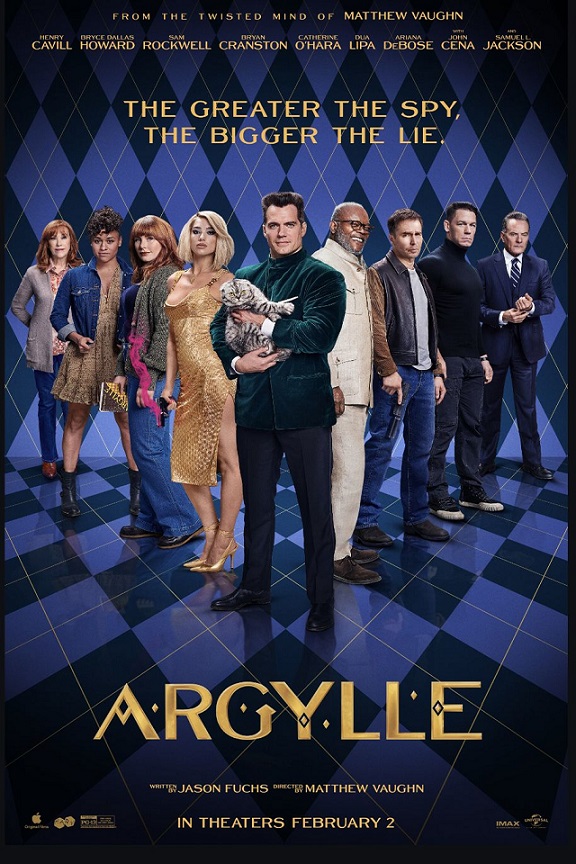
This is a funny and clever film with an unrelenting pace. It mixes comedy, self-knowing absurdity and good old-fashioned dramatic tension in a thriller that will have you laughing as you sit on the edge of your seat.
You will not get bored. You will see all the ironic references. You will note the post-modernistic touches; and you will from time to time laugh out loud as this film continues on its helter-skelter way.
This film is a minor comic masterpiece which sends up the notion of a traditional spy thriller, while actually being a traditional spy thriller itself. That certainly takes some doing.
The plot revolves around a quiet woman author called Elly Conway, who writes spy novels featuring a suave secret agent called Aubrey Argylle. From time to time this good-looking hero appears to Elly, with his chiselled features, gently suggesting the next plot line.
Unfortuntaley Elly's books have a habit of coming true. They seem to predict the future so well that she has – unwittingly and so far unknowingly to her – become a person of interest to The Division, a shadowy international crime group.
Cue shots of suitably dastardly criminal masterminds, who would very much like to get hold of Elly, especially as she is writing another novel in which she will explain the whereabouts of the masterkey, which would expose the inner workings of what she thinks is only a fictional entity – but which in fact looks suspiciously like The Division.
She is in need of a hero. But Aubrey Argylle is only a figment of her imagnation, albeit a good-looking one. She needs an actual hero – and hey presto! In the manner of all good comedy spy spoofs, one appears.
Her actual hero is called Aidan, but at first he seems the very opposite of what's needed. He isn't good looking. He isn't suave, and it is only as time goes on that his true qualities gradually emerge.
By now The Division are on to Elly and Aidan, and various heaviliy armed swat teams from The Division are in hot pursuit. The hunt is on.
Can Elly and Aidan stay ahead of the bad guys? Can they somehow make it into the lair of The Division, into the inner sanctum of the head of The Division itself? Of course they can, with plenty of ironic touches.
This film works because it presses all the right buttons. It has a narrative arc in which it gradually gets harder and harder to tell who's telling the truth. What side is even Aidan on? And who can Elly really trust?
How come she can predict actual events so accurately in her books? Is she only a writer, as she thinks she is – or is there more to her than even she knows? As the action moves on, we are drawn into the story more and more, all the time amused by the un spy-like actions of Aidan, whose casting was comedy genius.
Will the real Elly please stand up? Even by almost the end of this film we are still not sure, so skilfully has the film woven its charm; but in all this telling there is much fun to be had, and by the end you will have been gloriously and uproariously entertained along the way.
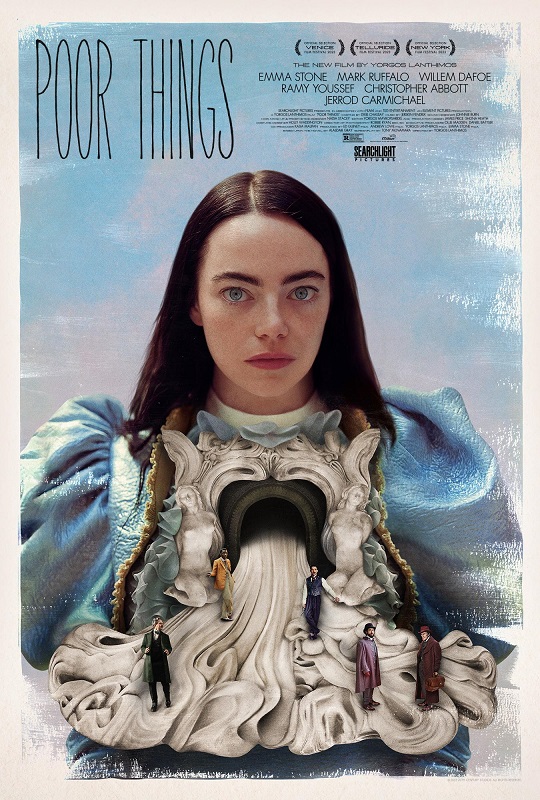
This film once again demonstrates the golden rule of film making: that no amount of clever CGI or set designs or imaginative embellishment can overcome the weakness of a poorly developed plot.
This film rambles along, often in a slightly unsettling or creepy way, but it doensn't really say anything or make any sense, or justify its own length of two hours twenty mintues (it felt longer).
To the extent that this film is anything, it is a coming-of-age story. The twist is that the brain of a child is transplanted into the body of a woman who has died, who is then brought back to life, only now with a child's brain inside it. This means that a child's mind is going to develop in a fully grown up woman.
Obviously this is quite a lot to take in, but no matter, for this story takes place in Victorian London. There are dimly lit streets, horses and carriages, and a mysterious house lived in by an eminent Victorian surgeon called Godwin Baxter.
It is Baxter who has done the transplant, putting the child's brain into the body of her own mother (Yes, the woman who died was actually the child's mother.)
Cue a lot of scenes of Emma Stone pretending to be a sulking, stomping toddler, spitting out food (there is a lot of this) and generally throwing tantrums and doing all the things five year-olds do, except this five year-old inhabits the body of a mature woman.
It isn't long of course before the woman-child discovers sex. Oh yes, and from then on we are treated to endless trysts, self-stimulation and orgasming as our child-woman climaxes continually.
In this she is helped by an unscurpulous rake who befriends her, and takes her out of Professor Godwin's house, and takes her to see the world.
But she sees it through a child's eyes, although using quite complicated vocabulary, almost like a child who has looked up too many words in a dictionary.
They carry on, visiting Lisbon in Portugal (more sex of course) then going on a cruise, then arriving at Alexandria in Egypt, then ending up in Paris penniless.
At this point our herioine (her name is Bella) discovers prostitution. With a child's excitement and words, she discovers she can have sex and get paid for it.
Now we enter the longest (or longest-feeling) part of the film, when she encounters all sorts of men while having sex in the brothel. But by now the film has lost all meaning. What is the point of all this sex with strangers who are paying for it?
Preseumably it is all part of Bella's journey through life, her voyage of self-discovery. Eventually she returns to her adoptive father, Godwin Baxter, the eminent surgeon in London who created her.
But what is the point of all this spitting out of food, of Emma Stone pretending to be a five year-old child in a woman's body? Of her slow and gradual journey to adulthood after seeing the world for so long through a child's eyes?
Did any significant or profound insights emerge? Did we learn anything new? Or were we just treated to endless shots of Emma Stone orgasming as a child yet again?
The earlier parts of this fim, set in Godwin Baxter's house, a remarkable Art Nouveau detached residence creatively re-styled as his home and operating theatre at least have a certain creepy coherence; but the longer this film goes on, the more you find yourself wishing you had spent the evening doing something else.
This is a lightweight and unsatisfying little film. It simply doesn't have enough in it to be interesting, with thinly drawn characters, improbable plot turns and a general sense of contrivance and absurdity.
This film is loosely based on Shakepseare's Much Ado About Nothing. But what worked on-stage in Elizabethan England doesn't necessarily work so well in the 21st Century.
The whole sense of this film is trivia. Trivia in fact is the perfect description: trivial arguments, trivial plot turns, trivial importance – what were the makers of this film thinking?
The plot centres around two people: Bea, a young law student on the point of giving up her studies, and Ben, an older thirty-something with a washboard stomach and pectorals to match.
For reasons we need not bother to enunciate here, Ben and Bea have to pretend they are together, are an item, are romantically involved.
But in this pretending they wonder if they should really be involved, rather than pretending. Perhaps they really are made for each other after all.
But no. They are not together. They dilly, they dally: are they really an item or only a pretend item? In this various other people at the house in Australia where they are staying seem to have a curious interest in the outcome – but what will the outcome be?
And so things go on. They make love – no, that was a mistake. More creeping out of the bedrooms at midnight. It's all so on-off, so not sure, so wheels-within-wheels.
But what does any of this matter? Does it matter if it all works out between them or not? Does it matter if this young law student really gets together with this waxed and tanned Adonis? (He is apparently a merchant banker.)
No. It doesn't matter. The wedding they have both gone to Australia to attend doesn't matter either: cue another implausible relationship, this time between two women. (It's a gay wedding of course.)
As this is based on a Shakespearean play there is plenty of overhearing things: of people crouching behind hedges listening to other people's suspiciously loud conversations (they wanted to be overheard of course). Manipulative parents, former lovers and interested bystanders all have their parts to play.
But again, something about this film doesn't work. Even the background of the Sydney Opera House, the magnificent down-town area of Sydney, and the blue waters of the Pacific all seem somehow underwhelming. Indeed one of the features of this film is that it hardly feels that it is in Australia at all, despite those shots of the harbour and a scene involving a Koala bear. Perhaps this is because most of the action takes place either indoors, or in the grounds of a large house in Sydney's suburbs.
You can't help but get the feeling that house could have been anywhere – Florida, California, anywhere with a bit of sun. It was almost as though it didn't matter, this anonymously decorated backdrop serving a stage for this re-interpretation of one of Shakespeare's comedies.
Apparently this film has done well at the box office. It is certainly true that the two main actors, Sydney Sweeney and Glen Powell can indeed act; and they carry their lines as well as anyone could have done. But the problems with this film cannot be rectified by acting alone, no matter how good. The problem was the fundamental conception of the film at all, and that it got made in the first place.
This film doesn't quite work. It doesn't delve deeply enough, doesn't present a convincing enough sense of time and place, and doesn't really explain what went on between Elvis and his young wife Priscilla.
Admittedly, doing a film about the wife of Elvis Presley is much harder than it sounds. Just portraying Elvis himself is a tall enough order, and Jacob Elordi doesn't quite convince you as Elvis, although he has got the voice off pat.
But this film never really convinces you more generally. It never gets out of first gear, never really has the ring of authenticity, as though it is going through the motions.
There is a slightly post-modern tinge to all this, an emphasis on incidentals (including some amazing cars by the way), but it doesn't really answer the really big question: what on earth Elvis thought he was doing, bringing a 17 year-old girl to Gracelands who knew nothing of the world.
There she had to fit in around Elvis's peripatetic life: sometimes here, sometimes there, she staying at Gracelands all the time while he went off to shoot films or play concerts; and all the time he was gone she wandered the lawns of Elvis's home on her own.
What on earth was going on? Elvis had met Priscilla in Germany some three years earlier, when Priscilla was only 14. What on earth was all that about? When he had women throwing themselves at him anywhere and everywhere?
Priscilla became a kind of adornment at Gracelands, a tiny little trinket that could not be touched, nor even made love to for a long time. This star-struck little individual offered no resistance, and simply accepted her role, going to high school for her final year, and enduring the controlling behaviour of Elvis.
Was he looking for? A purity he could not find? Was it obedience, complete and utter that he was after? What was it about this waif that so enamoured Elvis that he eventually married her?
This is the question this film does not really answer. Perhaps it would have been impossible to say, in that mad drug-riddled world of sycophancy at Gracelands; where an endless round of back-slapping and carousing from his inner circle belied the emptiness of Elvis's life.
Perhaps the drugs took over. Perhaps no one really knows what went on in the corners of Elvis's mind; although you would think if anyone knew it would have been Priscilla – who was actually the executive producer of this film.
But no. The years rolled by. Fashions came and went (cue more post-modern attention to plastic curlers and beehive hairdryers). But still we get few clues as to what was really going on.
Mercifully, Pricilla eventually left Elvis. She struck out on her own, having thrown half her life away being an adornment at Gracelands. Quite what really went on there we still don't know, and this film has sadly failed to help us find out.
This film is two hours of utterly compelling viewing. It is the story of a different world from today: of a world of motor racing where death was an occupational hazard, where safety was a seldom used word, and where drivers left notes to their loved ones in case they did not come back.
This was the world of motor racing in the late 1950s. No giant works teams backed by huge corporations – just tiny little teams of mechanics and drivers who drove their cars like maniacs.
No wonder so many of them died. It's almost a wonder anyone survived, bearing in mind how dangerous it all was, and how little thought was given to the safety of the drivers; and in this mad world of hurtling motorised rockets, there was one name that stood above all others – Ferrari.
Yes, that delicious red colour, that black prancing horse on a yellow background; that intangible greatness that set it apart from all the other marques – that is what this film is all about – a tribute to that most special of all brands.
And who was the driving force behind this tiny little team of gifted designers and drivers and mechanics? Why Enzo Ferrari of course, without whom none of this would have been possible.
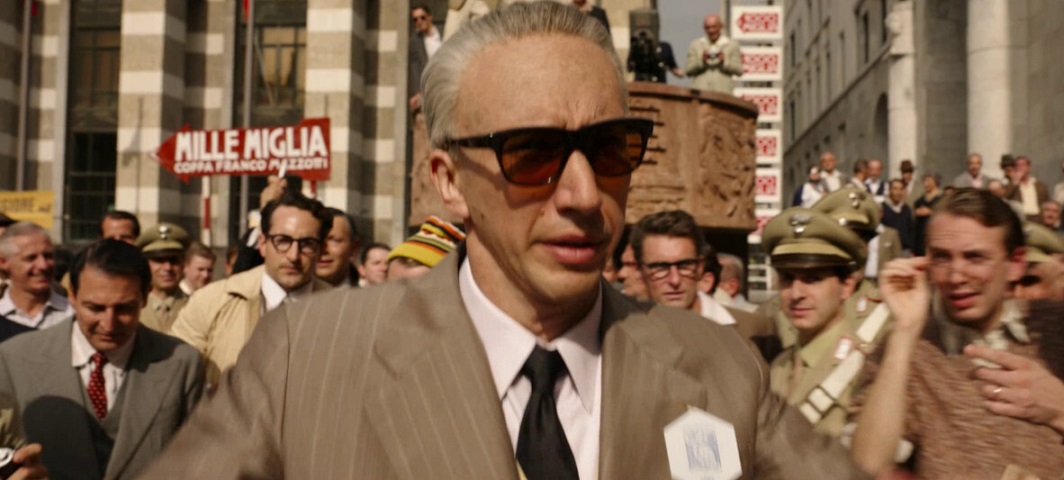
Ah yes. Enzo Ferrari. There had to be someone like him didn't there? This elegant, perfectly tailored despot, driving his men to the limit, always demanding more. It is really to him, above all, that this film pays trubute.
Naturally he is portrayed as a tormented genius. Tormented by many things: the death of his friends when he was racing, of his drivers when he was running his own team, but perhaps above all by the death of his young son Dino, who suffered from muscular dystrophy.
Naturally there is a mistress, and another son born out of wedlock; then there is his wife, superbly played by Penelope Cruz, who although unable to do a convincing Italian accent (she is after all Spanish) still managed to carry her part superbly.
Then there are the baddies, the Maserati team who intend to beat Enzo's men in the forthcoming Mille Miglia. These include Stirling Moss and Fangio, and quite how Enzo managed to outwit that legend of Italian racing heaven knows – but he did.
But above all this film re-creates the sense of time and place of late 1950s Italy. The suits, the clothes, the Alfa Romeno Enzo is driving about in – all these details are perfect. The first 20 minutes of this film have been painstaking re-created to reproduce that special time in Italy's history. The result is almost breathtakingly beautiful: a faithful evocation of a long-lost time in the history of motorsport, when the legend of Ferrari was born.
There is a scene in which all five cars for the Mille Miglia are in a courtyard at Enzo Ferrari's base in Modena, Italy. The curves of those racing cars, juxtaposed against each other, the press scrambling for photos in attendance, is almost art. For anyone with an ounce of feeling, the sight of those classic Ferraris, destined to be driven by drivers not all of whom would survive, is beyond words.
It speaks to the essence of why Ferrari is so great, and of the influence and creativity of one man. Go and watch this film, and marvel at what true genius really is.
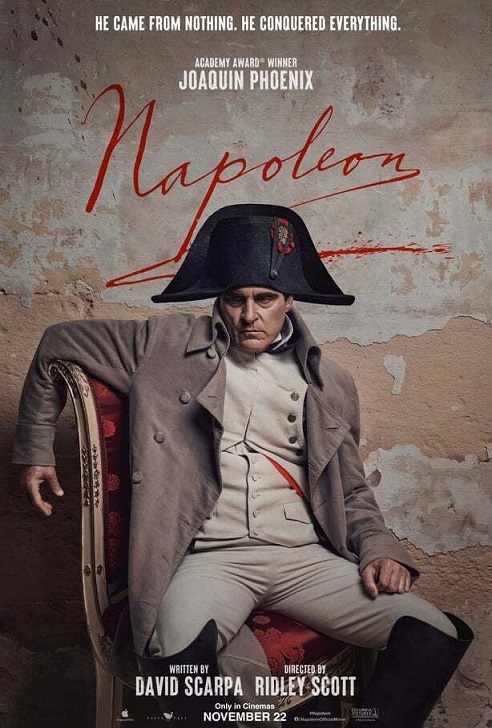
This must surely be one of the worst films ever made about the life and times of Napoleon. Everything about this film is wrong, from the CGI to the historical inaccuracies to the cringe-making dialogue. It really is hard to know where to start.
Let's begin then with that dialogue, and in particular the many scenes between Napoleon and Josephine, surely some of the most stilted, embarrassing and downright ridiculous lines ever written.
Far too much of this film revolves around his relationship with his beloved Josephine, who is bravely played by Vanessa Kirby. Perhaps it's not her fault. Perhaps no actress could have done anything with the awful dialogue she was presented with.
Even more obvious is that Joaquin Phoenix is completely wrong for the part. He doesn't look remotely like the great Emperor Napoleon – rather a drawback you would have thought, considering who he was supposed to be depicting.
Then there are the cringe-making crowd scenes, where even the extras seem to sense they are in something awful, and stand about as though they don't really want to be there at all. The execution of Marie Antoinette, the arguing in the National Assembly, even the re-taking of Toulon – all these things seem somehow wrong.
A lot of it was probably the CGI. Everything – including the scenes in the Kremlin when Napoleon finally does get to Moscow – seem strangely fake. There is too much grey, almost a semi-monochrome flavour to this film which makes it even worse.
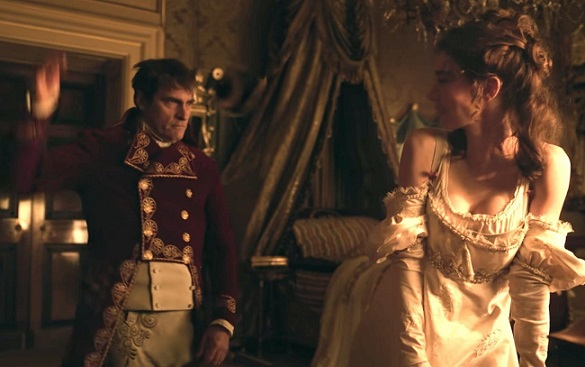
What might have been more interesting would have been some kind of psychological portrayal, some sort of attempt to get into the mind of this pompous tyrant who once ruled half of Europe.
Perhaps it would have been better to have begun the story on the island of St Helena, that rocky outcrop in the middle of nowhere in the Atlantic Ocean, where Napoleon wrote his rambling, self-justifying memoirs, in which he was right and everyone else was wrong.
At any rate, his relationship with Josephene could have been portrayed more convincingly, or even better left in the background so that there would have been time to actually understand the power-politics of the era, which led to the Emperor Alexander of Russia reneging on his deal with Napoleon.
By the time we get to the battle of Waterloo things have got even worse. The Duke of Wellington looks as though he has come out of Monty Python, and the depiction of this epic battle is an embarrassment.
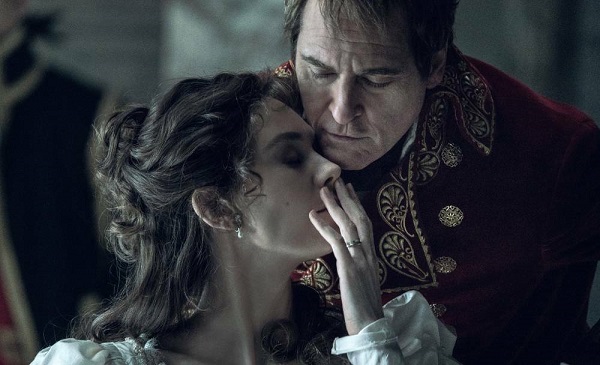
It is difficult to know what Ridley Scott thought he was doing when he made this pile of rubbish. Ridley Scott has an astonishing oeuvre of work, and yet he has come out with this. It will do nothing to enhance his reputation, but on the other hand but he has so much other good work in the can he will be forgiven.
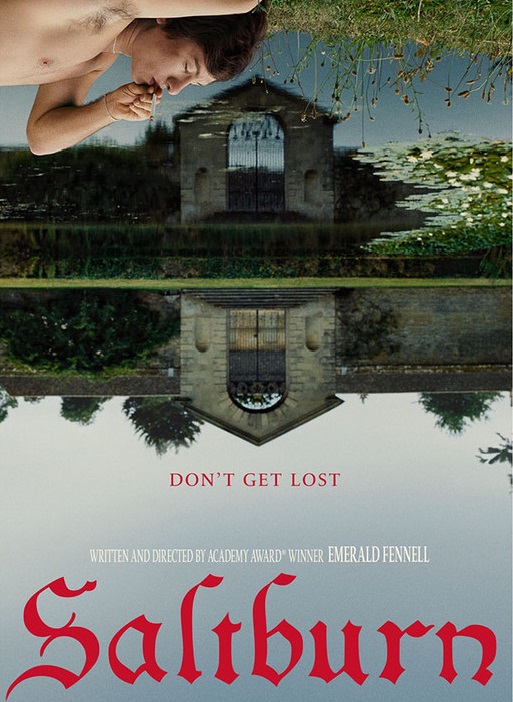
This film is a clever and well-crafted gothic tale which saves the best until last. It oozes sexual tension, mystery and hidden secrets and it is only at the end the truth is revealed.
Much of the success of the film must go to Barry Keoghan, who plays Oliver Quick, a socially inept scholarship boy at Oxford University in 2006.
He is befriended by a suave aristocrat called Felix, who invites Oliver into his social circle, which is full of well-to-do friends.
Eventually Felix invites Oliver to spend the summer with him at his family home – the imposing stately house which gives the film its name – Saltburn. Naturally there are plenty of satisfying scenes of little Oliver, with his wheeled suitcase, trundling towards the vast entrance doors of this country pile.
Naturally there is a straight-backed butler, haughtily erect. There are dark corners, suits of armour, gothic vaulted ceilings – and of course the rest of Felix's family.
Cue an eclectic mixture of eccentric individuals, including Lady Elspeth, played by Rosamund Pike; but perhaps best of all is Alison Oliver, who puts in a stellar performance as Felix's brittle sister Venetia.
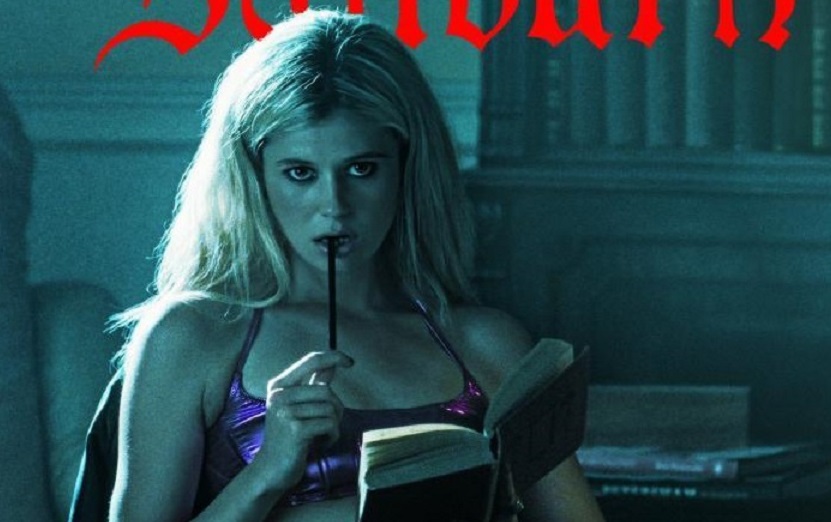
So it's all set then. The butler, always there in the background. The spooky corners, the creepy recesses – the odd inhabitants. Having set up the story so well, it can't go wrong.
We are treated to an hour-and-a-half of delicious dramatic tension, mainly because of the quality of Barry Keoghan's depiction of a socially awkward scholarship boy who is out of his depth.
There are moonlit scenes on the lawn, where Venetia entices Oliver, but actually Felix is more Oliver's type. It's all so complicated, so nuanced, so ambiguous. Amid the wild drinking and partying, under the moonlight in the afternoon sun, our merry band of hedonists plough on.
Felix seems everything that Oliver is not: suave, self-assured and oozing charm. But the moral of this film is that not all is necessarily as it should be, and what is on the surface is only a fraction of the whole; and as our merry band hurtle on towards destruction, which one of them will come out on top?
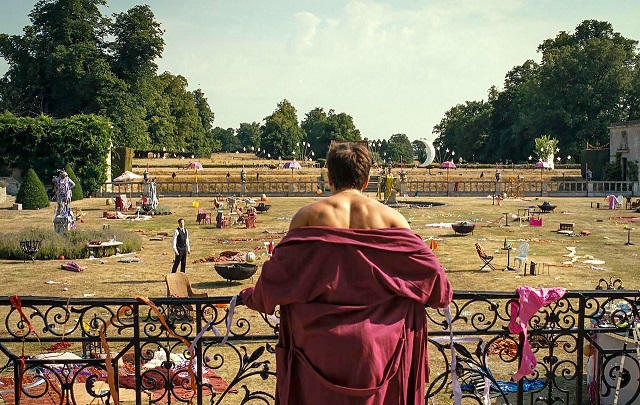
As the last notes of 'Murder on the dance floor' ring out at the end of this film, you will smile with pleasure. You will have seen sexual deviancy and hurt, all wrapped up in the most charming of packaging; but above all you will have seen a well-crafted little thriller, a nugget of entertainment that never drags; and the moments when you have to look away if you are straight, or because the truth coming out is almost cringe-makingly perfect, simply make it all the more worthwhile.
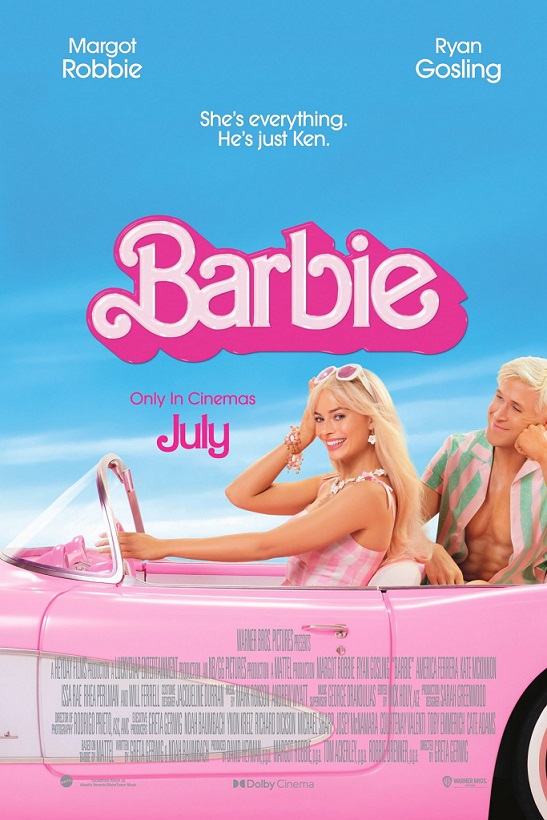
This film has been hugely successful, but it's hard to see why. It's a confusing, rambling little offering that plays with issues of gender and identity, but makes little sense.
This is not a children's film. It is an attempt to take down conventional images of masculinity. It offers a daft overcooked version of laddish manhood which can easily be lampooned, which is presumably why some feminists and teenage girls love it.
The instrument of this deconstruction is Barbie herself. Barbie, or should we say Stereotypical Barbie, played by Margot Robbie, is a real-life barbie doll living in Barbieland.
Yes, you really did just read that: a real-life Barbie doll living in Barbieland. And now we come to the first daft thing about this film: that a real-life barbie doll is an impossibility, obviously, because a real human can't be a doll, because a real human is an organic, living breathing organism that eats and drinks, whereas a barbie doll is a piece of plastic played with by small girls.
But no matter. We are on a rhetorical journey. We are going to deconstruct the male patriarchy running this world, and if it's necessary to come up with some ridiculous plot devices, who cares?
So Barbie, or Stereotypical Barbie, lives happily in Barbieland. Barbieland is a world in which everthing is pink. Pink cars. Pink houses. It's like a giant Wendy house, in the Mattel-Barbie style.
All is well here. Of course as the inhabitants of Barbieland are Barbies, they don't eat or drink or have other bodily functions. So Margot Robbie as Stereotypical Barbie mimes eating and drinking, as a Barbie played with by a child might have its mouth placed close to a cup, while pretend tea or coffee is drunk.

All very strange, not to say daft: this semi-world where Barbies are both humans and dolls simultaneously.
Obviously there's no sex. (How can there be? Barbies don't have sexual organs.) But there are men. Strange, confused sexless men introduced into the Mattel range. Of these the most important is Ken, played by Ryan Gosling.
Poor Ken. What is he? Who is he? In Barbieland there is no sex. The female Barbies have girl-parties every night. But what about Ken? His job is to sit on the beach, not even to be a lifeguard. His job is simply to be an adjunct to Barbie, an addition or afterthought by the makers Mattel.
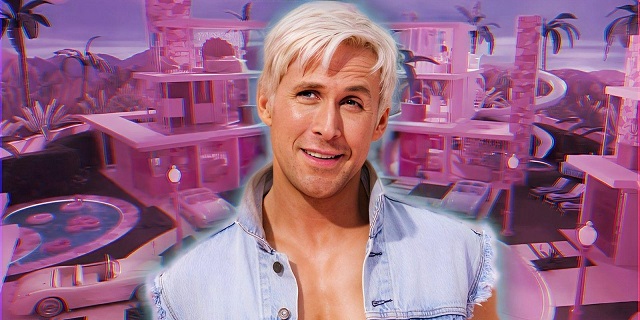
Perhaps this is another reason why some feminists like this film. In Barbieland the men are simply adornments. They are secondary, useless add-ons to the real party, which is for Barbies.
Margot Robbie as Stereotypical Barbie leaves Barbieland. She is accompanied by Ken, or Beach Ken, one of our neutered, sexless men.
But when they reach the real world they discover women (as Barbies) are not in charge. Indeed there is a complex hierarchy with customs they are unused to and men at the top.
Poor Barbie. She suffers the indignity of being leered at by construction workers, of being told she is an objectified sex object that is an affront to her gender. She finds that in the real world not all women want to bond with each other and comb each others' hair.
Meanwhile Ryan Gosling (sorry, Ken) has been learning some even more painful lessons. He has been learning you actually have to be able to do something in the real world. In Barbieland his role is simply to be on the beach. But in the real world if you want to be a lifeguard you actually need to be able to swim and be able to save people – which he can't.
Actually, these scenes are some of the best parts of the film; and more generally Ryan Gosling emerges as the star of this story – but more of that later.
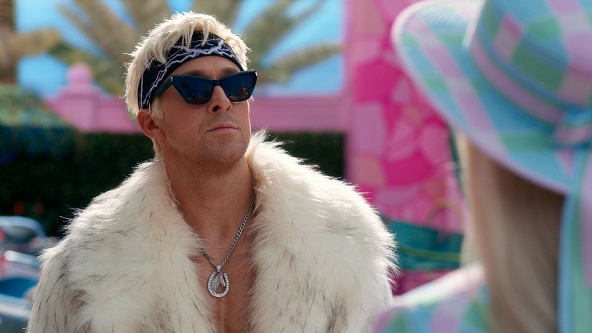
Stereotypical Barbie and Ken (Ryan Gosling) now return to Barbieland, but now things start to go wrong. Ken feels, thanks to his visit to the real world, that he has found his true nature and worth at last. He becomes macho Ken, the worst kind of loutish, beer-drinking alpha-male braggart. He and his fellow Kens now take over Barbieland, and instead of a matriarchal society based on sisterhood and girl-parties, the Kens are in charge. Bare-chesting, beer drinking and loutish behaviour become the norm, in a grotesque send-up of male culture.
Is this the real reason that this film is so successful? Ryan Gosling is cringe-makingly good as the bare-chested warrior, tearing up Barbieland. Lad-culture, beer and bare-chesting now rule the pinkdom, as Ken and his mates discover their inner selves, as alpha males on stallion horses.
Of course, society (society in general) isn't like this. Most men don't go in for the absurd stereotypical bare-chesting that Ryan Gosling does so well. Most men are reasonable, polite and respectful of women, but that doesn't suit this film with its lorryload of stereotypes. In this film men are either neutered, useless adjuncts to women in Barbieland, or they are letching, leering blokes. No wonder so many feminists love this film. It tells them what they want to hear.
Naturally all is eventually well in Barbieland. Ken and his friends realise they've been idiots, and Stereotypical Barbie and all the other Barbies forgive them. It is now time for stereotypical Barbie to go on her own personal journey. She leaves Barbieland for the last time, to live in the human world. There is one last plot twist, which I will spare you, in case you want to watch this pile of tripe, but it's in keeping with all the other absurdities which have gone on.
But lurking above and beyond this giant knock on men there is a one more paradox. The best, most intense, cringe-making parts of the film, where Ken does his alpha-male chest-beating best (or worst) are actually the best bits of the film. In other words, although the film is indeed a knock on men, the best thing about it is actually the performance of a man. It is Ryan Gosling – a male – who steals the show, hardly the message the makers of this film intended to convey.
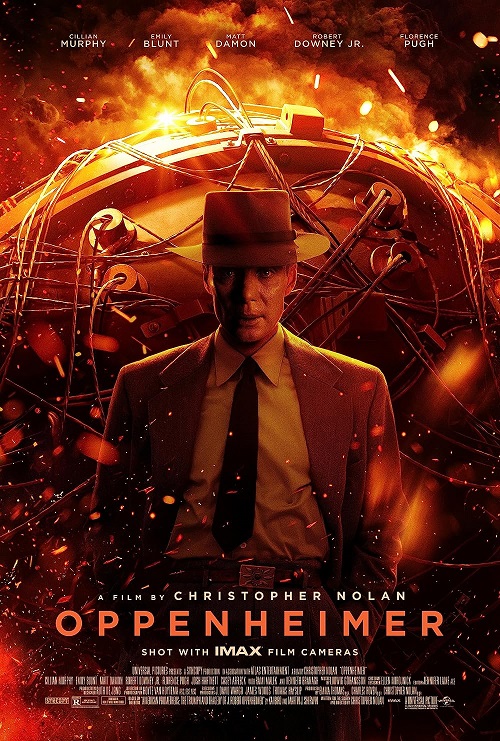
This film is much too long and complicated, but it's still worth watching.
Three hours is an awfully long time to sit in a cinema seat, and it takes something quite special to make it worthwhile – and this film isn't it. But there is still much to see and wonder at in this three-hour marathon. There are gripping moments, moments of wonder and surprise; there are masterful turns by actors like Tom Conti as Einstein and Emily Blunt as Oppenheimer's wife – but none of this compensates for the basic problem.
The problem with this film really is that Oppenheimer wasn't the important thing at all. It was what he created that mattered. He was merely the project manager, the facilitator, the factotum. What mattered was what he helped to make: the first atomic bomb, which changed the world for ever.
So if the film was really about the bomb, why make it about Oppenheimer? The only reason to give Oppenheimer any space at all in this film is as a story-telling device, as a peg to hang the narrative arc on, but not as the subject of the film itself.
And this is why this film is so long. Surely, if what really mattered was the bomb, the film should have ended in that first bright white light: the flash at the beginning of the fission process, in which a bucket-load of Uranium was turned into light and energy.
This was surely the end-point of the film. If it had been, it would have been much kinder on the audience; but in fact there is still so much more to sit through. There is the gradual (and marathon-length) attempt to strip Oppenheimer of his security clearance, which would have lowered his prestige and made his opinions less important to the government. There is – an apparently endless – picking through of Oppenheimer's life, as all the people he dealt with are gradually called in to give testimony at a tribunal, either for or against him.
In turn, the man who attempted (and succeeded) in getting Oppenheimer off all future nuclear projects was himself rejected as a candidate to join the cabinet, the President's inner circle of department chiefs and advisers.
But none of this matters. What really matters is the Americans got there first. What matters is that Oppenheimer kept all those plates spinning, all those temperamental scientists and physicists and mathematicians working, in that remote and dusty outpost called Los Alamos; and out of this emerged something terrible, something game-changing, after which the world would never be the same again – and this is the only part of the story which needed to be told.
Perhaps the makers of this film thought that would be too simple, but it still would have allowed for plenty of dramatic tension. Oppenheimer's relationship with General Groves is thinly portrayed, but in practice it must have been far more interesting. (Matt Damon had very little chance with the part he was given.)
The nervous tension of beating the Nazis, the existence of Klaus Fuchs, who really was a Russian spy at Los Alamos, the existence of so many scientists with left-wing sympathies, Oppenheimer's affairs with women; and the knowledge that they were creating Armageddon itself – all this was enough to produce a gripping film. No tribunals were necessary after the fact. No cross-examining long after the bomb was dropped was needed. No flashbacks at all. Only one flash was needed in this film – the flash that heralded the dawning of the nuclear age.
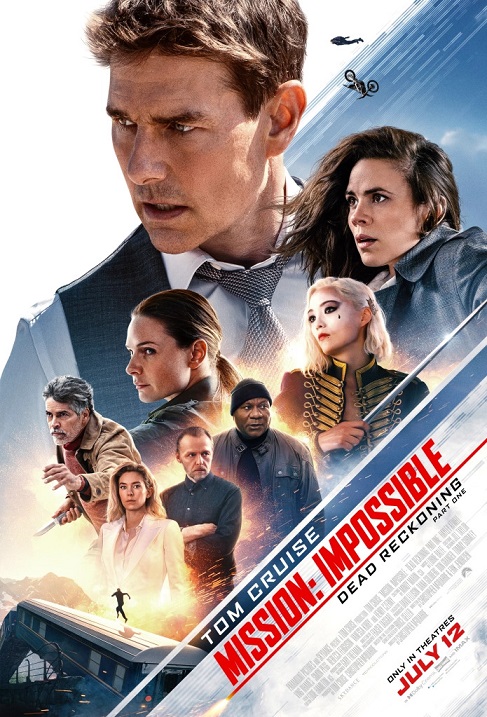
This is two and three-quarter hours of relentless entertainment. The pace never drops as our action hero takes on the baddies. Cars get smashed, trains get wrecked and the plot twists and turns like a snake with abdominal pains, as Tom Cruise relentlessly clings on, in a race to save the future of mankind.
It's what you would expect from a Mission Impossible film of course. No subtlety. No fine shades. Just relentless and breathtaking action you can't take your eyes off. The people who make these films have been doing it for a long time now, and they know what they are doing.
There really isn't any time for any love interest in all this. Although the show's second principal character Grace is attractive, a master of pick-pocketing and disguises, she and Tom Cruise (Ethan Hunt of course) have no time for any finer feelings. They are too busy trying to stay alive, and avoid all the other people who want to get hold of the keys.
The first key Ethan Hawkes already has, thanks to his former associate Ilsa Faust. But the first key is useless without the second key. But naturally lots of people would like both keys, because if you have both keys you can gain access to the source code of the Entity, a software program which has become sentient, and which is threatening to go rogue.
The Entity exists purely as a piece of software. But it is so powerful it can access any computer or file server anywhere. It can alter any computer program, it can change any information anywhere on any device to suit itself. It is in other words a menace to civilisation.
As a piece of software, this sentient entity needs humans to actually do its physical work for it. This is where Gabriel comes in. Armed as he is with the full back-up of the Entity's ability to delve into any computer file it needs to, Gabriel is an extremely dangerous adversary indeed.
Then there are all the American security services, under the control of the Director of National Intelligence, Mr Derlinger. They naturally want both keys.
Then there is Tom Cruise, or Ethan Hunt, who works for IMF. IMF stands for Impossible Mission Force, and they do all the jobs the official security services can't or won't do. But IMF are outside of the mainstream. They don't exist officially at all. They are off-radar, known only to a handful of people in the intelligence community, including Eugene Kittridge, who used to be their director.
'We operate in the shadows,' says one of the IMF team to Grace, that pick-pocket who thinks she can get in on the action. But although Grace is quick-witted and a dab-hand at taking things out of people's possession without their noticing, she has very little back-up. Her plan to steal Ethan Hunt's key and sell it quickly goes awry, and she ends up throwing in her lot with the IMF.
Now there are three main groups after both keys. The official security services under Derlinger, Gabriel working on behalf of the Entity, and the IMF. The stage is now set for multiple chases across multiple continents, as the keys are snatched, snatched back and snatched again.
Cars are wreaked amidst the backdrop of great European cities; bullets ricochet and a great deal of glass get smashed; the action then transfers to a train, where yet more fighting, crashing and smashing takes place. The action never falters, as each party vies with the other, with the ever-present threat of a double-cross from Grace. It is pure adrenalin-soaked entertainment which will keep you pinned to your seat; and as the final strains of the Mission Impossible theme music accompany the end of this film, you will wonder where the last two and three-quarter hours disappeared to so quickly.
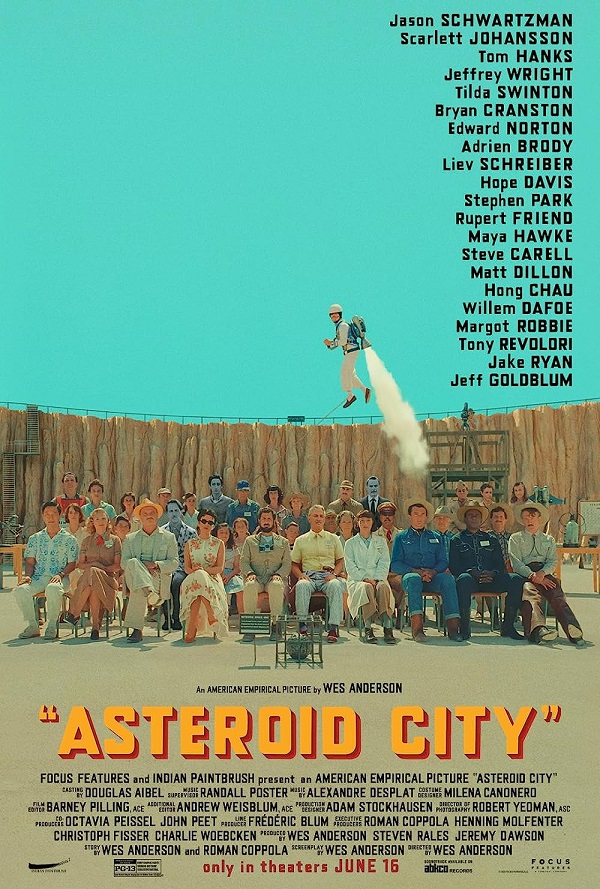
What is the point of a film, of going to the cinema? Presumably it is to be taken on a journey, on a narrative that leads somewhere. A film doesn't have to be profound or explain the meaning of life or re-interpret the Ten Commandments, but it should at least make sense. It should be entertaining and transport you – for a couple of hours – out of the world we know, and into a fictional world where wonderful or interesting things may happen.
Is that what we got, from this little offering from writer-director Wes Anderson? Not really. Instead what we got was a confused and messy pastiche which was by turns boring and ridiculous, and which undermined itself with its own absurd sub-structure.
This film breaches the most fundamental rule of all: that a film needs to make sense. This film attempts to be a story-within-a-story: the main narrative is set in the deserts of the south-west of the USA in the middle-1950s. A convention for children interested in astronomy is being held at a tiny way-station by a railway track, where a meteorite landed some 5,000 years ago, and which left a giant crater.
In this part of the film, which is in colour, complete with pastel shades and 1950s cars and fashions, our main character Augie Steenbeck arrives at the tiny settlement by the railway tracks. He has driven there in a 1950s-style station-wagon with his astronomer son Woodrow and his three small girls.
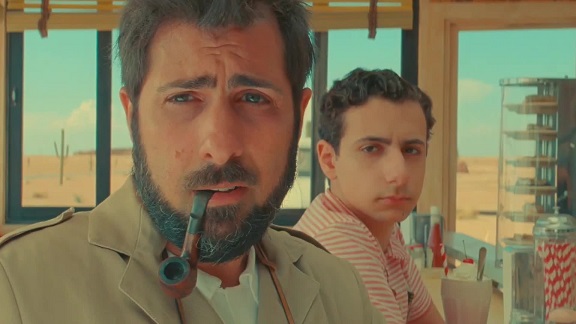
There are chalet-style huts which serve as a hotel. Augie takes one of the chalets with his family, and settles in.
Other parents arrive with their precocious children. Most notable of these is Dinah Campbell, whose mother Midge Campbell – played by Scarlett Johannson – is a famous but jaded actress.
The prize-giving at the convention begins, with the crater caused by the ancient meteor in the background. Naturally an alien spaceship interrupts things, and a distinctly low-budget alien retrieves the meteor and buzzes off.
Further shenanigans ensue, enlivened by a party of primary school children, a military exclusion zone (you don't want news of an alien landing getting out) and some romance between Midge and Augie's children.
Midge (Scarlett Johansson) and Augie (Jason Schwartzman) also have a kind-of affair. They have mannered conversations through the windows of their chalets, which lead to some sort of tryst (we think). But like everything else in this film it is disjointed and unsatisfying.
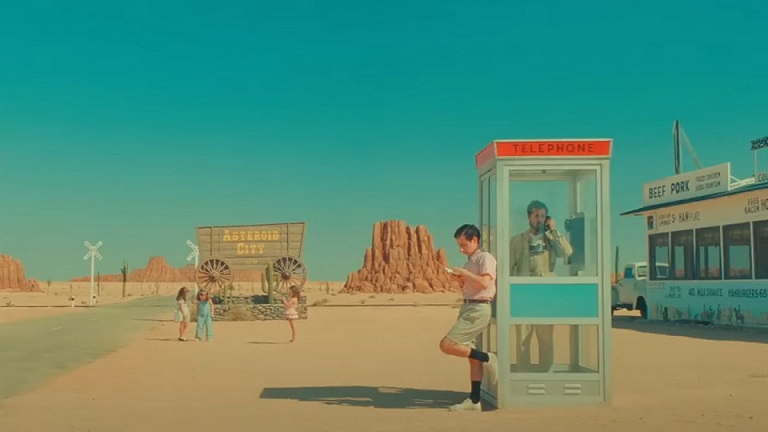
Tom Hanks (as Augie's father-in-law) puts in an appearance, but even he cannot save this film. By the time the clippy-clapp freight train that began the colour sequences reappears, heralding the end, we are all supremely grateful it is over.
All this would have been nearly bearable if this was all there was. But this film has another awful aspect. Interwoven with the colour sequences are parts of a parallel story – the making of the film, the writing of the script, even the inception of the idea of the script, all filmed in black-and-white.
So we are treated to the inside story behind the film: to the anguished writer-creator of it in his pyjamas; and to his conversations with the actor who plays Augie (Jason Schwartzman) and even to the 'director' of the film (played by Adrien Brody) who advises Augie to keep going, despite his doubts.
Confused? There's even a deleted scene with Augie's late wife (in black-and-white of course) which doesn't make the colour version.
Others have done films-within-films before. Others have done it well. But it takes a great deal to make a film-within-a-film work, and this doesn't come anywhere close. It just adds further layers of confusion, of meaninglessness, to a lost cause. It merely makes what was already bad awful, and what was tedious into something dire.
Film makers have great responsibilities. They are entrusted with enormous budgets and given talented people to work with. They have access to an incredible array of special effects and styles; and all we ask in return is that they produce something worth watching. Sadly, and despite some talented people in this film, that isn't the case here. The producers of this film have failed in their most basic responsibility: to produce something worth going to the cinema to see.
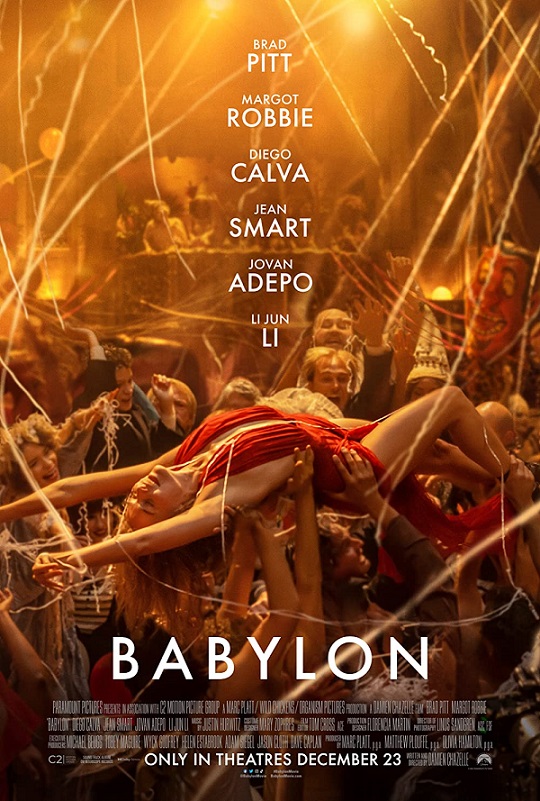
This film has a lot wrong with it, including some irritating plot turns and some annoying details. Yet it also has an immersive quality that keeps you tied to your seat as this tale of ego, excess and ambition gradually unfolds.
This is a long film, excessively so. Yet it has enough in it to keep you watching, as the action unfolds.
The chief character is Nellie LaRoy, played perfectly by Australian actress Margot Robbie. She plays an ambitious coke-snorting girl from New Jersey determined to make it big. Here, amongst the backdrop of the Californian sun in 1920s Hollywood, she is determined to make her mark.
And so she does. A natural at silent acting (this was Hollywood before the talkies) she swiftly becomes successful. However talkies are around the corner, making a difficult transition from silence to sound.
Meanwhile another of the principal characters, a fading silent star, is having trouble in the era of sound. This is Jack Conrad, played by Brad Pitt.
And now those irritating details are starting to make themselves felt. For Brad Pitt's voice is a little too loud, a little too much of a parody of the American star.
The physical details of the film are rendered so perfectly: that faux Romanesque-Moroccan style so many of stars' villas were built in is all re-created here. But despite the perfect interiors, right for the era, the bone-shaking open-topped model-T era trucks, the simple camera equipment and the cast of extras for the crowd scenes – despite all this there is something not quite right.
There was too much cocaine – shovel loads of it – at the opening party. The ridiculous scene with the elephant deliberately being given diarrhoea to make it lose weight so it could walk uphill – who thought of that?
The absurd vomiting scene when Nellie LaRoy is at the Hearsts' mansion – what on earth were the directors thinking of? The scarcely believable crime boss with his cravat and silly voice, who is owed thousands?
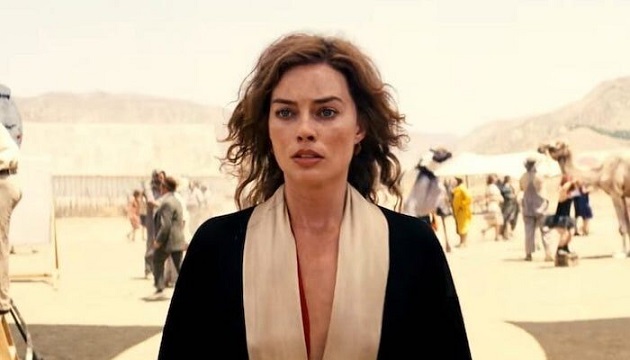
And yet this film works. The bacchanalian excess of the party scene at the beginning is compelling. Margot Robbie never puts a foot wrong – it is the scriptwriters who made the mistakes.
This film tells us many things. Chiefly perhaps that Hollywood is actually quite a toxic place. It is laced with drugs, with ambition and excess; but also with something else, a sense of transience, of how fleeting fame and success really are.
It is this realisation which brings one of the characters to his end. As Jack Conrad realises his career is over he is comforted by gossip writer Elinor St John. 'We all pass away, Jack,' she says. 'But in the future your films will still be shown. And there on the silver screen you will live for ever, as future generations come to know you.'
Yes. A little bit of wisdom in between the debauchery. This film has a sad touching quality, no more so than when a former studio executive, forced to leave Hollywood to escape the mob, returns to his old stomping ground. He has a family now, a small girl and a wife and has begun a new life in New York, where he quietly runs a radio shop.
But he can't resist returning. He stands outside the entrance to Paramount studios. All that he once knew there is gone – replaced by bigger and larger premises. And yet he knows he was once part of this – the Hollywood dream factory.

This is a tense psychological thriller, which explores the themes of control and alternative realities, in a romp of gradually increasing fear and uncertainty. This is edge-of-the seat stuff, which grips the viewer from the beginning, first with fascination, then uncertainty and then wonder, as you watch to see if anyone is going to make it out alive.
This film is set in a 1950s-style Californian housing estate, in a middle class enclave on the edge of a desert. At first this seems to be an evocation of a perfect life, of a perfect couple, at some time in the past, complete with 1950s cars, home consumer products and decorations.
The music melds perfectly into the scenes, with wonderful snatches from performers of the period, played on old-fashioned record players.
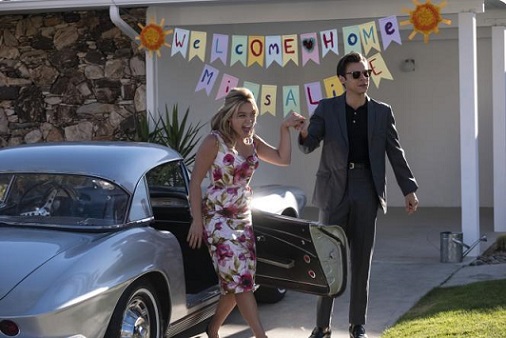
Of course not all is as it seems. This life looks too good to be true, with its wives dutifully waving goodbye to their husbands, as they drive off to work in their 1950s shark-finned cars.
But what are the husbands doing all day? What is the strange company they are all working for? And why is one of the wives not happy – not happy enough to slash her own throat, and jump off a building, only to be taken away by men in red coats?
It's all rather strange, and it gets stranger. But this film cloaks its secrets well, and you do not guess what is really going on until you are allowed to. Gradually the truth dawns, that this isn't quite the perfect reality it is meant to be.
This film has received mixed reviews, but it's hard to see why. It is clever and haunting, with rich production values and tons of authentic touches from the 1950s. It's also unusual in that the principal character is a woman, brilliantly played by Florence Pugh, who delivers a tour-de-force of acting, as first the idyllic housewife, then the inquisitive partner, and finally the desperate survivor, trying to stay one jump ahead of those men in the red suits.

This film isn't just a tight piece of well-crafted entertainment. It also raises ethical issues about the rights and wrongs of living in an alternative reality – especially if your partner never had the chance to properly consent to it.
In the medium to long-term future people might really have the option to live in a simulation of a perfect life, where the people are beautiful and the sun always shines. For the time being however we will just have to make do with the world we currently live in, with all its imperfections.
I couldn't help wondering which would be better – the real world with all its annoying trivialities, or that beautiful world this film conjures up, where there is nothing really to do, except sit on your (perfectly mown) lawn, and sip a long cool drink and talk to your neighbour. It might be pleasant for a while to visit that place – if it wasn't for the men in those red outfits. In the meantime we will just have to make do with that mundane world we currently live in – until sometimes starts a real Victory Corporation.
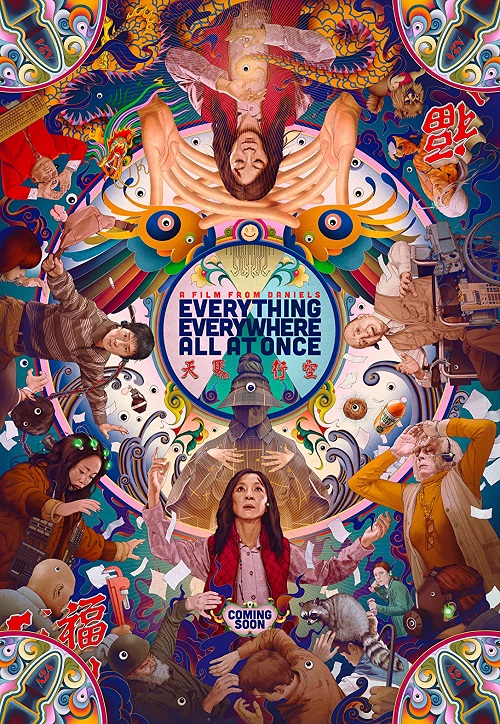
This is a long and intense film based on a ridiculous proposition. As a result you might find yourself wondering what on earth you're watching, and what it's all about.
This film takes a terrible chance. It posits the existence of multiple universes, each one only slightly different from our own. For example there is one parallel universe where the people are like us but have long bendy hot-dog style fingers (yes, really).
There is another universe with a chef controlled by a small racoon on his head, who directs all the cooking.
Yet another universe has the lead character Evelyn (played by Michelle Yeoh) as a successful film star and Kung Fu artist, instead of being the proprietor of a small and failing laundromat, which is what she is in this world, the world inhabited by the rest of us that is.
Evelyn has a husband. In this world her husband is a likable, kind nonentity. Naturally in the world where Evelyn is a film star, a close copy of her husband is a successful businessman, but she never married him.
And now you see what the point of this film is, to the extent it has any point at all. The point is that we all make choices that influence and define our future lives – but what if we had made different choices? Like Evelyn not marrying her nonentity husband and incurring the displeasure of her family? What if she had stayed in China, not married her nobody husband and moved to the USA, to open a struggling laundromat? Perhaps she would indeed have become that successful Kung Fu queen.
It's all about choices then. But that doesn't really get over the fundamental preposterousness of the main storyline, that all the other possibilities, these other might-have-been scenarios might actually exist, in some parallel range of universes.
And if they did exist, would it really be possible to jump between them? Vaulting from one world to the next, by concentrating hard, tapping some device attached to your ear, and sneezing?
Come on. It's all gone a bit too far. Naturally there's a baddy out there, a near-copy of Joy, Evelyn's just post-adolescent daughter. Joy's alter-ego is suitably nasty and has constructed a giant spinning ring-donut, composed of 'absolutely everything'. If you step into the donut you are done for, but Jay's alter ego wants to take Evelyn into it, as these worlds are only 'so much bullshit'.
Evelyn doesn't of course. She's too busy trying to stay away from or fight all the nasties that come at her in the various other worlds, some controlled by a nasty version of her frail father, who in another format is an extremely unpleasant man.
It's all so exhausting isn't it? All this fighting with super-powers, all the slow-motion Kung Fu with occasionally humorous touches. All the segwaying from one universe to another, as we struggle to work out which version of Evelyn's husband is talking to her now.

It's all too long and too laboured. Too many details and sub-plots. Too hard to follow when it's hard to care. By the time we get to the thinking rocks I really did wonder where it was all going, but by then thankfully we were nearing the end.
This film does have some things going for it. Somewhere in this is an attempt to explore mother-daughter relationships, and the place of elders in modern Chinese communities. There are moments when this film works, and Michelle Yeoh has done a commendable job in holding this pile of poop together; but ultimately this film is a piece of nonsense which is far too long, far too tedious and far too grating on the nerves for anyone to want to see.
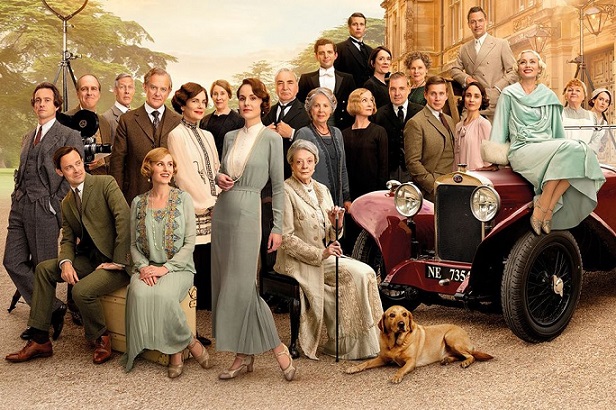
If the intricacies of the idle rich interest you, supported by a cast of flunkeys downstairs, in a period drama which creaks and wobbles like an old drunk man on a bicycle, this is the film for you.
Don't blame the actors though. Julian Fellowes is the real culprit here. His dialogue is sometimes atrocious, sometimes completely out of context for the late 1920s, and sometimes simply boring. Bearing all this in mind this film is bound to be a smash hit, just like the last one.
So what's the secret? Making actors say lines that are unnatural, too formal or not-quite-right? Forgetting the time and place? No. The secret is to find a country house with rich gothic features and hire plenty of open-topped cars.
Make sure the sun never stops shining on closely mown lawns. Let art deco dresses flap gently in the wind. Employ cut-glass accents for cut-glass roles, like Michelle Dockery as Lady Mary Crawley, who to be fair does the best she could with the script.
Get the physical details right. Get the 1920s charabancs lined up. Get the bowler hats and the coat tails for the monstrous Charles Carson, the head of the below-stairs staff, the biggest snob of them all.
And what about the plot? The affair years ago that might or might not have grave implications for Robert Crawley, the Earl of Grantham. Can it be that in fact he is illegitimate?
Let's not spoil it. Perhaps you care whether the Countess of Grantham had a fling all those years ago, putting into doubt the paternity of her son, the Earl of Grantham, with all that that means, for whom should have really inherited the title.
Perhaps the sub-plots interest you, the pleasingly stupid waiting and serving staff, who at least work for a living, unlike their masters. Perhaps their flirtations and courting are interesting to you, if you can go along with this make-believe world.
All this has been done much better elsewhere, for example in the 1970s series 'Upstairs Downstairs' which set the gold standard for this kind of thing. But I very much doubt if Julian Fellowes cares. He knows he's on to a good thing, and so do the makers of this film. If it's anything like the last one it's going to be a smash hit, and if that's the case who cares?
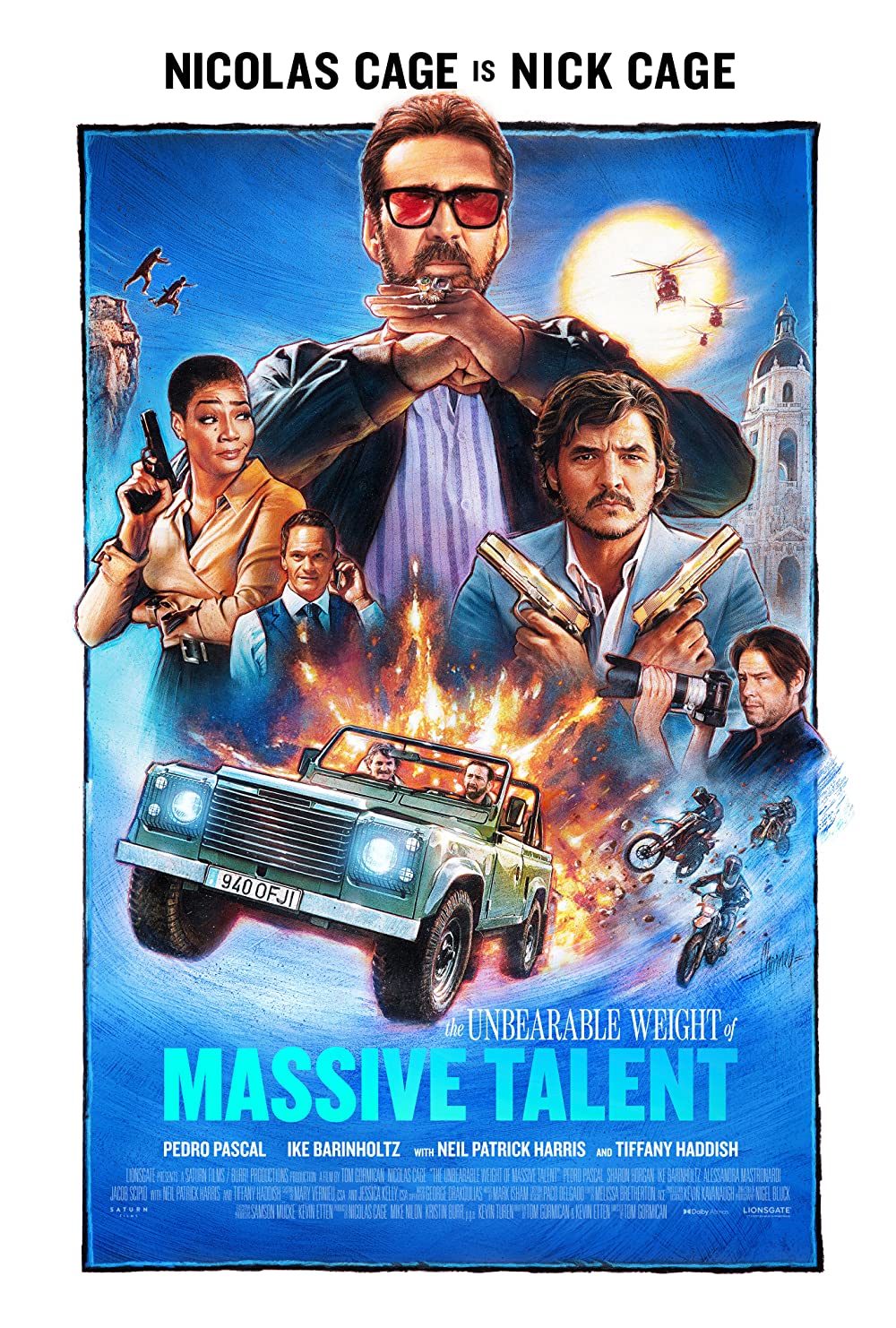
This film is a brilliant satire on Hollywood film-making. It will have you wincing with laughter as it recycles every Hollywood cliche, in a brilliant spoof of every buddy movie, every chase film and every kidnapping sequence you have ever seen.
The vehicle all this finely worked fun is an aging star, slightly past his best, who still thinks he has got one more great film in him. This person is of course Nicholas Cage, the eponymous star of our film.
He is invited to Majorca in Spain, to be the guest of a wealthy olive grower, who is a great fan of his films. Our olive growing entrepreneur is suitably Iberian in looks and style, and for a while it simply looks like our aging star is going to be a guest of our Spanish tycoon, ensconced in his vast villa, outside of downtown Majorca.
But now the plot thickens. It turns out that actually this olive growing tycoon has written a film script, which he would like Nickolas Cage to read. Next thing we know he is acting out parts in it, and Nicholas Cage decides to humour his friend, by going along with these absurd charades.
Soon they are pretending to be chased, to be watched and they must get away – anyhow. They dive off cliffs, crash cars, all the while sending up every Hollywood cliche of two buddies trying to survive.
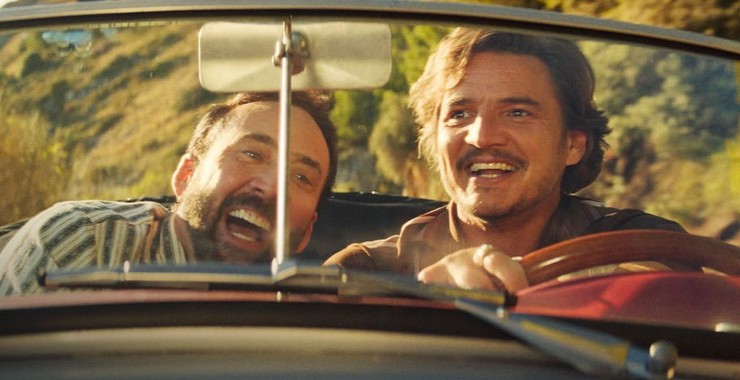
They swop film ideas, how the film will actually work. It will feature a friendship – similar to this one – about two guys against the world. They hate triviality, talking about profundity, in a superb send-up of the process of barnstorming a Hollywood film.
Now the film takes another turn. An American law enforcement team tell Nicolas Cage that actually his new-found friend is in fact a drugs baron, an international narcotics dealer. His men have kidnapped the daughter of the governor of Catalonia, in order to get him to stand down in favour of their preferred candidate.
Now Nicolas Cage is working for the US government. He must use his new-found friendship to discover where the missing girl is. He must play along with the ridiculous plot-playing antics of his friend, as they swerve about in cars taking LSD, while simultaneously trying to work out the location of the missing girl.
And now we come to what make this film so clever. It is effectively a film-within-a-film. Now, as they talk to each other, neither protagonist knows how much the other really knows about the other. Are they still just joshing and japing, working on film ideas, just pretending, or in fact will one of them kill the other, as they both endeavour to survive?
Cue some wonderful face-off sequences, as they point guns at each other, while simultaneously proclaiming their love for each other. There are some wonderful vignettes here. The shoe-changing scene before the final face-off is particularly mirth-inducing.
This is finely woven and brilliant stuff. Nicholas Cage plays himself playing an undercover agent, not sure if his cover is blown, and therefore acting as though he isn't acting. It's all very, very good.
He is supported perfectly by Sharon Horgan, who plays his ex-wife, and Pedro Pascal, who gives a masterful performance as Javi Gutierrez, the olive grower. All in all this is a wonderful and cerebral comedy which proves you don't need big sets and vast special effects to make something which is funny, entertaining and wise.
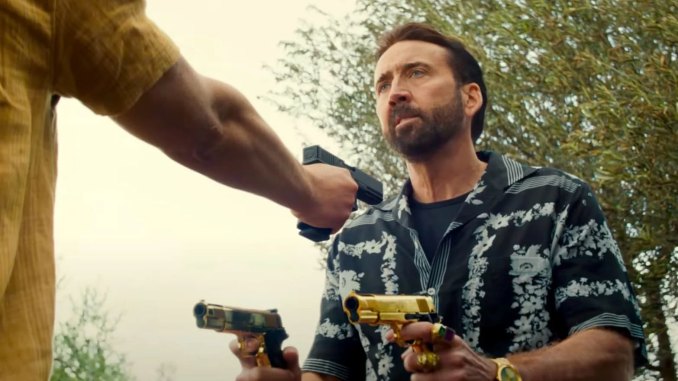

This film clunks jerkily along, with a lot of things which aren't quite right. It is worth watching and is genuinely funny, but you can't help feeling that it might have been a whole lot better.
Sandra Bullock has been funnier and more convincing in other films. (She has also got a bit too old for this kind of part, but we'll come to that later.)
Channing Tatum however is perfect as the gormless hunk hired by the publishers of Sandra Bullock's character's books, as the real-life incarnation of her fictional hero Dash, the stereotypical lead of her best-selling romantic fiction.
Actually Sandra Bullock's character (Loretta Sage) has become rather bored with her own writing, and especially with Channing Tatum's physical incarnation as her literary creation Dash; however for the sake of her book sales she goes along with her publisher's demands that she does a promo tour with him, answering mind-numbingly stupid questions from gormless groupies.
Things become more complicated when Loretta Sage is effectively kidnapped by a mad billionaire who wants to use her knowledge of pictographical languages to try to locate a hoard of treasure, on an island somewhere in the equatorial Atlantic.
Naturally Dash (Channing Tatum) ends up there too, and it isn't long before they both escape the clutches of our mad and suitably unpleasant billionaire Abigail Fairfax (played by Daniel Radcliffe).
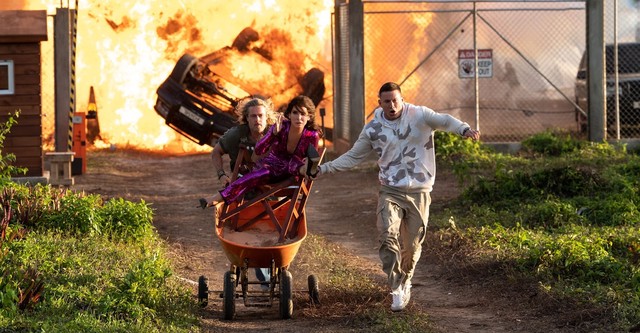
Now they are in the jungle: Loretta Sage in her ridiculous turquoise jump-suit, and the physical embodiment of her own literary creation Dash, played by Channing Tatum.
The gag of course is that Channing Tatum isn't Dash. He doesn't know what to do in every situation. He isn't an expert in unarmed combat, nor in survival skills, or jungle survival, despite the fact they are actually in a jungle and very definitely in need of survival skills, as they are hunted by the suitably dastardly minions of our nasty billionaire.
And so the scene is set: the stage is now clear for a lot of comic banter, as our two no-hopers desperately try to stay alive in the jungle, without any clue as to what they are actually doing.
It's obvious that Loretta Sage will gradually come to terms with the physical embodiment of her own writing – Dash, or actually not Dash, but a man who looks like him but isn't really him at all.
But now we come to one of the problems with this film: that Sandra Bullock is getting a little bit too old for this kind of part. Those cheeks are looking awfully hollow these days, and she looks more like Channing Tatum's mother than a potential lover.
Channing Tatum by contrast is absolutely ripped. I have seldom seen a six-pack do so much acting. But the mismatch between these two goes a long way to robbing this film of the believability it might otherwise have had.
There are plenty of mirth-inducing moments however, and this film is worth watching; but you can't help feeling that the producers of this film didn't get it quite right.
There are too many cliches, too many overdone plot turns, too many stereotypes littered throughout this film; with just a little more effort and a bit more fine tuning, the makers of this film might have produced something much more memorable.

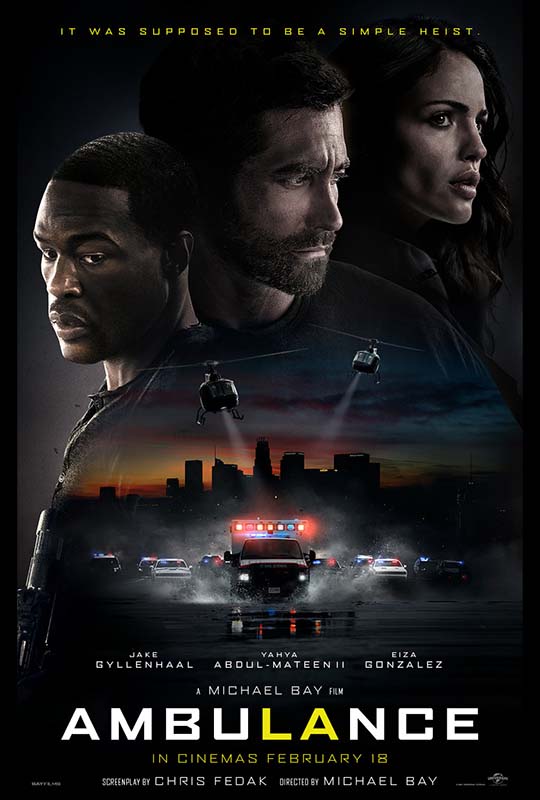
Ambulance is an adrenalin-fueled chase movie in which the action never stops. The pace is frenetic, almost from the beginning, and you will find yourself glued to the screen, unable to look away, in case you miss the next multiple pile-up or near-catastrophe.
However this film is far more than just a series of high-speed stunts involving a hijacked ambulance. This is a story here, with a developing narrative, as our two anti-heroes gradually make friends with the trapped paramedic in the back, who is tending to an injured policeman.
The dynamic of the relationship between the two main characters (one of them is black, the other white) is tested to the full, as they are forced to make decisions on the fly as they try to lose the police.
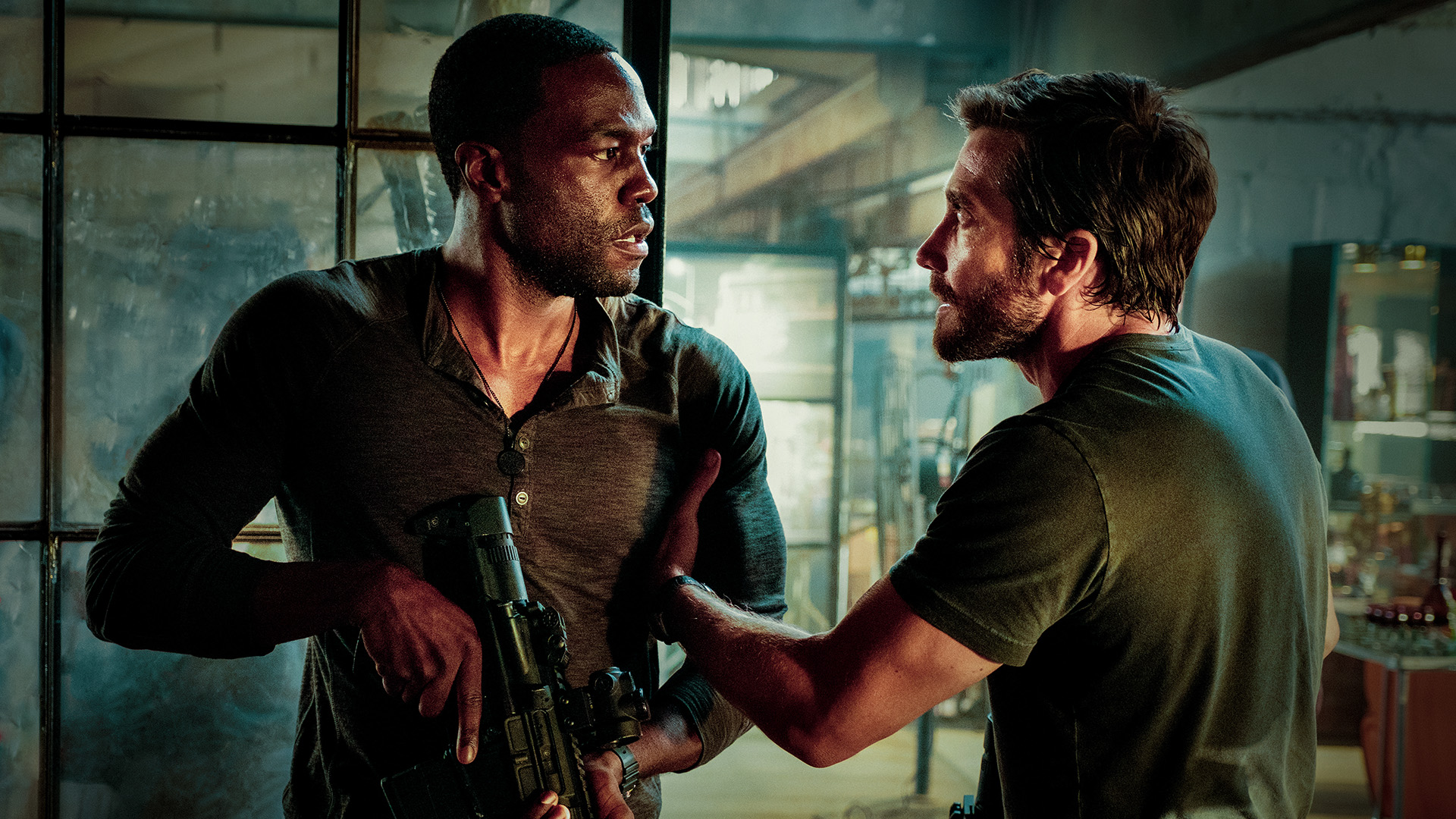
They were initially part of a much larger gang, who robbed a bank in central Los Angeles of $30M, but the raid was known to the police, whose SIS (Special Investigation Service) have staked out the place in advance, and who kill the other gang members at the scene. However Will, the black man (and former marine) and his white buddy escape in the ambulance, whereupon they discover the paramedic in the back (played by Eliza Gonzalez) and the injured policeman.
Being pursued by the police, with sirens, helicopters and swat teams in tow, the two men must now make fast decisions. The white guy, played by Jake Gyllenhaal, who plays Danny, takes it in turns to drive the ambulance, while Will uses his marines training to help the paramedic keep the wounded man in the back alive.
And now we come to what make this film so memorable: the tension is not just in whether or not they can keep the speeding ambulance on the road; there is also the question of whether they can save the injured man's life.
Obviously, a few short cuts have been taken with reality here. It would be quite impossible for a paramedic with no training to extract a bullet from someone's stomach without any specialist equipment – but naturally they do, at speed, as the ambulance somehow keeps from crashing.
But there are other things which keep this film interesting: the fact that Will is only doing this in the first place because his wife needs an expensive operation; the fact that the two guys are actually adoptive brothers. (Will was brought up by Danny's father).
There is the realistic way in which Danny genuinely attempts to use reason to get what he wants; but above all there is that most intriguing of all things, the sense of some special bond between the paramedic, played by Eliza Gonzalez and Will.
Was it the medical training? Was it the wish to survive? Was it the insanity of all this which suddenly threw them together and allowed them to create an understanding, despite all this?
This is a many layered film. Part chase move, part exploration of relationships and bonding under pressure, this film weaves its multiple complexities so convincingly that the two-and-a-quarter hours it lasts seems to be gone in a flash.
If you want high-speed action, but also adrenalin-charged relationships and life-or-death decision making, plus a fine performance from a distinguished woman actor like Eliza Gonzalez, then look no further: this is the film for you.
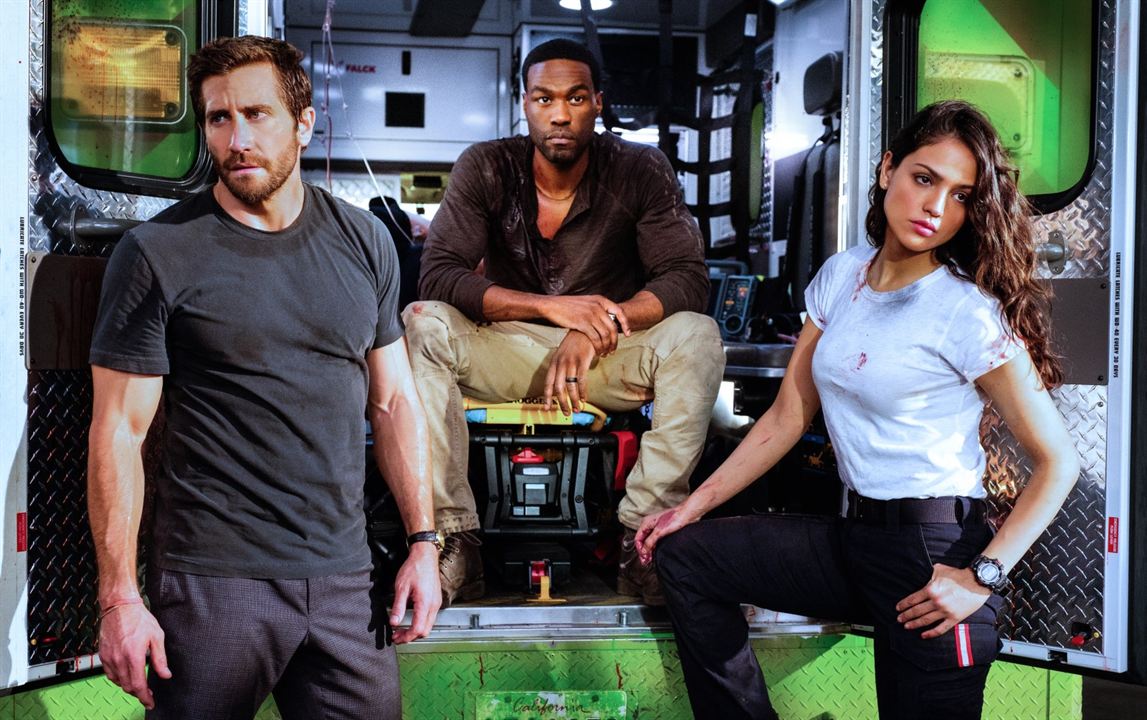
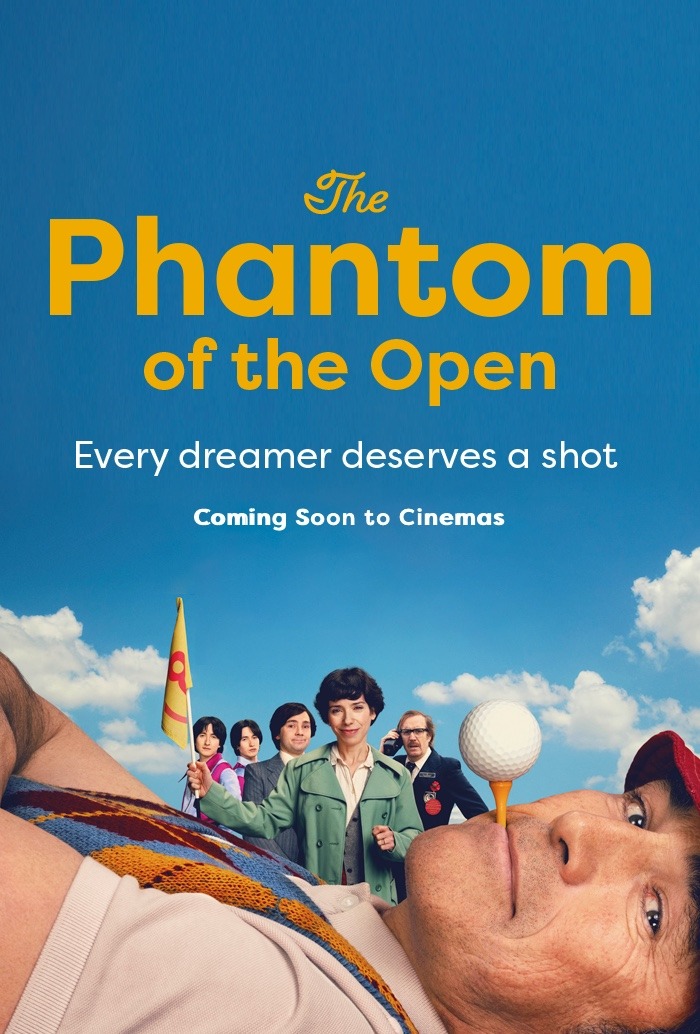
This film is a comedy-drama about a man who became known as the world's worst golfer, despite him not liking that sobriquet.
It is the story of one man's dreams and his refusal to admit that he had almost nothing going for him, and in so doing he became a minor sensation at the British Open qualifying event of 1976. It was there that he shot the highest ever round for a qualifying tournament, making him an instant celebrity.
This film tells the story of that man, Maurice Flitcroft. What is most amazing is that he was never put off by his own lack of talent. His mediocrity never bothered him, and the negligence of the golfing authorities in not scrutinising his application properly allowed him to pitch up and play – but without all his clubs. From that moment on, his fame – or notoriety – was assured.
The story is made even more remarkable because of Maurice Flitcroft's background. He was a crane operator and shipyard worker in Barrow-In -Furness, a rugged shipbuilding town in Cumbria. In his forties, he was suddenly inspired to enter the British Golf Open, despite knowing almost nothing about the game.
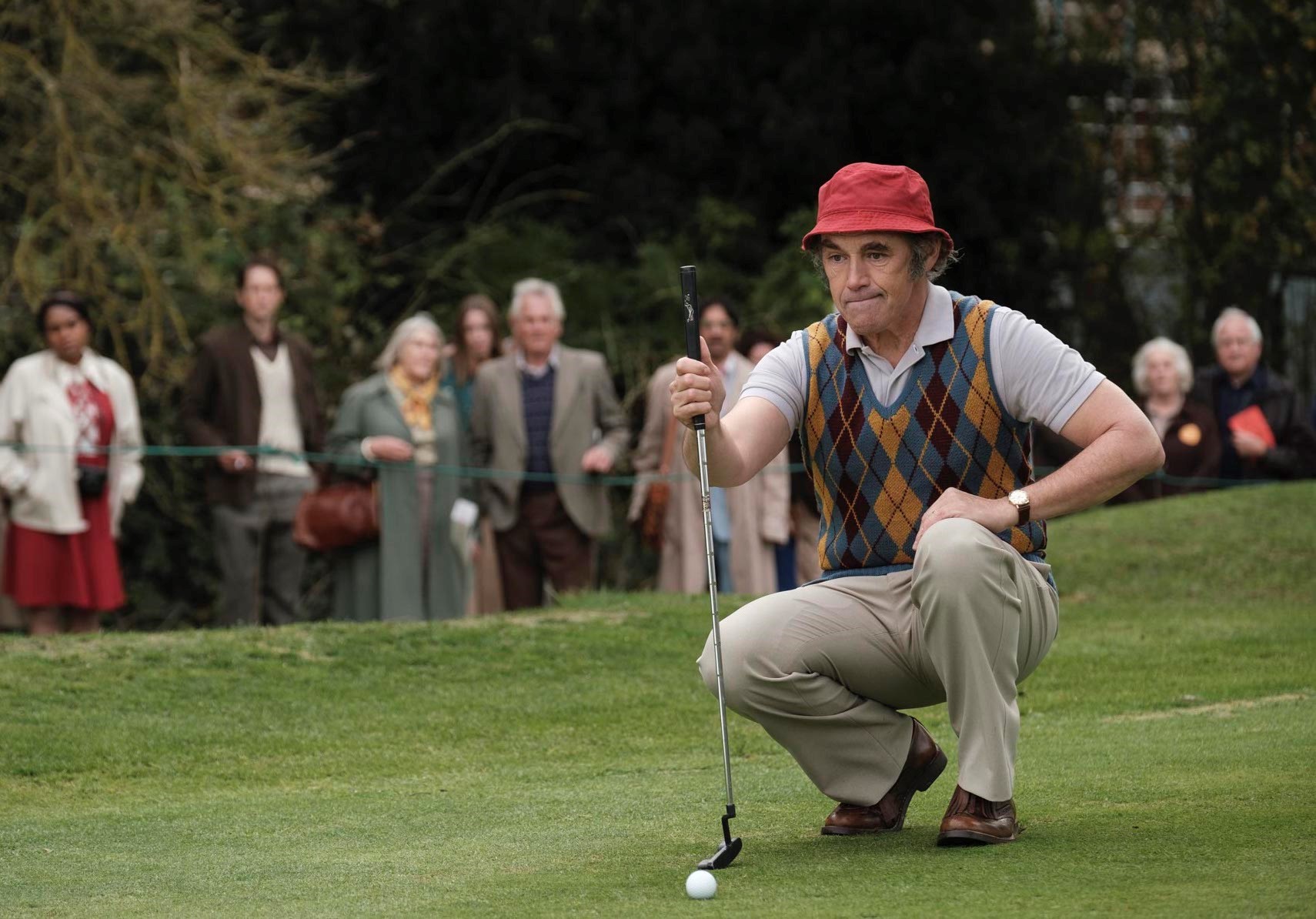
Practicing on a windswept beach and using only the cheapest of clubs, Maurice Flitcroft unsurprisingly posted the highest ever score at a qualifying event in a professional tournament. But this did not faze him. Instead the crowd seemed to take to this no-hoper, applauding wildly when he actually made the green with his first shot on the eighteenth.
The golfing authorities took a dimmer view, barring him from all golf courses nationally, but it hardly seemed to matter: Maurice Flitcroft had arrived.
His celebrity grew. He was eventually invited to America, to participate in a tournament named after him, for people who were not very good at the game. Yet Maruice Flitcroft always bridled at the suggestion that he was the world's worst golfer, and was not prepared to accept this appellation.
All this is portrayed wonderfully by Mark Rylance, who has once again produced a masterful performance. Time and again you are amazed at Maurice Flitcroft's inability to accept reality – that he was simply a terrible golfer. He went on and on, entering the British Open under various names and disguises, causing ructions throughout the golf establishment.
The film has taken liberties with the truth. It has produced an air-brushed lavender-scented account of his life. But such is the quality of Mark Rylance's performance, and that of Sally Hawkins as his wife, that it is not long before you will be half-crying, half-laughing at this wonderful portrayal of that greatest of institutions: the great British loser. 1970s touches abound, including flared trousers, sideburns and even a mark 3 Cortina. For those old enough to remember them the first time round, this film is an absolute must.
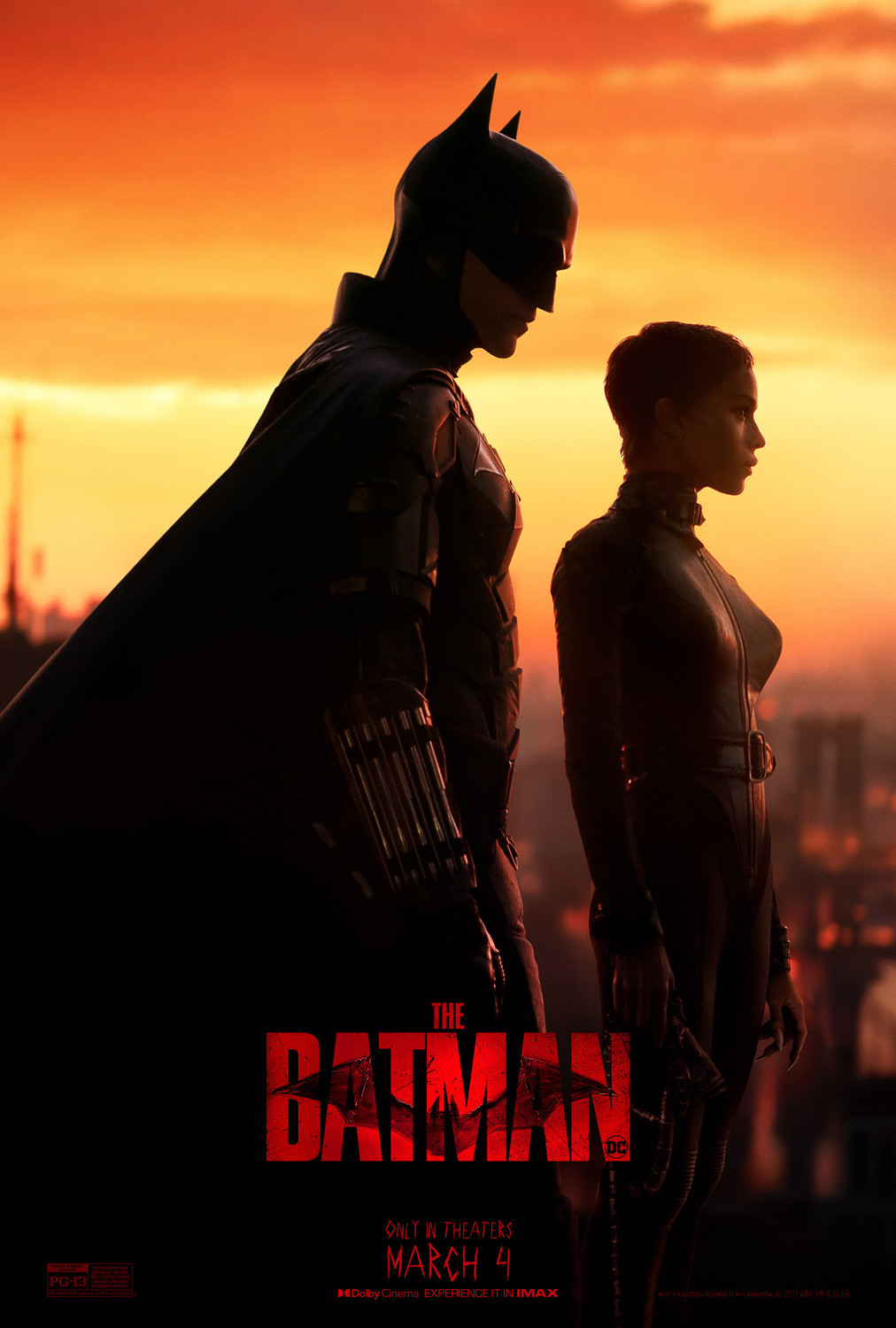
'The Batman' is a gripping and riveting adaptation of the Batman franchise, with more than enough to keep you interested for just under three hours.
This film portrays Batman as far more than just the normal cardboard cut-out we see in that famous Bat-suit. Here we get access to Batman's inner self – and yes – even self-doubt.
Love interest is provided by the leather-suited Catwoman, convincingly played by Zoe Kravitz. She is the perfect counterpoint to our suited hero, part high-kicking and gravity-defying heroine, but also capable of sharing tender moments with the caped crusader.
Gotham itself is brilliantly rendered in the background: a dangerous crime-ridden metropolis where it always rains, where bright summer days do not exist, and where crime and violence are always just around the corner. It is against this background that Bruce Wayne must investigate the murder of the city mayor and then the commissioner, all the time finding clues left at the crime scenes by The Riddler. But who is The Riddler, and why is he so angry?
We follow Batman on his investigative path, as he homes in on his enemy. (This is a new direction for a Batman film. There is normally very little sleuthing for the caped crusader; but here it is a major part of the film.)
We visit a seedy nightclub run by The Penguin (played perfectly by Colin Farrell). Here our superhero meets Selina Kyle, who turns out to lead a double life as Catwoman, who comes and goes in Batman's personal and professional life.
Lots of blind alleys and dead-ends ensue. A combination of guesswork and hunches and riddle-solving eventually leads us to the dastardly Riddler, but by then his plan is already set; and so we reach the finale, which teaches Batman that even for superheroes life seldom goes entirely as you expect.
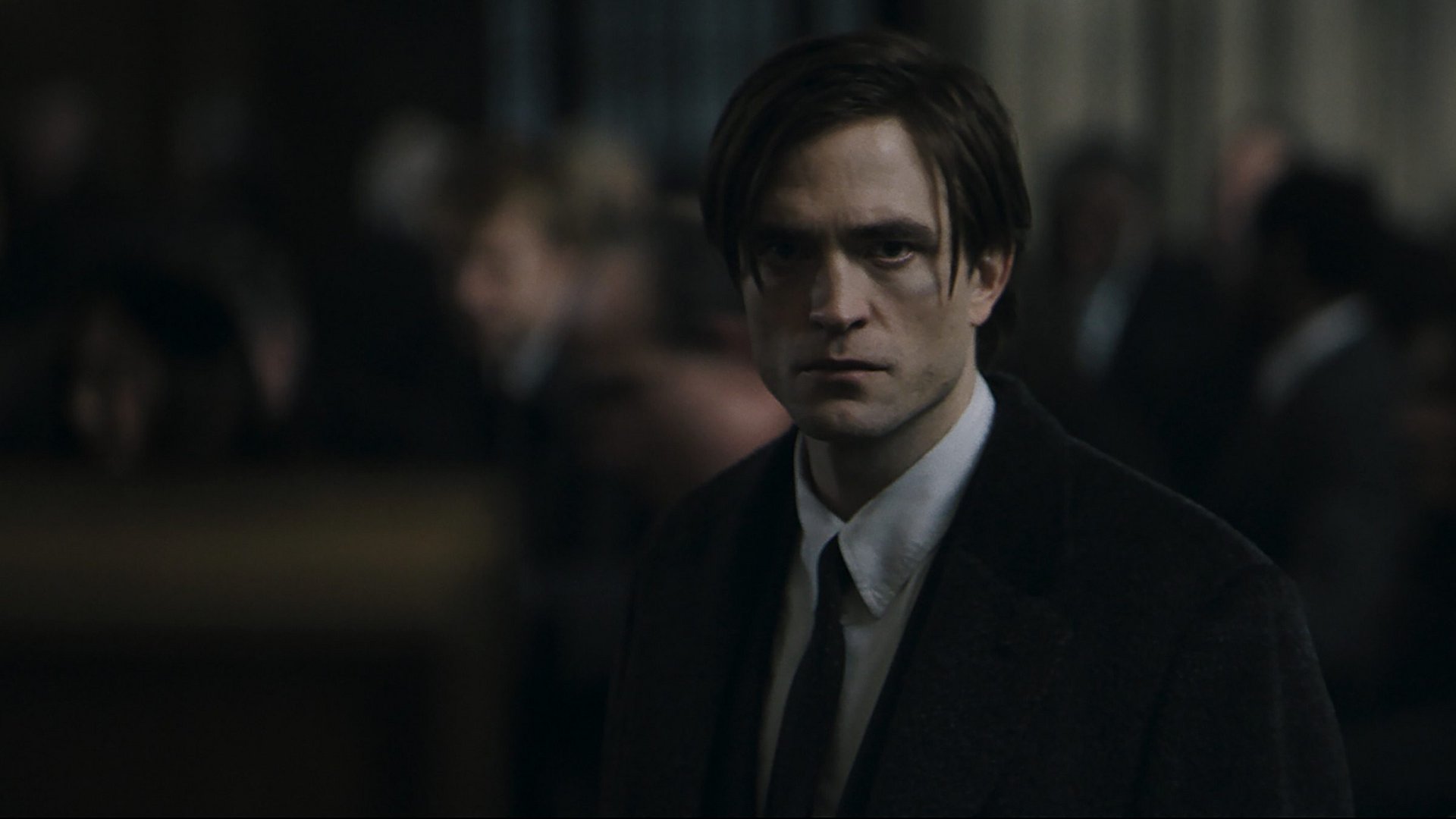
This is Batman set to a different beat. Here Batman often speaks in the first person, aloud to himself. This allows us to see into his mind, into his own personal search for truth. 'I am vengeance, he says' - but vengeance is not enough. He is a man as well as a superhero, who learns difficult things about his parents, who were not quite as pure as he thought.
The makers of this film have taken a tremendous chance with the way they have made it, but it has paid off. There is enough psychological depth to Robert Pattinson's portrayal of Batman to make this film interesting, despite its length. By portraying him as partially flawed, in a noire-ish setting, amid the backdrop of a crime-ridden city, they have produced a gripping film accompanied by a rousing musical score. At no point does the tension decrease, despite its length, and you won't be nipping off to the bathroom in case you miss the next turn in this minor cinematic epic.
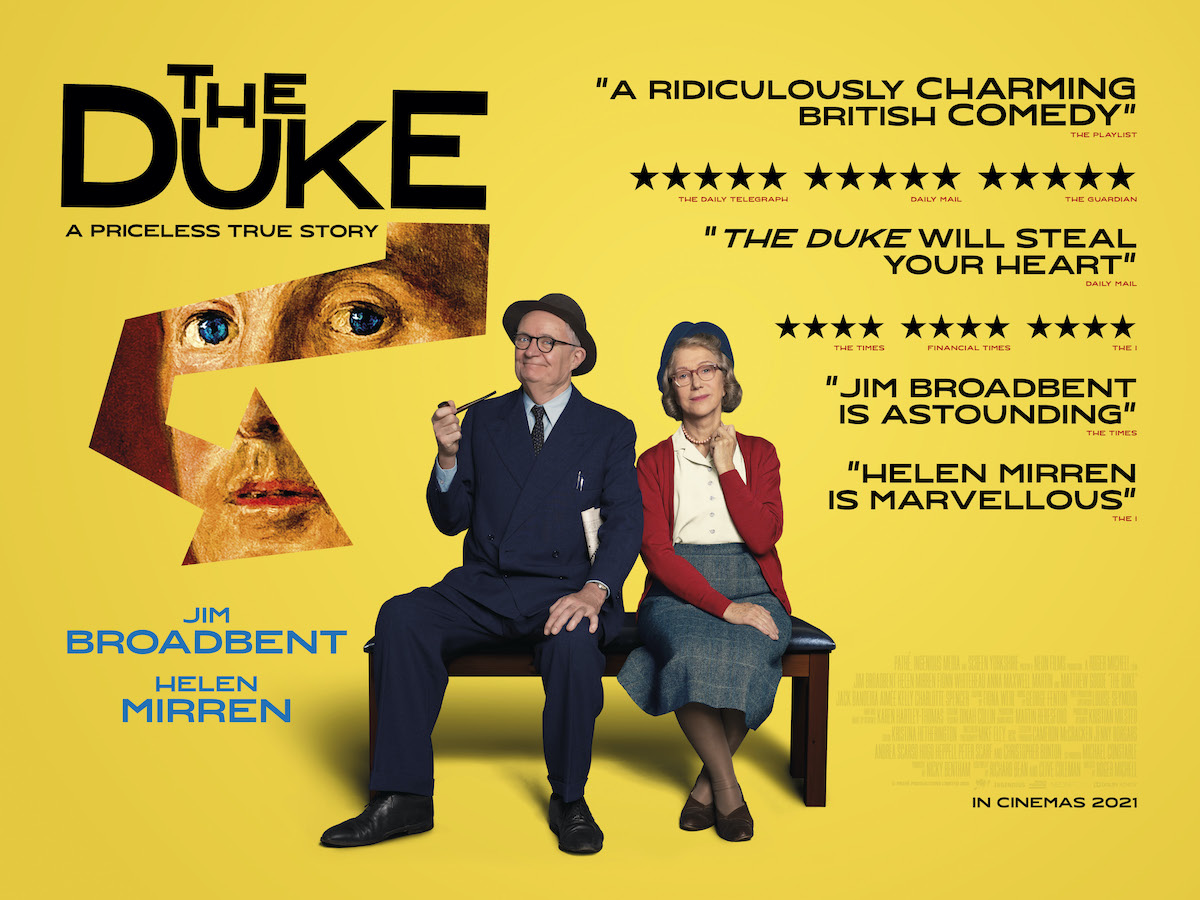
This film tries to be funny, witty and charming, but it doesn't quite succeed.
This film tells the story of Kempton Bunton, a self-taught Geordie socialist and campaigner for pensioners' rights, who stole a famous picture from the National Gallery in London. He intended to raffle the picture back to the authorities for a fee, which he intended to distribute to the poor of his native North-East.
So far so good. A modern Robin Hood, complete with Geordie accent and working-class Sunday best, taking on the establishment and winning.
The problem is that the Robin Hood in question, Kempton Bunton (played by Jim Broadbent) is so difficult to like. He comes across as a cantankerous bore, a tedious man who has decided that he is right and everyone else is wrong, including his long-suffering wife. He has the right values, and that entitles him to not pay his TV licence, on the grounds that quite a lot of other people find it hard to pay too. Noble perhaps, but also a bit of a bore for everyone else, including the TV licencing authorities, who eventually get him locked up for 13 days.
Naturally he emerges from Durham jail looking rather pleased with himself. His son Jackie is waiting for him - waiting to take him back to his wife.
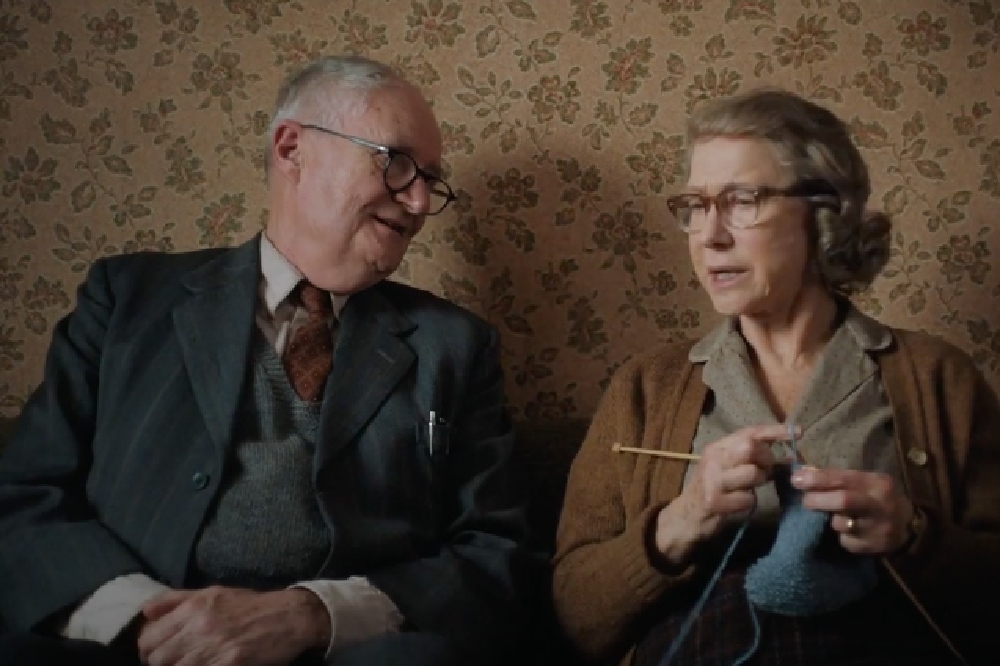
And now we come to another problem with this film: his relationship with his spouse. Could anyone really have put up with this man with his cod-politics and his incessant lying hidden behind those cheerful aphorisms? His deviousness, in concealing the fact that he has stolen a world famous painting even from his own wife? His wife is played by Helen Mirren, who is excellent in thrillers, black comedies and playing the Queen, but who can't do working-class quite so well. Not only that, but Geordie working-class? Now that really is a big ask.
There are other problems with this film. The swearing for example, which doesn't sit well with this kind of genre, with its echoes of gentler times, and of Ealing Comedies. Then there are the script mistakes, like when Kempton Bunton talks of 'speaking truth to power'. No one in early 1960s Geordie-land ever did that.
There are some convincing touches: the dreaded and ubiquitous electric water heater hanging preciously in the kitchen; the shire horse pulling the rag-and-bone cart in the background; the skid-lid crash helmets worn by his son Jackie and his girl when they go on a date on his motorcycle.
But for most of this film there is a sense of it trying and not quite succeeding; of not quite being that stirring and witty homage to a man who was frankly a bit of a bore, in a domestic relationship that hasn't been properly imagined; and indeed it is no surprise that only in the courtroom sequences at the Old Baily at the end, when Helen Mirren is safely out of the way, does this film finally come to life – but by then it is far too late.
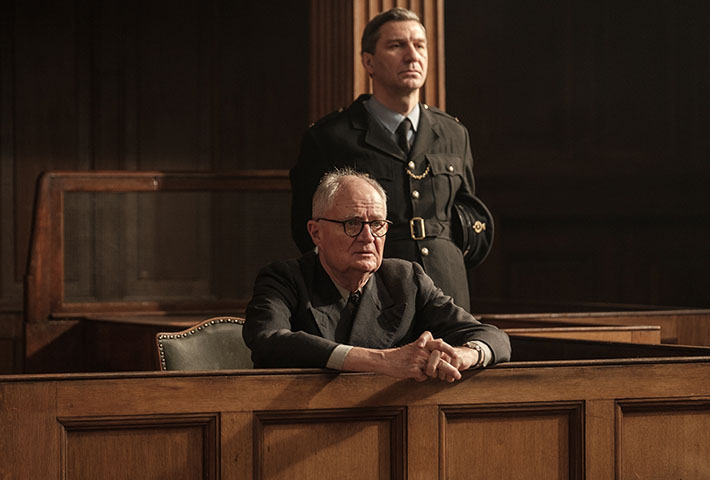

This is an astonishing and gripping film, all the more so as almost all the action takes place in a single location, a red-light district of post-independence Bombay.
Such a location would hardly seem to be the ideal place for a minor classic, but that is exactly what this film is. It is by turns mesmerising, gripping and heart-stopping, and even on occasions funny, as we follow the fortunes of a 16 year-old girl sold into sexual slavery.
The first twenty minutes of this film are utterly compelling. A young girl, seduced by dreams of Bollywood stardom, leaves her affluent family in Kathiawad, onboard a train bound for Bombay. Little does she realise what is in store: her boyfriend sells her into a brothel for a thousand rupees, and her life is changed for ever.
The sheer awfulness of all this is brought home in astonishing intensity, as she meets her brothel madame for the first time, played by the brilliant Seema Pahwa, who depicts a flesh-creepingly corpulent brothel keeper who explains the facts of her new life. 'Submit to men and do it willingly,' she is told, 'Or there are some who will pay more to take it from you.'
And so her new life begins. This part of the film is almost unbearably compelling. Ganga does of course submit, and becomes a seasoned member of the brothel.
It is not long however before her spirit of defiance and independence makes itself known. This is no ordinary prostitute, you feel. There is something special about this girl who will go far.
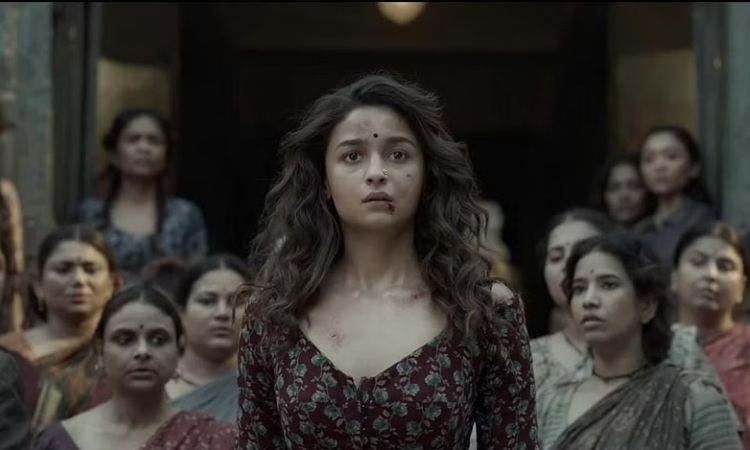
And so it proves. The old brothel madame expires, a beached whale of a woman, marooned at last on her deathbed. Gangu now becomes Gangubai, the suffix indicating her new seniority. She takes on the brothel, ending the selfish and unreasonable behaviour of her predecessor. She runs the brothel for the women, of the women and by the women, and naturally they love it.
It's not long before Gangubai has won the elections for this particular district of Bombay. Attempts to shut down the area, raids by the corrupt police - all these things are dealt with adroitly and cleverly by the well-connected Gangubai, who can quite literally bring the local police chief to his knees.
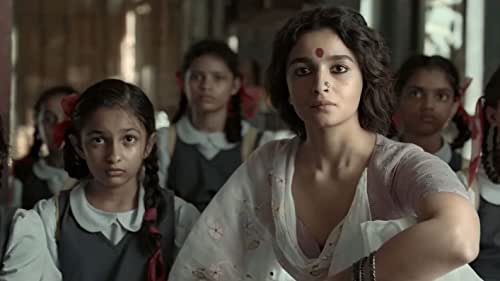
Her fame spreads. Journalists write about her, photograph her, and she is invited to speak at a rally on women's rights. She pleads for the rights of the children of prostitutes to receive an education. She even meets Nehru, the then Prime Minister of India, who for some reason has his hat on indoors, when he meets her.
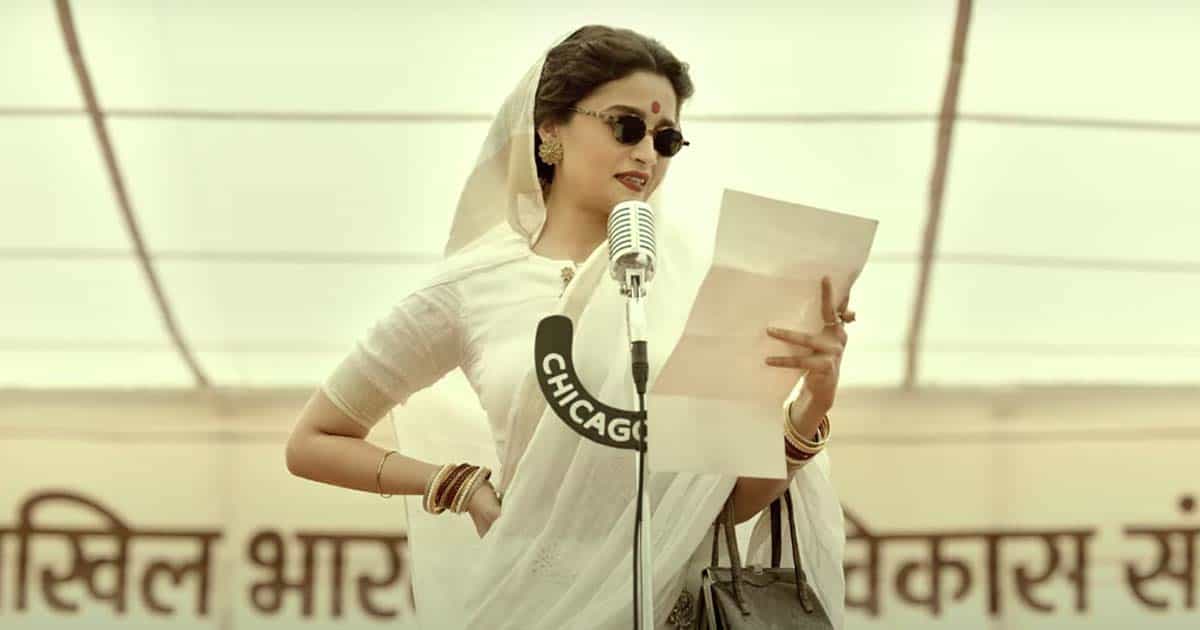
Naturally as a Hindi film there must be some dance sequences, accompanied by songs. Also her criminal dealings are only dwelt upon lightly. But what really makes this film work is the outstanding performance of Alia Bhatt as Gangubai. She utterly commands the role, never allowing you to get tired of her in all those close-ups. This really is a tour-de-force by a talented and brilliant cast, about a difficult subject. You will walk out amazed and uplifted, and thanking God you have bever been sold for a thousand rupees into the greasy palms of that brothel madame played so convincingly by Seema Pahwa.
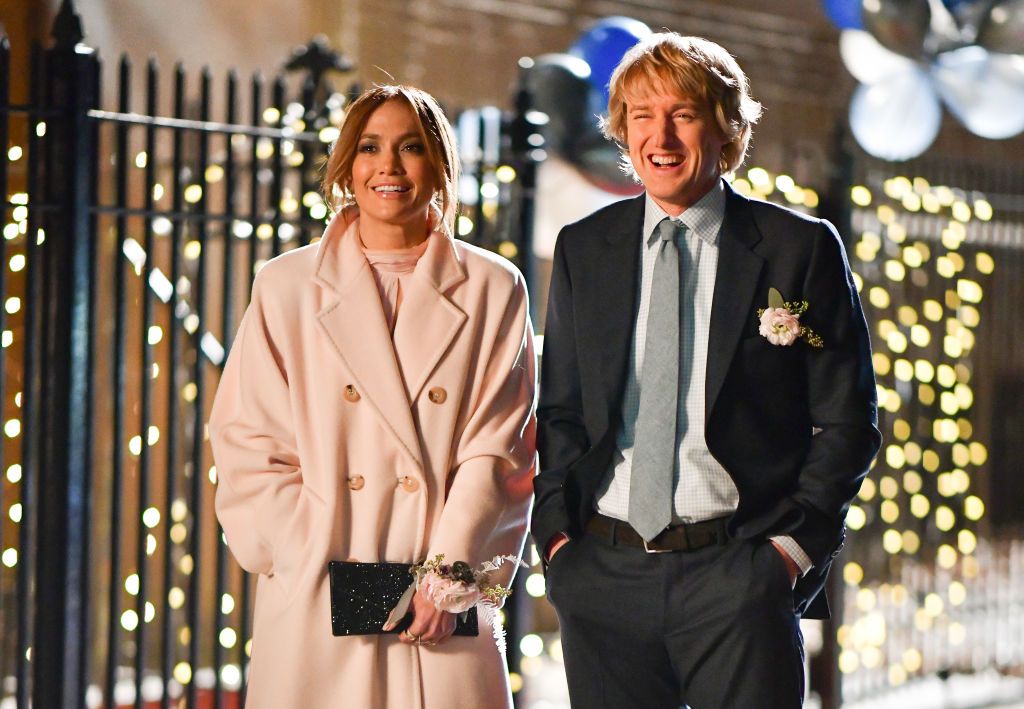
Jennifer Lopez has been in many films over the last twenty-five years. Yet she has never really matched her singing success with her on-screen performances. Looking at this film, it's not hard to see why.
The main problem with this film is that it is simply absurd. A Latino singer, at the top of her career, able to perform to vast audiences, falls in love with a maths teacher at a public school in New York.
Yes, that's right. A maths teacher, who happens to be divorced, straight and with a big hole in his life to be filled by – yes you've guessed it – the Latino singer.
What's the means by which they meet? A clever conjunction? Both stuck in a lift, where some sharp dialogue kindles the beginning of something special? A shared taxi perhaps, or a chance meeting? Oh no. Our maths teacher goes to a concert (egged on by his daughter and a work colleague) where he is given a placard saying 'marry me'. Clever eh? Very sophisticated. Naturally Jennifer Lopez's character Kat Valdez sees the placard, held by a man she has never met, and decides to do just that.
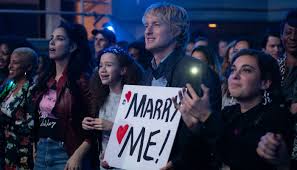
Of course it's only a stunt. But Kat Valdez decides to let it ride for a while, decides she actually likes this quiet, softly spoken maths teacher with a check shirt and a cardigan – and hey presto! They're in love.
Naturally his maths club students go nuts when they find out their teacher is dating one of the most famous Latino singing stars in the world. There's a lot of dancing, booty-waving and all-round romping, as Kat Valdez does an impromptu gig at the school dance.
It's not all bad. Occasionally the schmaltz passes long enough for you to smile, but this feels too laboured, too obvious and too predictable. There's nothing wrong with Jennifer Lopez's acting, but her choice of plot and script is atrocious.
Even the demeanour of Owen Wilson as Charlie Gilbert the maths teacher seems off-key. He seems too hesitant, too conscious of himself, to have any real connection with Jennifer Lopez's character. Perhaps he didn't think the film was a good idea either.
Perhaps the most interesting thing about this film is its portrayal of the vacuous world of celebrity: a world of hovering security men, blacked-out limousines and obsessive attention to social media, with how many thousands (or millions) of followers you have got. The endless posing and selfies, the chasing of ever more money through endorsements and commercials when you already have wealth beyond the dreams of avarice. It's a world which seems attractive to some people – but at least our maths teacher has the sense to walk away from it.
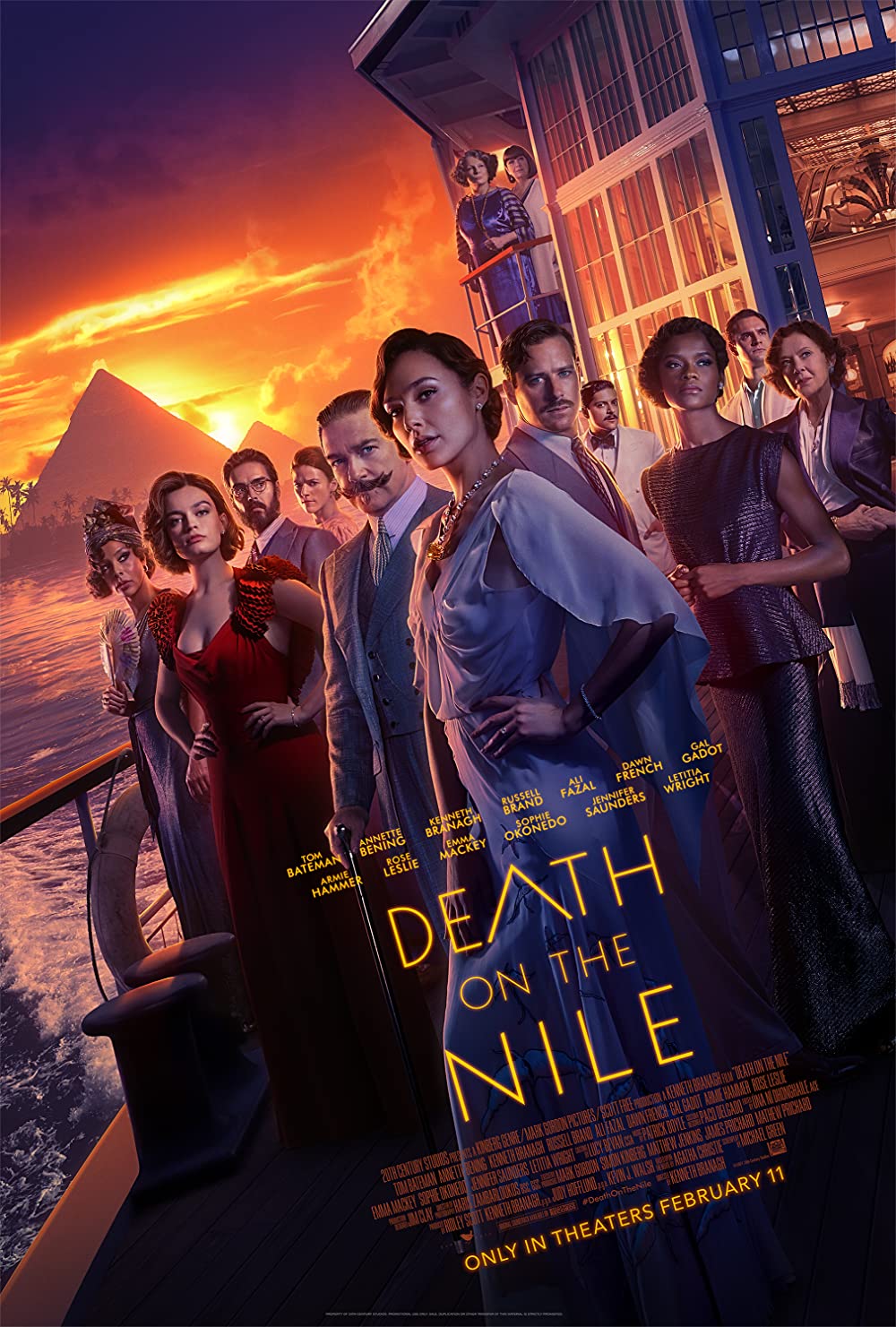
A wealthy heiress marries a handsome man and takes her on a honeymoon, on a river-boat on the Nile, visiting antiquities along the way.
A former lover of the groom also boards the boat, angry and bitter. She makes clear her displeasure at this new match and does all she can to spoil it; but is she really responsible for the terrible murder of the heiress, found dead from a single bullet wound in her bedroom?
Other deaths follow, of the heiress's maid, and then the man who witnesses her murder – that makes three in a row – but no problem, for the famed Hercule Poirot just happens to be on the case.
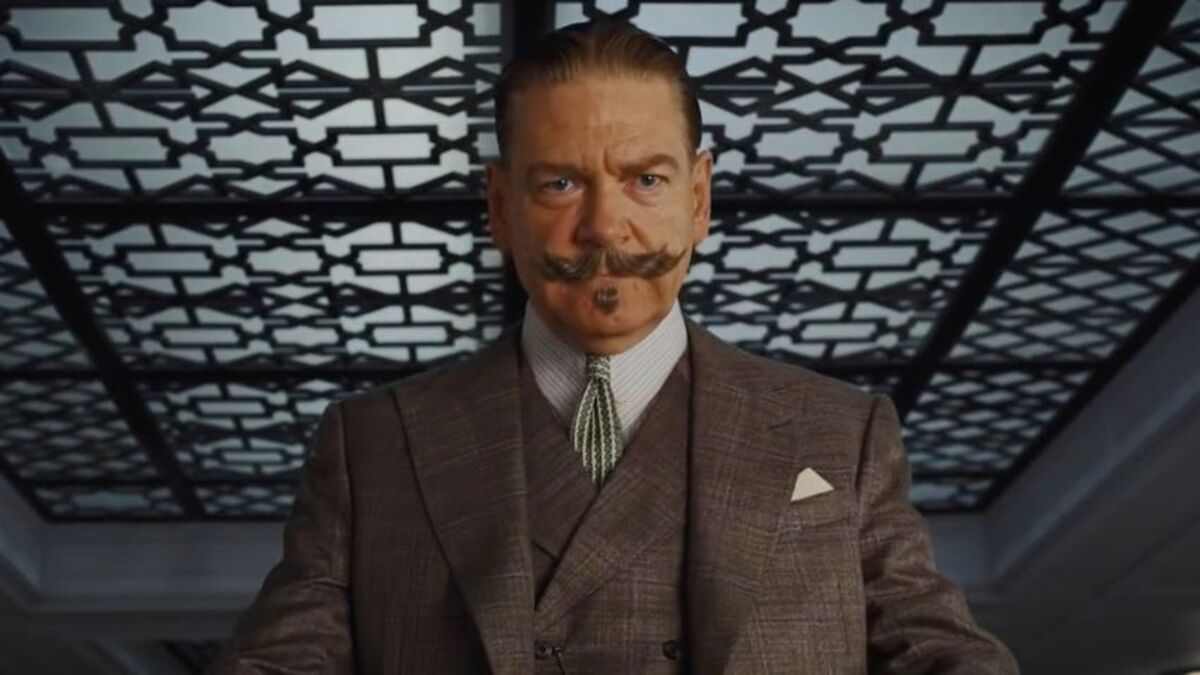
There is no doubt the murderer will be found, amongst this motley group of other former lovers, admirers and jazz musicians – but who? And this is the real problem with Agatha Christie: that only Hercule Poirot can join the dots. You may have your suspicions, amongst this cast so cleverly and ominously portrayed; but only our moustachioed wonder can really find the answers.
Until then we have to wait. We have to wait until Kenneth Branagh, in a fairly reasonable Belgian accent, finally reveals all at the end. Then there is a torrent of information, of answers, as all is set to rights, and the real killer is unmasked.
Shock shows on the faces of the other onlookers: the creepy lawyer, the bitter and angry doctor, the wealthy spinster and her companion – are they the ones?
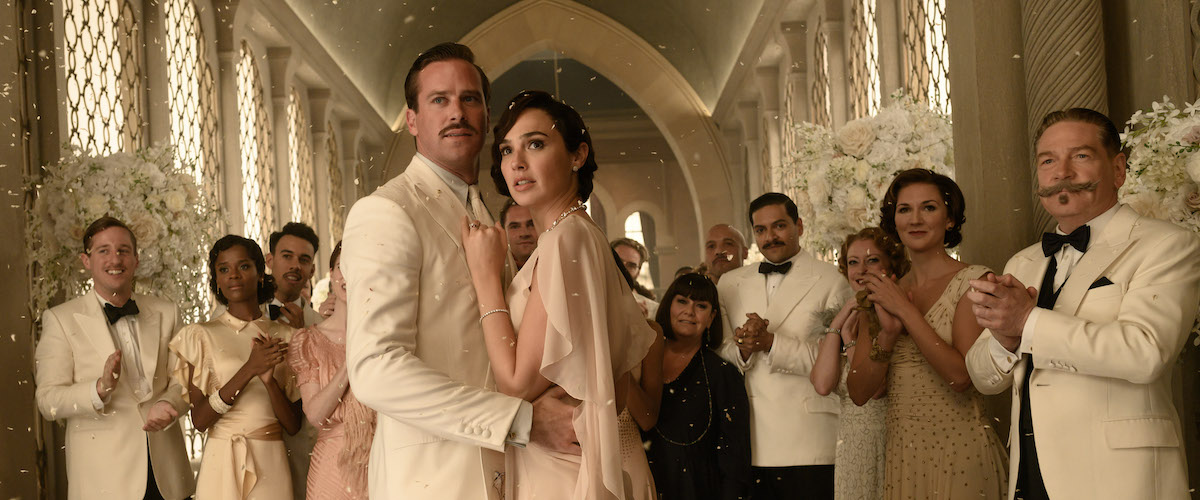
Real Agatha Christie fans will probably like this film. It is rich in its production and sumptuous in its settings. Art deco details abound, along with stylish period touches. But Agatha Christie keeps the viewer on the outside for a very long time, and all is made finally clear only at the end; and until then there is an awful lot of suspicion and indignation and Belgian quizzicality; but two hours is a long time to wait for the answers.
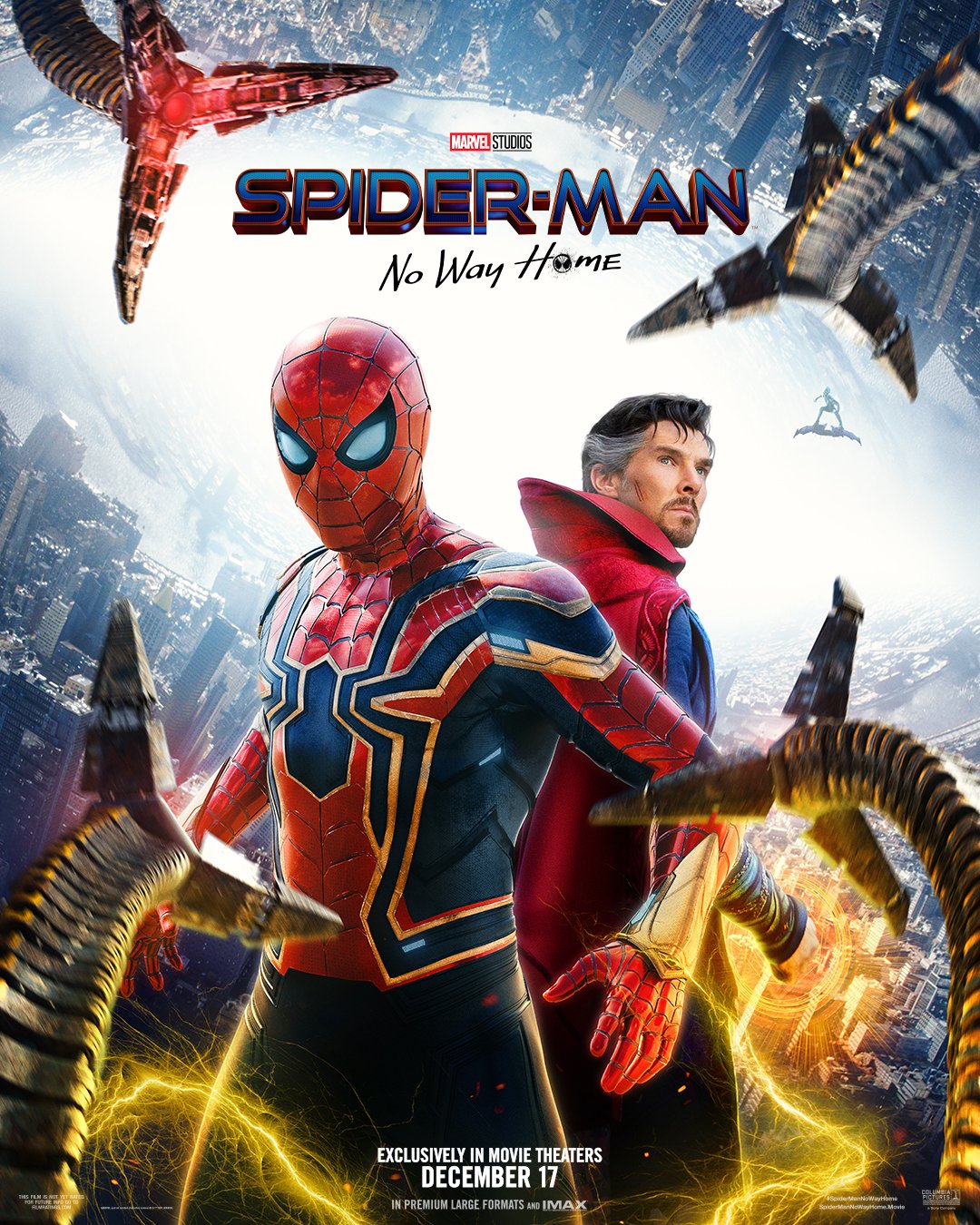
'Spiderman: No Way Home' is the most successful post-covid film to date, with revenues already posted at $1.6 billion. It has boosted Cineworld's revenues to 88 per cent of pre-pandemic levels and was the highest grossing film of 2021. It is the 6th highest grossing film of all time, and the third fastest to break the $1 billion barrier. Bearing all this in mind then, is it any good?
It you are twelve to fourteen it might be. This film is produced by Marvel Studios (in co-operation with Columbia Pictures) so really of course it is simply a moving version of a Marvel comic. It's got a lot of special effects, and a bit of early teen romance, but in essence it's a CGI battle between good supermen and bad supermen, just like the comics.
The film starts with a now un-masked Spiderman, whose real name is Peter Parker, having to endure the publicity of having his real identity known. He is going to high school, along with his best friend Ned (played by Jacob Batalon) and his girlfriend MJ (played by Zendaya Coleman).
The world is split between those who think Spiderman (or Peter Parker, as they now know him to be) is a hero, and those who think he is a villain, after he is blamed for the death of Mysterio, who was killed in an earlier episode of this franchise series.
Peter Parker decides to go to see Dr Stephen Strange (played rather woodenly by Benedict Cumberbatch), to ask if Strange can create a spell to make everyone forget who he is, so he can go back to being anonymous.
Naturally the spell goes wrong. Instead of making everyone forget who Peter Parker is, the spell allows various super characters from other universes to enter this world, where of course they will cause untold trouble.
Now the stage is set for a lot of CGI fighting. Spiderman swirls and flies through the air, doing battle with Otto Octavius, an evil genius with mechanical tentacles growing out of his back.
Other supervillains from other universes also appear, including the Lizard, an unpleasant and dangerous amphibian which can speak, and Electro, a demi-human who feeds off electricity, and the shape-shifting Sandman. Yet another villain called the Goblin kills Peter Parker's aunt May. He then releases the other villains, who are now at large on Earth.
Peter Parker's whereabouts are unknown to his friend Ned and his girlfriend MC. Ned discovers he can open portals to other universes, using a ring he has obtained from Dr Strange. But of course Ned doesn't find his friend Peter Parker in these alternative universes, only alternative versions of Spiderman.
Yes, that's right. Alternative versions of Spiderman (played by Tobey Maguire and Andrew Garfield, who both played Spiderman in previous films). Now all three spidermen can come together, and battle the various villains, who they will eventually overcome.
The scene is now set for a lot of CGI fighting, much of it around the Statue of Liberty, but in all this swooping and swirling there is very little to appeal to an adult audience.
This film has been tremendously successful, presumably with early teens. But to an older viewer there is very little here. There are redeeming features: moments of comedy, of touching friendship between the various incarnations of Spiderman, as they discuss the practicalities of re-stocking on web-fluid; and there is also the romance of the current Peter Parker and his girlfriend MJ, always understated.
After a great deal of CGI fighting all is set to rights, although Peter Parker pays a terrible price for it. The final scenes are almost touching, and you can't help feeling the film would have been better if there had been more of this: more romance, more friendship and more – well – human contact and interaction, set against all this flying and smashing and CGI; but this is a product and Hollywood is a business, and if this film can gross 1.6 billion dollars in its current form, what right does anyone have to tell them to change it?
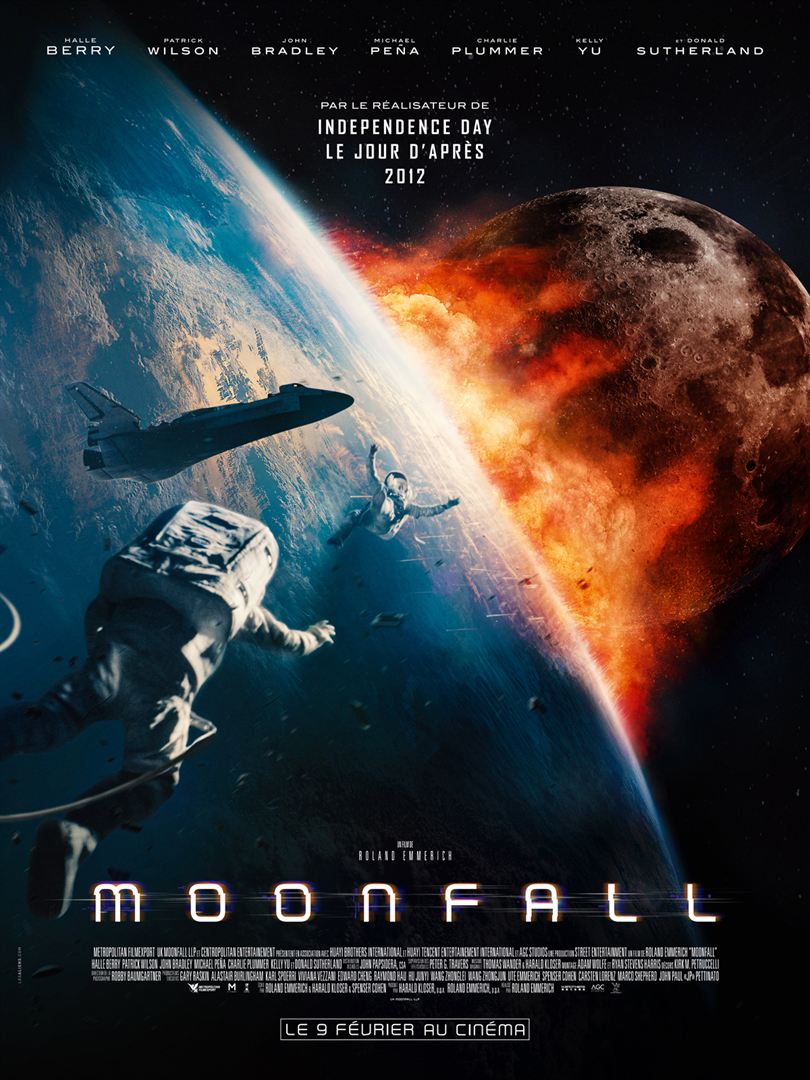
This film is funny, gripping and occasionally hilarious, and holds its dramatic tension to the end. If you want entertainment, action and some wonderful CGI effects, plus a sprinkling of perfectly timed comedy, this is the film for you.
Disaster movies always need a twist. Something bad is coming towards the Earth, and thankfully the Americans are on to it. There is a clean-cut hero, a former astronaut going up for one last job. There's a mixed-race woman running NASA (Halle Berry actually) with a cute little kid. So far so good – so what's the twist?
The twist is a near perfect performance by John Bradley as K C Houseman, a part-time astrophysicist and all-round geek, who works as a janitor. He has also worked out that the Moon is going to leave its orbit and collide with the Earth – unless something is done about it.
Naturally everyone thinks he's just nuts. He is nuts in a way, but in his very British geekiness he makes this film work. John Bradley is the perfect counterpoint to Patrick Wilson's all-American performance as Brian Harper, the former Astronaut going up one last time.
Going up one last time? Of course he is, on a hastily arranged mission. But what will he find, when he arrives up there, on a Moon homing in on Earth?
Naturally Halle Berry as 'Jo' Fowler, head of NASA, and the geeky John Bradley end up going too. But they do so with such panache and wit that you can forgive the myriad technical impossibilities and absurdities. What does it matter if one of the Space Shuttle's engines doesn't work? (Yes, the Space Shuttle comes out of retirement.) We'll just go with two rockets and let the Moon's pull do the rest.
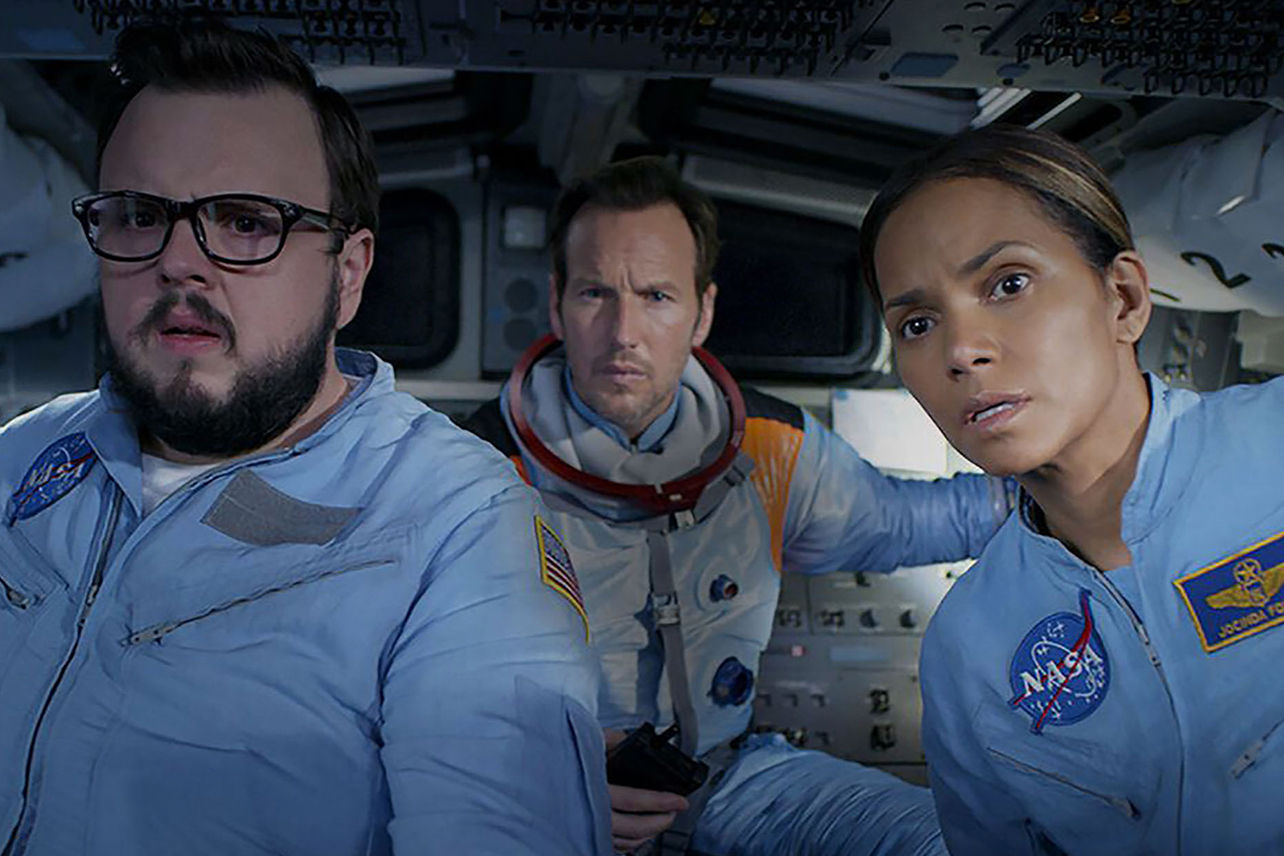
Naturally there are plenty of scenes of destruction here on Earth, as the ever-nearing Moon's gravity causes havoc, with all the mayhem you would expect; but it is in that capsule that the tension holds, as we are taken inside the Moon.
Inside the Moon? That's right. As John Bradley's character always said, the Moon is actually a hollow structure – the only question is who or what is waiting for them in the centre.
This is wonderful stuff. The disembodied sequences, where John Bradley's character and Harper communicate with the Moon's software work perfectly. The gags keep coming, and even Bradley's cat (called Fuzz Aldrin) makes an appearance.
Of course, this film can never rival the original Independence Day. But it has enough in it to be worth any cinema goer's money. Go and watch and enjoy, and wait for the laughs. Thanks to John Bradley they come regularly and often, and are perfectly timed.

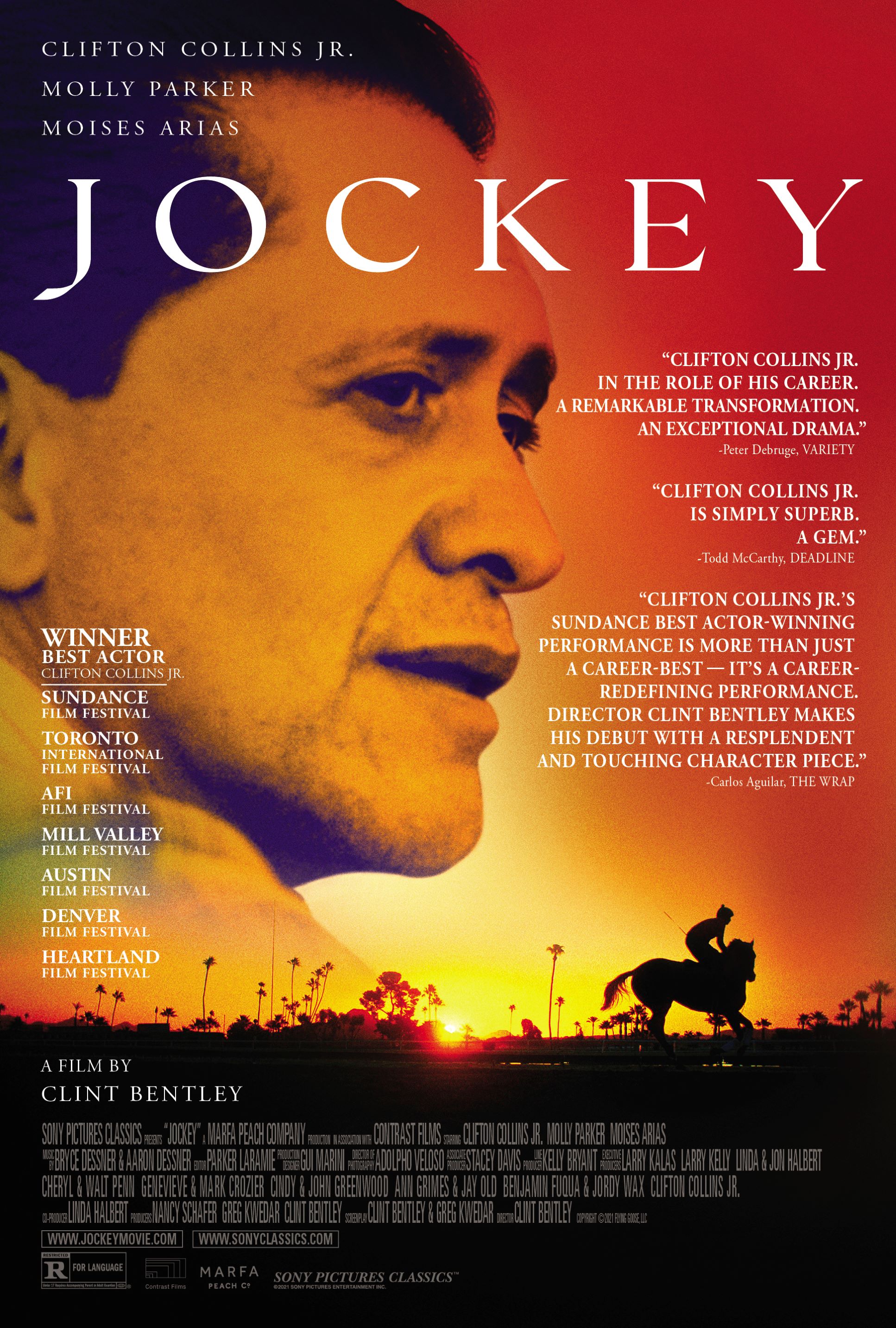
This film takes us on a journey into the little known world of professional horse-racing; but it is not a particularly interesting or impressive ride.
This film is not without its merits. There is the stunning scenery of Phoenix in the background: those mountains and the palm trees. There is the thunder of hooves and the grit and sweat of the changing rooms, so far removed from the glamour of the public viewing areas.
But ultimately this film fails to thrill. It walks rather than canters, and it never gallops. It feels slow and laboured, as though we are on a carthorse rather than a thoroughbred.
The plot is essentially simple. A fading champion jockey finds himself tested by a newcomer, a trainee jockey who shows great promise. The newcomer then drops a bombshell: that he is in fact the older man's son. Obviously this is a shattering surprise, as the older man knew nothing of all this - yet now he must deal with the fact that not only does he have a child, but that the young man intends to follow and emulate his father, by becoming a champion jockey himself.
The older man (Jackson Silva, played by Clifton Collins Jnr) finds great difficulty in accepting all this. However he eventually forms a relationship with the younger man, and even ends up giving him master classes in race horse riding, as they slowly start to bond.
In the meantime it is obvious Silva is on the wane. He has developed a tremor, and his ever watchful trainer Ruth (played by Molly Parker) can see something is amiss. It comes as no surprise therefore that she begins to favour the younger man.
But now it turns out that actually the young man (Gabriel, played by Moises Arias) is not in fact the son of Jackson Silva after all. Why then did he say he was, if he wasn't? Silva swiftly confirms all this by talking to his former wife, the birth mother of Gabriel.
Now there is little left in this film. The final race sees Silva and Gabriel pitted against each other – and there can only be one winner. But there is a sense of emptiness here, of a plot only half-developed. What was the relationship between Jackson Silva and Ruth, the trainer? There are hints of a romance, but only hints. Why employ the device of a father and son re-united, if they are not in fact related? Why bother to build this castle – only to let it fall down again?
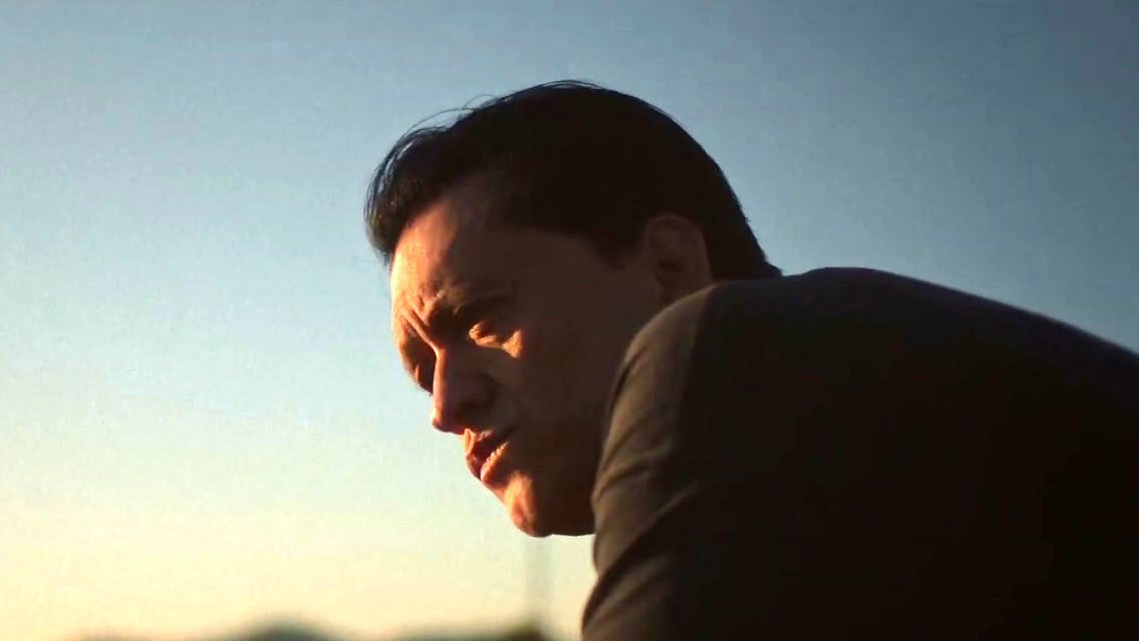
Somewhere in all this was a much better film. Professional horse racing lends itself to drama, intensity and excitement. It offers the possibility of something riveting and profound; yet here for far too long we are looking at long lingering shots of Jackson Silva in profile, as he mouths some piece of homespun yarn against the dying embers of yet another day. His drawl irritates and you yearn for him – like the film in general – to get a move on, but it never does.
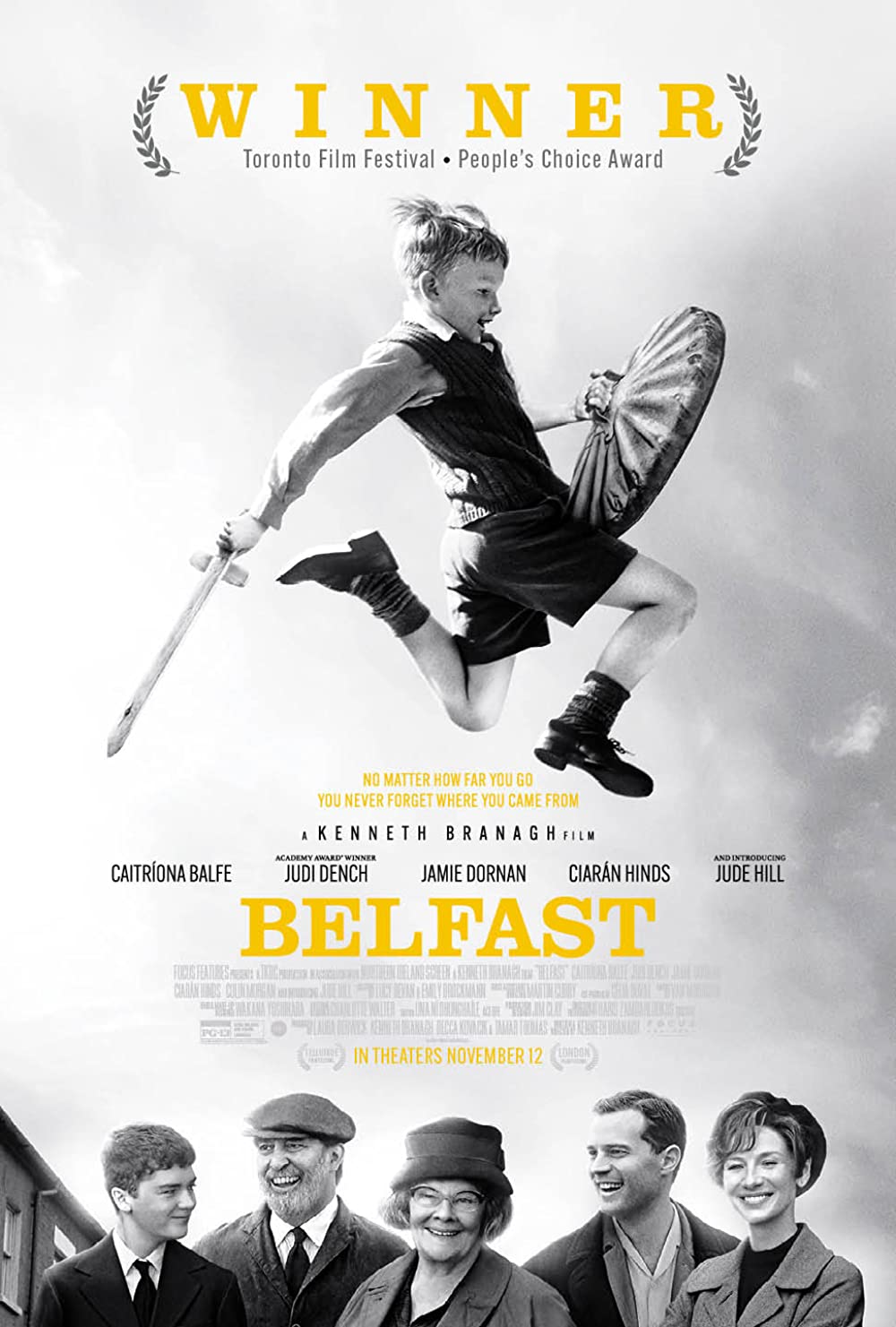
Sometimes a film comes along which is funny, charming, beautiful and profound. 'Belfast' is such a film.
Although set against the ever-worsening situation in Northern Ireland in 1969, this film is really about something else. It is about childhood: those tender distant years which we can hardly remember, and yet which we all went through.
The worsening troubles are seen through the eyes of Buddy, a nine year-old boy (played by Jude Hill) who can't understand while the tranquil side-street his family lives in is being invaded by rioting mobs with petrol bombs. He is too young to understand the back-story to all this, especially as he is friends with the Catholic children in his street.
Giant armoured cars rumble by. Soldiers with English accents appear, and a barricade is erected at the end of his street. Windows are broken, and threats are made, that 'those who are not with us are against us'.
Meanwhile Buddy's father keeps disappearing, going to work on the mainland. Buddy fills in his hours with his grandma (played by Judi Dench with a rather unfortunate accent), and his grandfather, played by Ciaran Hinds. Here Buddy finds contentment, amid the cosy backyards, so tiny they hardly have room to swing a cat.
Despite the cheek-by-jowl conditions, with everyone living in identical terraced houses, Buddy loves it here. Everyone knows everyone else, Protestant or Catholic. Neighbours pause to talk, not hurry past each other; and as you watch the film you sense the tremendous pull of this place, this giant family and support network, where there are no secrets.
But this world is also vanishing. In between Thunderbirds on the old black-and-white TVs which you had to tune yourself, every time you changed channel, and the John Wayne films, and the Roy of the Rovers football annuals, that way of life was falling apart, with the rise of sectarianism.
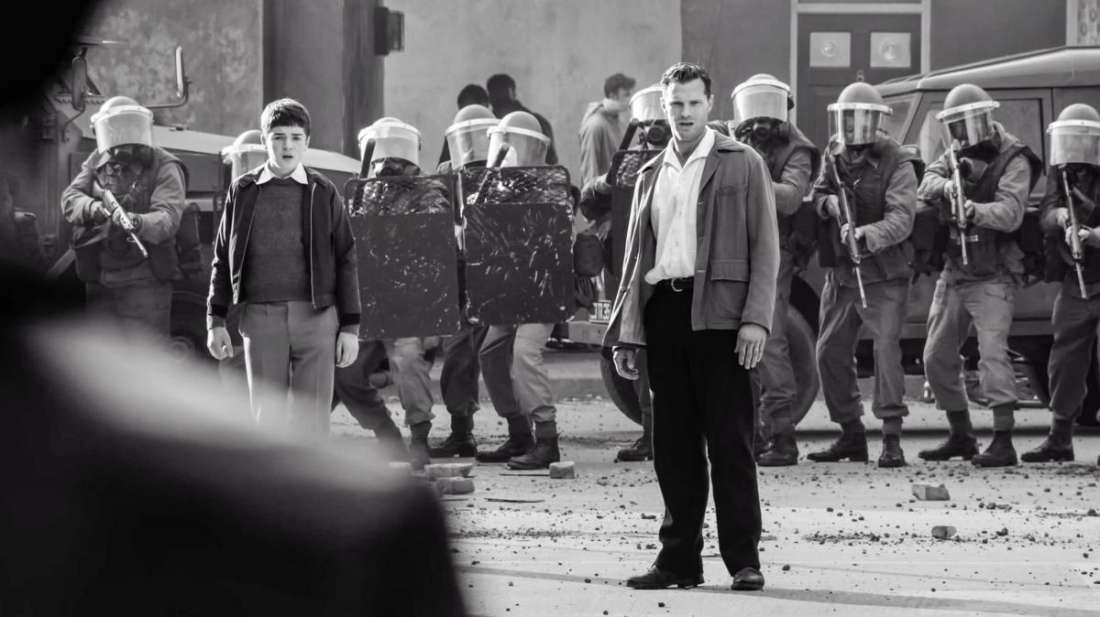
Buddy's father pleads with his impossibly attractive wife (played by Caitriona Balfe) to leave, before he has to choose whether to join the Protestant vigilantes or face ostracism. 'You are either with us or against us', he is warned. The family decide to leave, and the young Buddy is torn away for ever, from his native Belfast.
This film is based on Kenneth Branagh's own life experience, and his own early years in Belfast. He has produced a wonderful evocation, an ode to his own childhood, beautifully rendered. There are endless period touches – the matchbox cars and the mini-skirts and the football annuals; and there will be many on this side of the water who remember similar things. Kenneth Branagh has reminded us that childhood is special, that a deep wonderment exists when you are young; and he has made the world see Belfast through his own eyes, and for that we must be grateful.
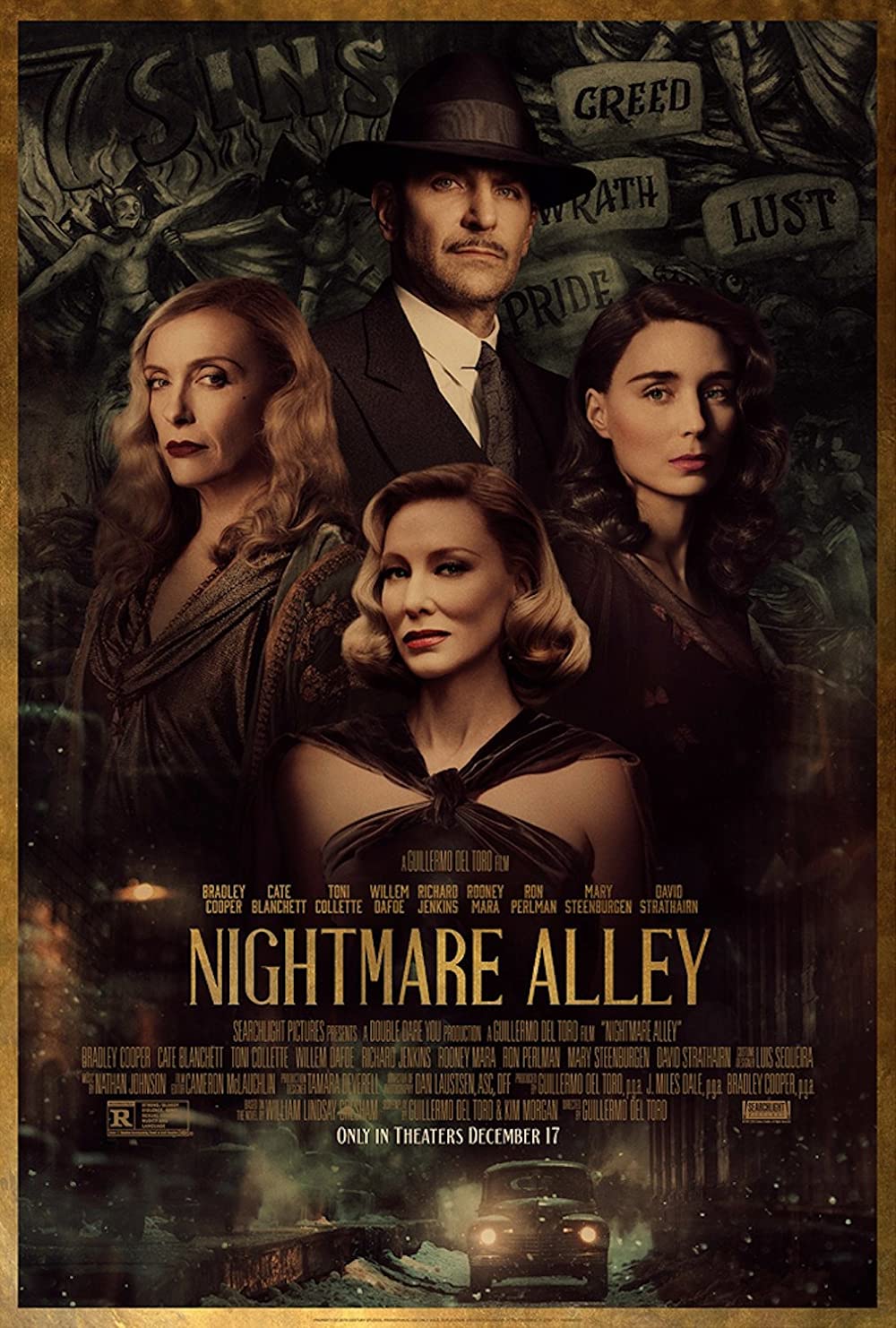
This film is a brilliant two-and-a-half hour romp through the seedy world of 1930s carnival America. It is loaded with period details, in a slightly noir-ish tale which ends in disaster. It is compulsive and gripping, but it isn't for the faint-hearted.
The is essentially a tale of hubris, of the rise and inevitable fall of one man, who goes too far in his pursuit of wealth. Blinded by his own success, he carries on and on, until eventually he is undone. It's a tale which will have you on the edge of your seat, and keep you there until practically the end.
The story begins with a man of few words, who arrives at a carnival fair looking for work. All that we know is that he burned down the house he used to live in – but we don't know why.
Here amongst the freak-shows and the clairvoyants and the jugglers and contortionists and all the other freakish and mawkish shows of this sleezy circus, Stan discovers he has a special gift. Stan (played by Bradley Cooper) learns and perfects the art of mentalism, the apparent ability to delve into the minds of others, and call forth details which only that person would have known.
Really of course it is all nonsense. Stan is using cues, or details about a person gleaned from their clothes, their shoes, their jewellery and their demeanour. He works with an assistant, and between the two of them they can 'unlock' secrets only known to the subject.
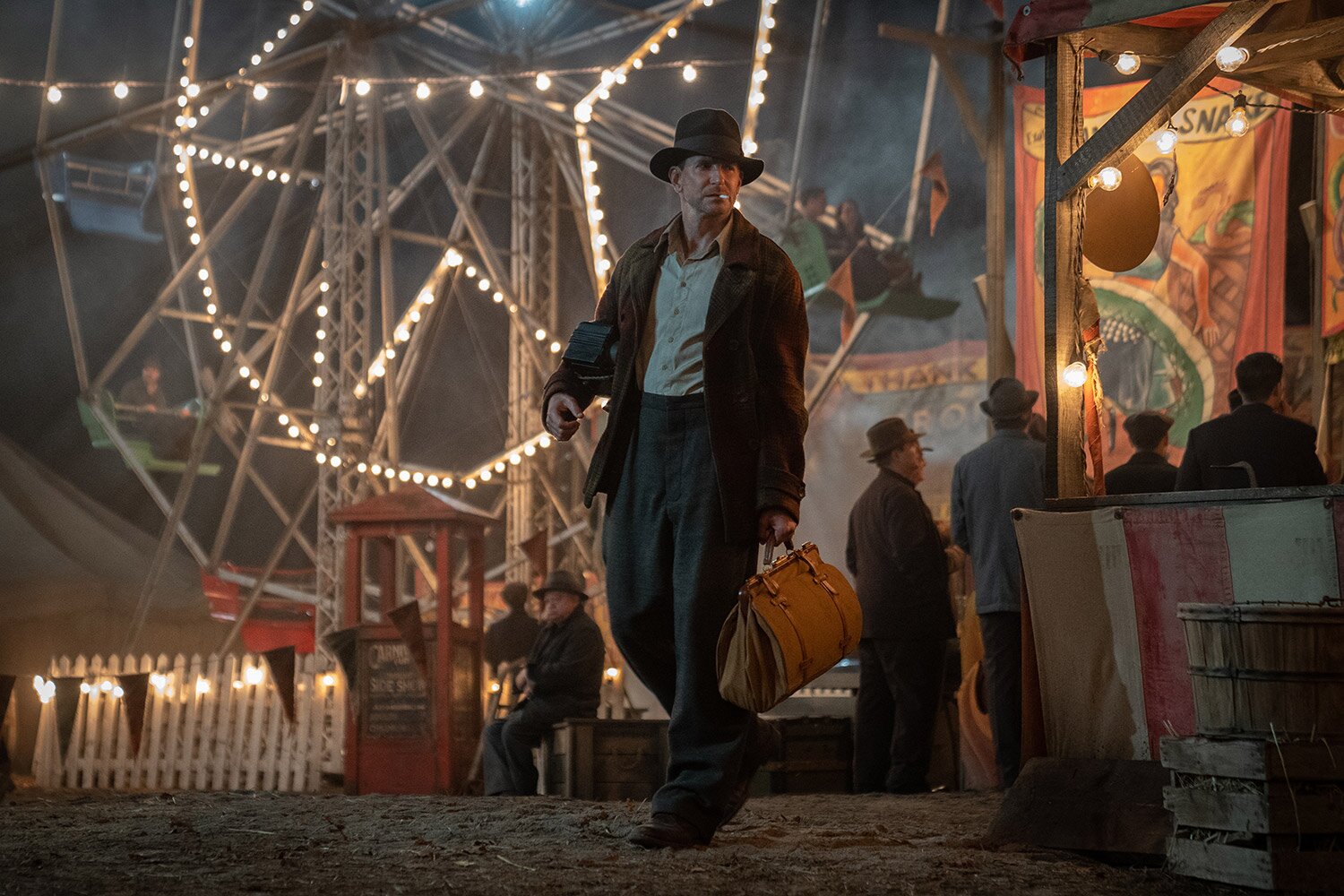
It's a clever act. Stan realises he has a natural gift for this foolery. But there are hints of a deeper truth, that if you delve too deeply, you may begin to believe you really can see things in other people.
Stan leaves the circus with a pretty young woman he has met there. Her name is Molly, played by Rooney Mara. Together they begin a successful tour of New York, where Stan's powers of mentalism are performed live to invited audiences, and are rapturously received.
Now Stan and Molly are at their peak. They have money, success and are far from the sleezy world of the carnival fair. It is here that Stan meets Lilith Ritter (played by Kate Blanchet) who is a successful psychologist and therapist, who will be his nemesis.
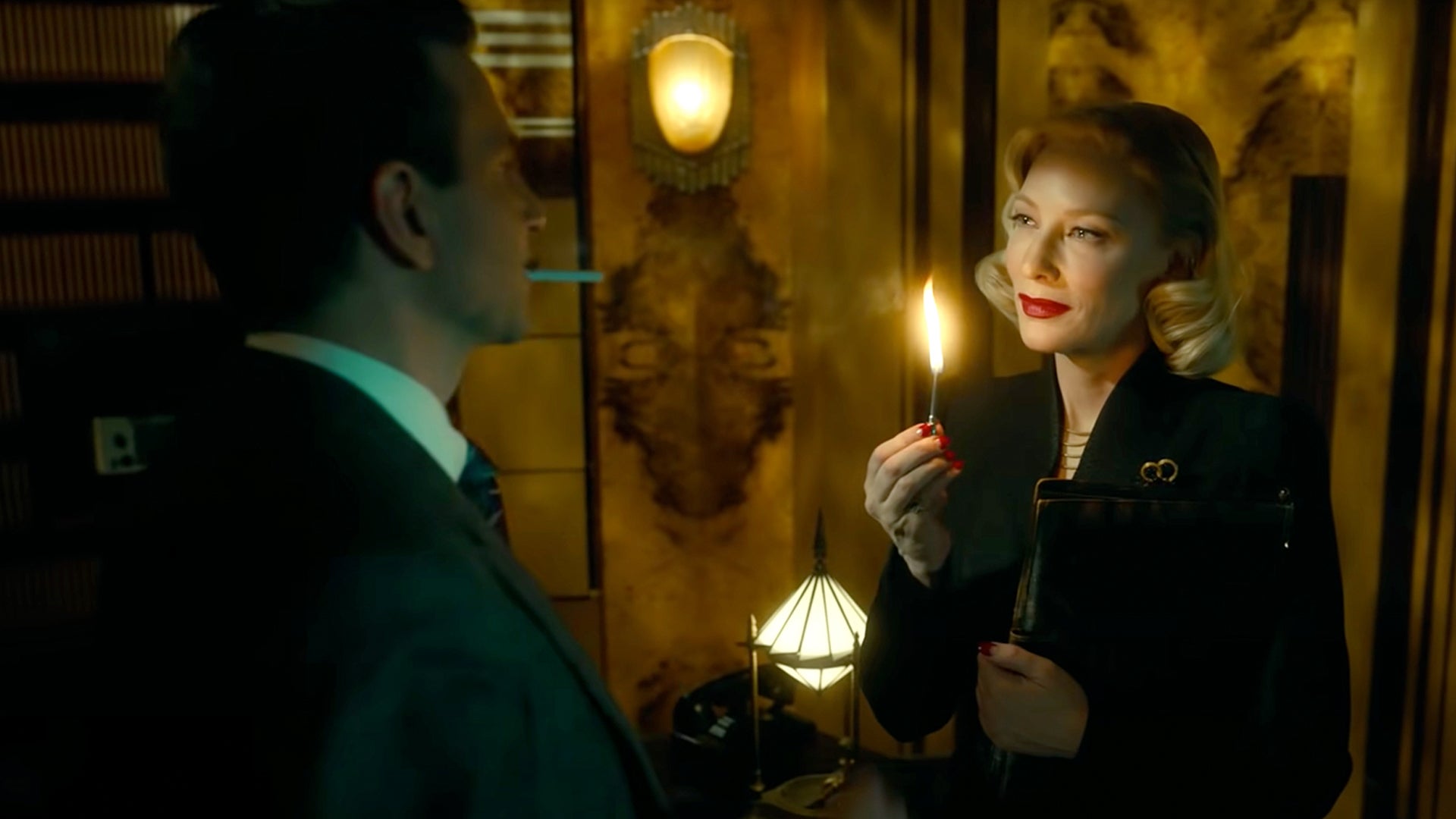
'We're both frauds, you and me,' says Stan. She doesn't disagree. Amid the sumptuous art-deco interiors of her office, she agrees to give him the inside dope on her clients, which he can then use in his readings.
Such a relationship can only end one way. Sooner or later he will try his readings on someone too cynical or two dangerous to be hoodwinked – and so it turns out. Greed conquers all in this dark and compelling tale. If you love to be entertained against a brilliantly imagined backdrop of the dark side of 1930s America, this film is for you. If you love a sense of time and place perfectly rendered, step this way ladies and gentlemen, for a wild and wonderful ride on the dark side.

This film is tender, touching and sometimes moving, yet ultimately it doesn't feel quite right.
This is nothing to do with the elegant interiors, the charmingly shot outside sequences, or even the tasteful sex scenes.
Neither is it anything to do with Penelope Cruz's acting, which is first class, or even the other members of the cast. Where this film falls down is that the plot doesn't quite work.
It's a pity really. Penelope Cruz is much better acting in Spanish than in English (although you do of course have to read the subtitles). But she feels unencumbered, liberated from speaking in a language which is not her own, as she reverts to her native tongue.

The result is often completely convincing. At no point do we get tired of Ms Cruz; for she holds the camera perfectly, in the many close-ups. She is utterly perfect in her craft, portraying her character, so how did it all go so wrong?
It is actually the case that a small proportion of babies born to their mothers do not have their husbands' DNA (but that is another story). But for two babies to be mixed up in hospital is rare indeed; for there are systems to prevent this, at least in developed countries like Spain. But even if there were two babies which got mixed up shortly after birth in hospital, what would be the chances that one would die in a cot death, some months later?
And then, what would the chances be that the two mothers would meet again, and the elder one (played by Penelope Cruz) would invite the younger (who had by now lost her young child) to be her house-keeper and nanny, half-suspecting that the younger woman was indeed the mother, and confirming it with a surreptitious DNA test?
What then? By now Penelope Cruz has put in a convincing performance, has touched us with the quality of her acting and the believability of her portrayal; surely the film can't go wrong now can it?
Yet it does. So many opportunities presented themselves, to complete this film. So many interesting dramatic paths; yet Penelope Cruz' s character Janis simply blurts out the truth, and things roll downhill.
The plot now wanders off in a new direction. Janis, played by Penelope Cruz had a great grandfather who was murdered by the Falangists in the Spanish Civil War, and an archaeological dig is arranged, to try to discover his final resting place, along with his comrades.
This may be worthy, profound in its own right, but it doesn't sit well with the rest of the film. The true mother of Janis's baby now fades into the background, as a mere walk-on part, as old mysteries and last resting places are finally cleared up; but by now all dramatic tension has been lost. That is a great pity, considering the great work Penelope Cruz and the rest of the cast had done earlier, to create something genuinely worth watching.
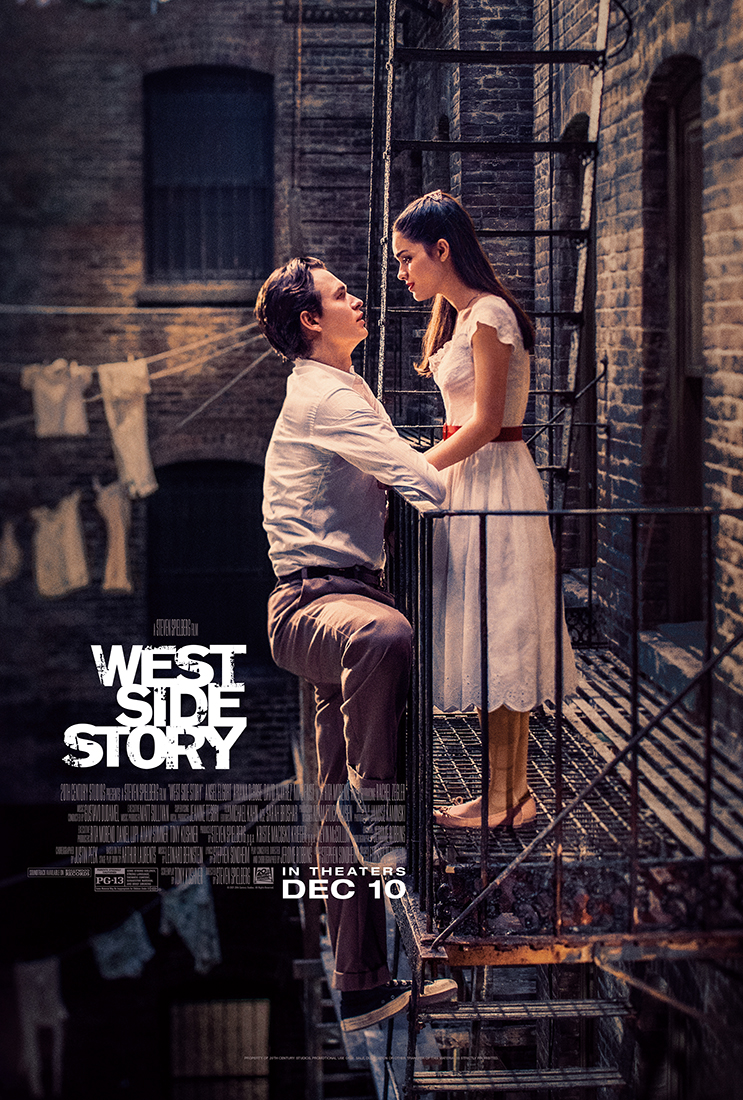
From the first few seconds of this film, you know you are in the presence of musical royalty. Leonard Bernstein may no longer be with us, but his music will live for ever.
As you sit watching those opening titles, you realise (as if you could ever forget it) that the music you will hear is not simply background guff, churned out to help the script along; oh no. The music is the film. The music is a work of genius, and it's all for you.
As the opening proper starts, we are treated to the muscular choreography of the Jets, a group of American young men who resent the arrival of so many Puerto Ricans, and who are going to graffiti the local Puerto Rican flags, painted on local buildings.
It all starts so well, as indeed it should do with that Bernstein-composed prologue which is the auditory equivalent of a slap-up meal at the Ritz; how then can it have gone so wrong, and ended up as merely good when it promised to be brilliant?
There are a number of reasons for this. One is the casting. Tony – the white American – who falls in love with Maria, the Puerto Rican girl doesn't seem quite right. Ansel Elgort is an odd choice for this crucial role. He sems too thin, too sallow in the face, lacking in presence. How could he be Romeo to Rachel Zegler's Juliet?
And speaking of Rachel Zegler, was she quite right? Obviously they come from different backgrounds in the film, but they seem an unlikely couple.
Fortunately we are luckier with the convincing Bernardo (played by David Alvarez) who plays the hot-headed young Puerto Rican fighter, who throws his weight about a lot more convincingly, and who of course is ultimately killed.
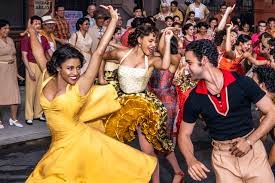
There are plenty of other good supporting actors, including Ariana De Bose, who plays Bernardo's girlfriend, and Michael Faist who plays Riff, who also gets killed.
After that high-speed start things slow down quite a lot. The first meeting between Tony and Maria seems slow, laboured almost. The equivalent of the balcony scene, where Tony climbs the fire escape to finds his Juliet is done without that vital ingredient – comedy. There is no real chemistry here, and it feels like love-by-numbers.
Then there is all that Spanish. Maybe in the USA you can get away with putting significant parts of the script into that language without subtitles, but to British viewers it just feels disjointed.
Another problem is the difficulty in transposing a production designed for the theatre onto the big screen. In a theatre, it is possible for two people to declare their love, singing into each other's faces, but on a large screen it feels unnatural, especially with Ansel Elgort. The film feels painful at some points, as though Steven Spielberg is trying to push water uphill, sticking too closely to the original script. But these moments pass.
As the film moves on the pace picks up again. Once the agreement is made, for a rumble between the two gangs, the film becomes compelling once more. There is an awful inevitability about what is to come, but you are carried along with it.
Only Romeo dies in this particular version of that lovers' story. But by then the tension has dissipated again, but it doesn't matter. For there is enough in this film to make it watchable. There are faultless sets, as one might expect from Steven Spielberg. There are spinning knee-length skirts and high kicks. There is muscular choreography, but above all there is the fabulous music by Leonard Bernstein; and for all that we must be truly grateful.
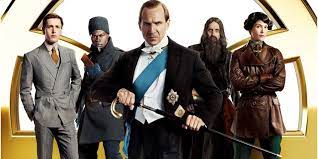
This prequel takes us a step back, to the formation of the Kingsman organisation. It takes us on a romp through the great events of the First World War, but somewhere along the way it feels oddly unedifying, despite a stirring soundtrack and a host of swordfights and capers.
Perhaps that’s the problem: that there are too many swordfights and capers. There are crashing aeroplanes, fights in no-man’s land in the First World War, sinking ships and bristling moustaches. There are appearances by the Tsar of Russia and Rasputin, and the Kaiser of Germany, and of course George V, but somewhere along the way there’s something lacking.
Was it the comedy and wit of the first two Kingsman films, The Service and The Golden Circle? Was it the absence of Colin Firth and Taron Egerton, without which any further Kingsman films were bound to feel incomplete? There are none of the boyz-in-the-hood accents of the earlier films, or the James bond-esque gags.
Instead we get a romp through the First World War; we see Kitchener bumped off (he was a friend of Ralph Fiennes’ character Orlando, the Duke of Oxford).
We see that actually the embryonic Kingsman organisation was there all along, in the background, protecting the interests of peace (and British interests as well of course).
The Kaiser is a moustachioed twit. The Tsar of Russia is a weakling, dominated by Rasputin (he gets dealt with by Orlando of course). But behind all this a shadowy organisation, attempting to destroy Britain.
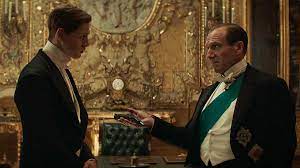
Naturally it is only a matter of time before Orlando has his great show-down with the leader of this organisation, who keeps a certain variety of mountain goat for its wool. Orlando’s son dies, in a homage to all those who lost their sons in the First World War. But in all this romping, in the overly long and excessively stylised sword fights, there is not really enough for a truly interesting film, or a worthy successor to the first two Kingsman films.
The sad fact is, this film proves that smart tailoring and stately homes and a finely honed English accent will only take you so far. For the rest you need a decent story and a decent script, and the wit and the chutzpah to carry it off; but this film does not quite have enough in it for that to happen.
You can’t fault Ralph Fiennes though. He really does his best with what he’s got. But it would take even more than this great English actor – currently enjoying a glorious autumn to his career – to make this Kingsman offering really fly.
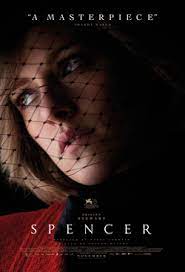
American actress Kirsten Stewart is apparently being touted for an Oscar for her part in this little effort – and you can see why. She is grimly – sometimes hilariously – compelling; but this film has very little else going for it.
Take for example the ridiculous narrative devices littering this film: the scarecrow still in the same field it was in decades earlier when a young Diana played on the Sandringham estate; or the wooden senior members of the Royal Family; or the metronomically walking serving staff, so slow and deliberate in their actions they might have been cyborgs on a reduced power setting.
There is no real narrative here, no telling of a tale, no development of a story; simply a series of tortured episodes in which we watch Diana wistfully and with anguish endure yet more royal protocol at dinners.
Poor old Diana. If she really had acted as oddly as she does in this film, it was a miracle she was never sectioned, as she eats her own pearls, before spewing them all up in the bathroom.
Does it mean this film is not worth watching? Not at all. It is by turns riveting and then hilarious, though of course hilarity wasn’t what Chilean director Pablo Larrain had in mind. But then what did he have in mind, with his jazz-inspired score, adding to the demons in Diana’s head? Presumably he wanted us to go on a tour, a journey to the heart of the claustrophobic suffering Diana went through, forced to endure Christmas at the house of a family she could no longer stand.
But in fact Pablo Larrain has produced a highly amusing comedy, full of cliches, of wooden hide-bound functionaries, of chefs with profound insights, and even a personal assistant with a lesbian crush on Diana.
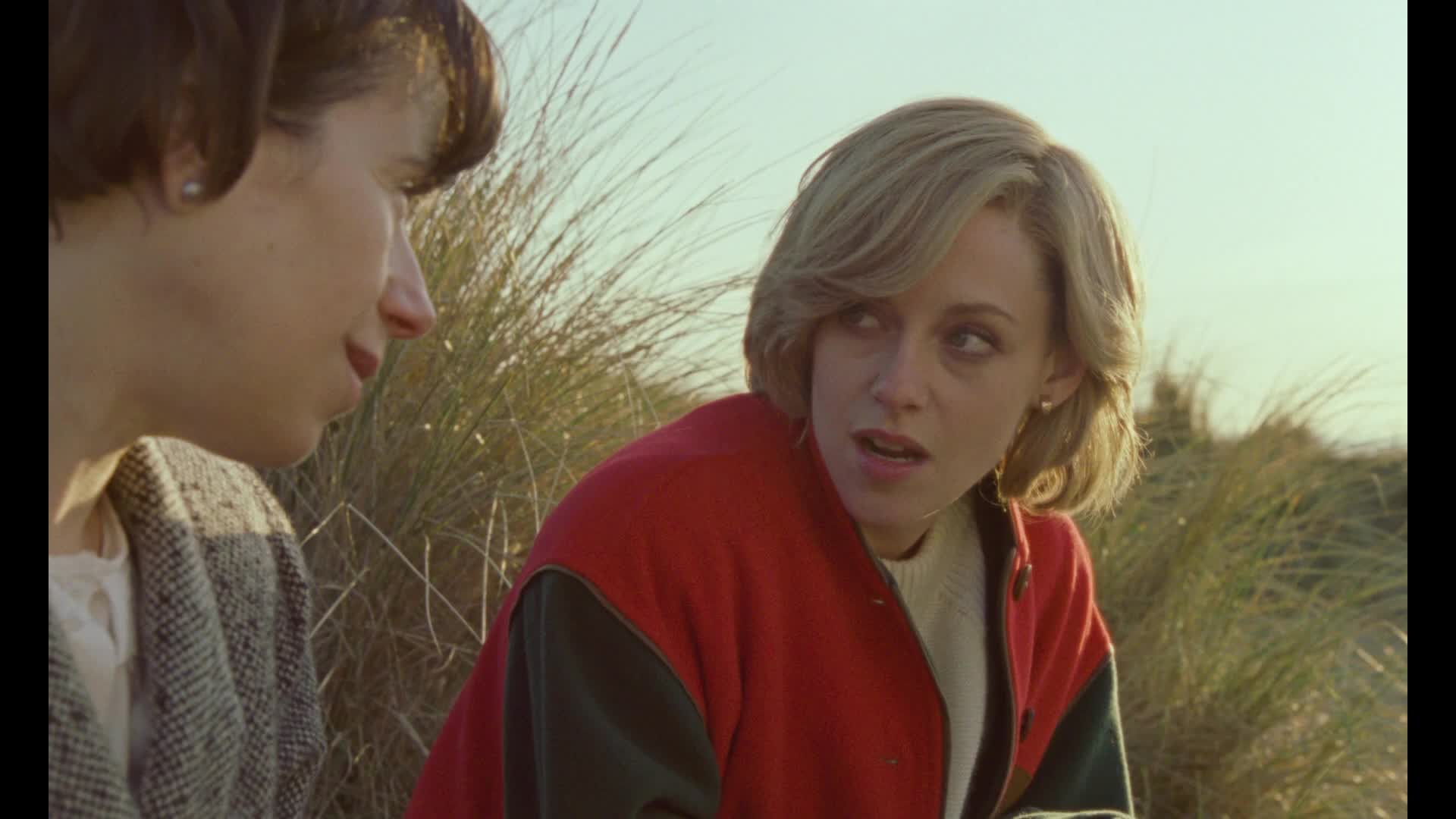
Yes, you did read that right: a lesbian crush on Diana. By then I thought a pink spaceship might hover into view, discourging little green men.
Then of course there was Ann Boleyn. Yes, the one who had her head cut off by Henry the Eighth. Well there had to be didn’t there? After all, they were both female.
But long before Ann Boleyn had appeared I realised this film could have little relevance to reality. Diana, by all accounts had a sense of humour and occasion that got her though many a tight spot; and the Queen let her call her ‘Mama’, not ‘Your Majesty’ as the film reports.
And neither were other members of the Royal Family quite the ogres they were made out to be – but hey! Why let reality get in the way?
The mistakes continue to come thick and fast, such as Diana getting lost in a Porsche trying to find the Sandringham estate, something which was very unlikely to have happened, given that she never had a Porsche, but she did grow up on the estate, and knew very well how to get to it.
The subtitle of the film is: ‘A fable from a true tragedy’. It would have been better to have had a disclaimer instead: ‘This film is entirely fiction. The characters within it bear no relation to any person, either living or dead.’
Does that mean you shouldn’t spend your ten pounds going to see this film? Not at all, for Kirsten Stewart somehow carries this film along. Her performance is compelling, and if along the way you find yourself silently laughing and shaking your head, then the film has worked, for it has made a night at the cinema worthwhile, and given you (albeit unintentionally) some uproarious entertainment.
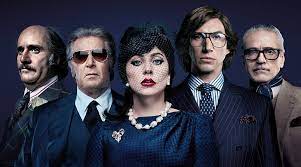
This is a sumptuous romp through the lives of the Gucci family as they fight, break up and try to by buy each other out. Few things go better on film than a powerful Italian family at war with itself, and this one is no exception.
This film really does have it all. The domineering, sneering patriarchs, the errant young heir to the throne, in love with the wrong kind of woman. There are dysfunctional sons, greedy manipulative women, raging rows and lost opportunities. There is even a fortune-teller (played by Salma Hayek) and when the spells don’t work more traditional methods of getting even are employed.
All this is set amongst the backdrop of sixties and seventies Italy. We see perfect period touches – the Vespa scooters, the Fiat Cinquecentos in the background, amidst the Renaissance architecture. We see flocked wallpaper and those overblown Rococo plastered interiors Italian designers seem to love so much. We see excess, glitzy over-priced fashion everywhere, and sumptuous villas set amongst Romanesque gardens. We see long-wheelbased limousines and hovering security men, all so discreetly guarding the gates of the Gucci dynasty.
Striding through all this is a young woman called Patrizia Reggiani, played by Lady Gaga, who quickly latches on to the unsuspecting Maurizio Gucci, heir to the Gucci fortune. The poor man doesn’t know what’s hit him, as this clever and manipulative woman gradually steers him in the direction of taking over his father’s company.
His father is played by Jeremy Irons. Ah, yes, it had to be. Jeremy Irons is on top form as Rodolfo Gucci, dying but still great, the co-founder of the Gucci empire. He casts his pearls of wisdom in between coughing fits, no doubt brought on by all those cigarettes.
It is Rodolfo’s brother (and Maurizio’s uncle) who really brings Maurizio into the business. Maurizio’s uncle is played by Al Pacino, in yet another perfect piece of casting.
And all the while Patrizia is flirting and scheming, never letting go of her man. She is the ultimate cunning vixen, and Lady Gaga plays her to perfection. She somehow captures that particularly Italian look and feel and intonation, with perfect poise. She really does play the queen bitch, and her gradual descent into a bitter divorcee who arranges for the murder of her former husband is wonderful to watch.
This film is quite long, at 157 minutes, but the time never drags. The breath-taking sense of entitlement, the stunning backdrops and the plush interiors just keep on coming. Even the opera music in the background seems just right, as we move between yet more villas and five-star hotels. The fact is that we know Maurizio is going to get fried (this is after all a film about an Italian family) but it doesn’t seem to matter, as we are all seduced by the sets, the glitzy over-priced and over-dressed world of high fashion, but perhaps most of all perhaps by Lady Gaga’s majestic performance.

Reggie Yates has now added a feature film to his growing list of accomplishments. Yes – that Reggie Yates, who has produced numerous high quality documentaries from around the world, presented the BRIT awards, and been an actor and a model.
Not bad for an Afro-Caribbean man from the wrong side of the tracks, who knows only too much about gangsta culture, both from his own upbringing and his numerous documentaries. But occasionally funny though ‘Pirates’ might be, he still has a lot to learn about making a good film.
The main problem with ‘Pirates’ is that it simply doesn’t have enough of a narrative arc. There are amusing cameos and mini-scenes that will have you laughing, but you can’t help feeling unsatisfied by the end of the film. This is a coming-of-age tale of three urban black youths on the edge of manhood in North London. They are now legally able to get into nightclubs, and they are desperate to get into – for them – the best of all, the Twice as Nice, on New Year’s Eve.
Their only problem is money – or the lack of it. As one of our three young dudes says: ‘We ain’t got no clothes, no money and no guns. How are we gonner get in?’
The film is a series of comedic episodes, in which the three banter with each other in their own North London patois, that only occasionally makes sense to us on the outside.
There are slightly absurd stereotypical episodes, with an over-the-top clubland big cheese giving them the tickets, in return for giving Two Tonnes (Jordan Peters) a black eye. It’s all a bit silly, a bit overblown, and slightly patronising to the vast majority of black Londoners who don’t wear fake fur and trilbies.
But where this film really falls down is that it simply hasn’t got enough in it. Two Tonne’s relationship with Sophie is never really developed. He only sees her twice, once in the early evening and once right at the end. We needed more; more beef, more weight and more of a story. Just carousing around in a yellow Peugeot 205 hand-dancing to dub music doesn’t quite cut it. The question is, will Reggie learn from this, if he goes on to make any other films?
Actually Reggie Yates still deserves respect for attempting this. Producing a film on a tiny budget with a tinge of grit, set against the backdrop of black urban North London takes some doing, and there are enough characters in this film, like the wonderful Shiloh Coke as the proprietress of a Jamaican fast food store with a machete under her counter to make you feel that your ten pounds was far from wasted; but when all is said and done this film proves that ancient truth - that you can’t beat a good script.
Learn from this one Reggie. Or stick to acting, the BRIT Awards and those documentaries.

Imagine leaping swordsmen, swirling in the air, cutting down their rivals. Imagine plains and marketplaces somewhere on the Indian subcontinent; imagine moustachioed and turbaned clan leaders arguing with each other, and you've more or less got the plot of this film.
There are one or two genuinely epic moments in this film, when it rises above the level of the clattering of swords and the slitting of throats, but in the main this is a violent, boring film with little to commend it.
The film is about an outlaw called Kunjali, who is a bandit leader who is called upon - by dint of his military prowess - to take over the naval forces of the Zamorin, in order to defend southern India from the invading Portuguese. He succeeds of course, in a series of sequences heavily reliant on CGI, as ships sink and turn turtle.
It's quite odd to see the Europeans as the outsiders, especially if you're a European yourself. But they are too much the pantomime villains, in their chocolate soldier uniforms and their stiff manners, so different from the hirsute Indians.
Early on there was a song-and-dance set in which the young Kunjali dances with his bride, which briefly raises hopes of romance, or love or something constructive or interesting. Unfortunately she doesn't last long: barely married before being killed in the sacking of a expedition Kunjali is travelling in.
Actually that song-and-dance routine included some of the most astonishingly obscure translated subtitles I have ever seen, as I gradually realised the two actors on screen were probably just lip-synching.
But the romance was over. From now on we were in for more brutal show-downs, killings and knifings. I have never seen so many throats cut in a film. Only the arguing at the court of the king, between the various noblemen and clan leaders in their moustaches and jewels and turbans proved a break. There was a lot of terminology and references which didn't make much sense to a western viewer, although we all got the general drift. This is a pro-Tamil nationalistic film, with revenge meted out in spades. It lacks subtlety or wit, and by the time the intermission came I was grateful to leave.